

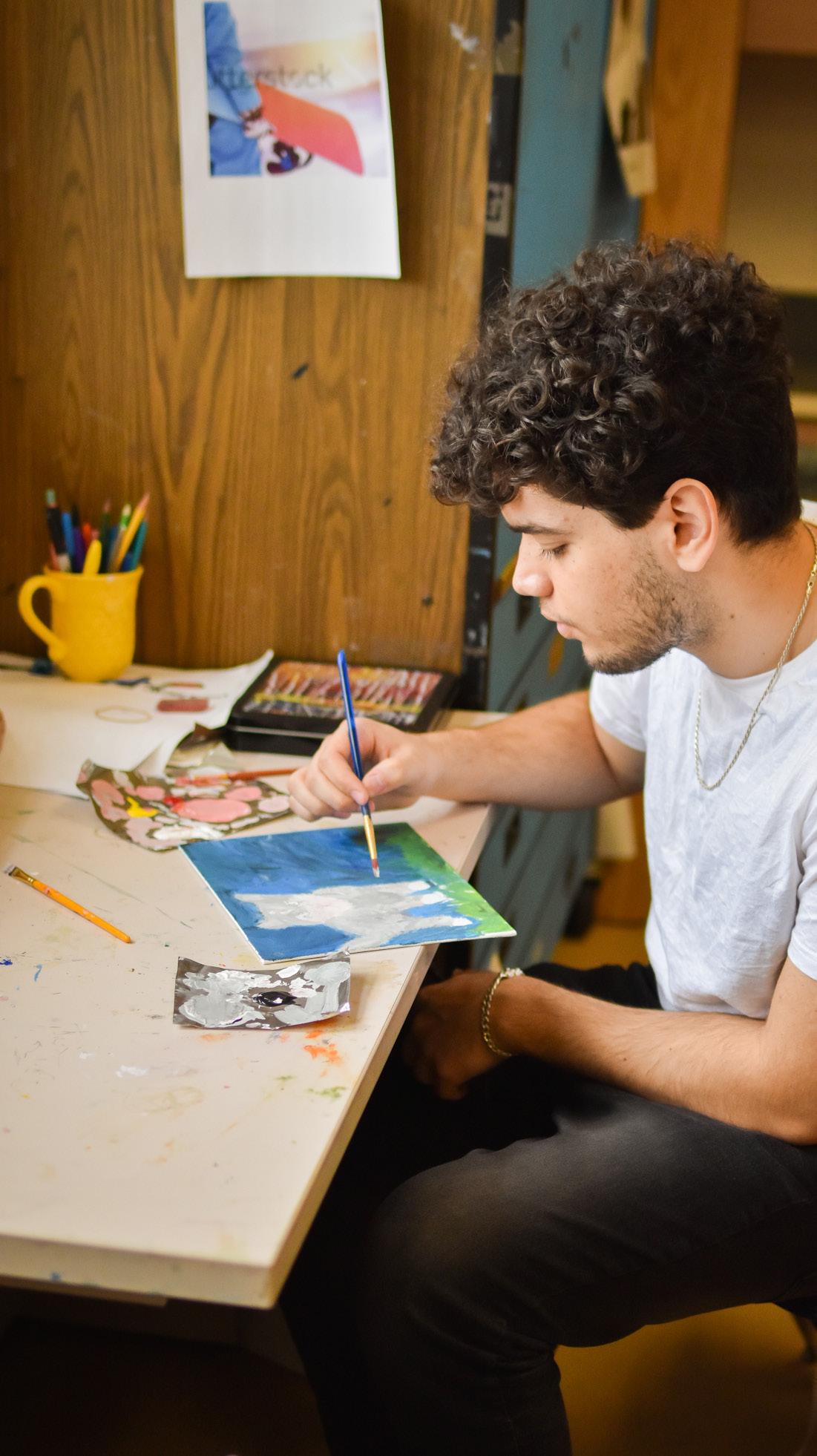

2023-2024
GUIDE
REGISTRATION

TABLE OF CONTENTS Welcome from the Principal ............................................ 4 Meet Your Team ................................................................ 5 Steps and Timelines ......................................................... 6 Credit Requirements ........................................................ 7 4-Year Planning ................................................................ 8 Learning Models .......................................................... 9-10 Career and College .................................................... 11-13 Spanish Immersion ........................................................ 14 English Language Learners ............................................ 15 Course Listings by Subject Area Electives: Art .............................................................................. 16-19 Family and Consumer Sciences .................................... 19 Music .......................................................................... 20-21 Physical Education and Health ................................ 22-25 World Language ........................................................ 26-29 Business & Entrepreneurship Pathway .................... 30-32 Health & Human Services Pathway.......................... 33-39 Technology, Engineering & Design Pathway ................ 40-43 Core Courses: Language Arts ........................................................... 44-48 Mathematics ............................................................. 49-51 Science ...................................................................... 52-55 Social Studies ............................................................ 56-59 Specific Sections: AVID ................................................................................ 60 Credits for Prior Learning .............................................. 61 Course Listing by Hybrid or Online ............................... 62 Athletics and Activities ...................................................... 64-65
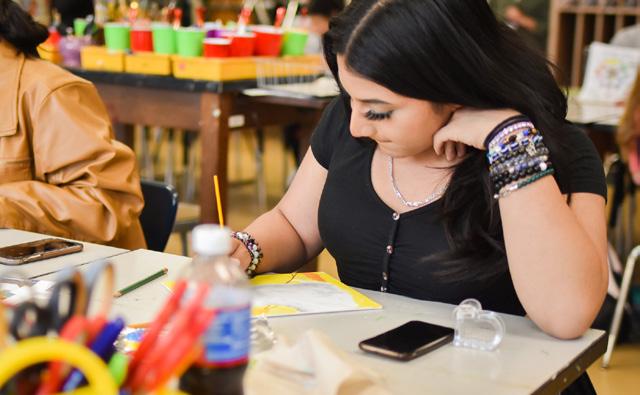
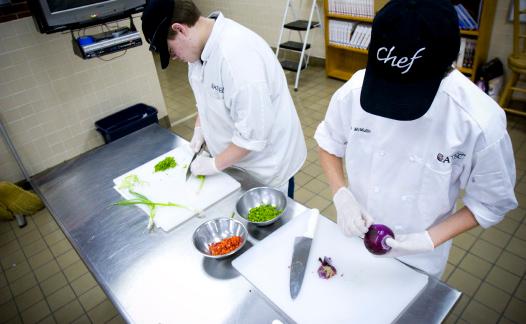
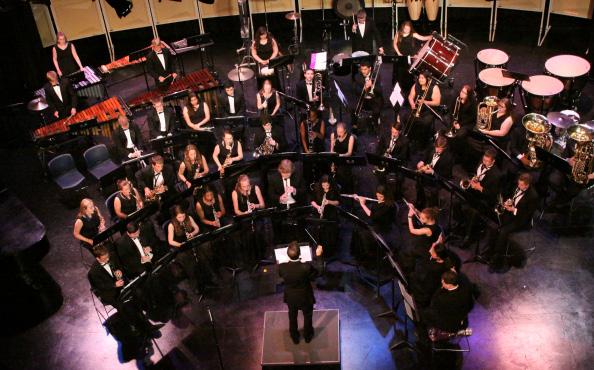
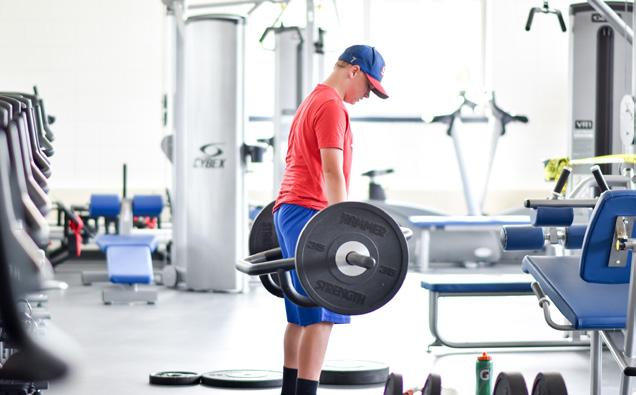
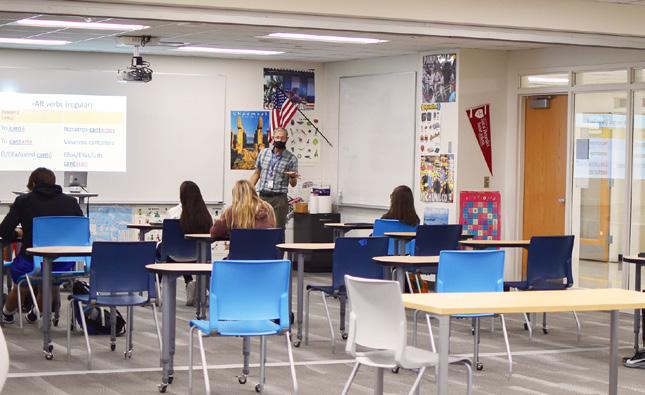
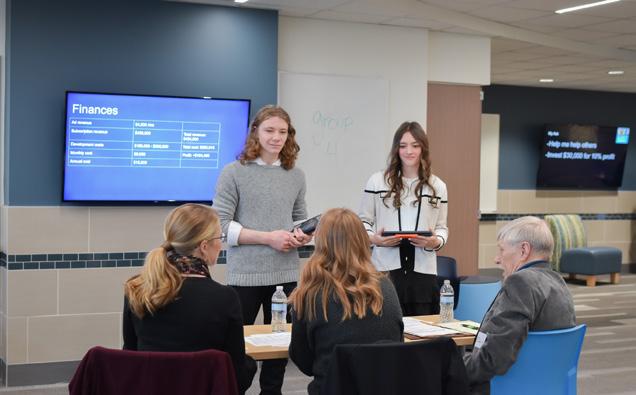
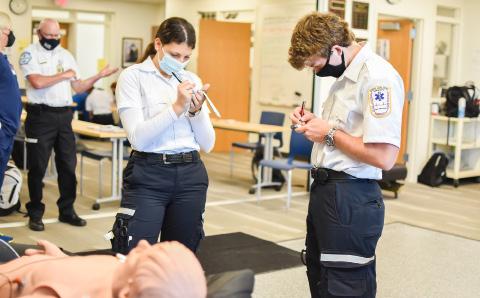
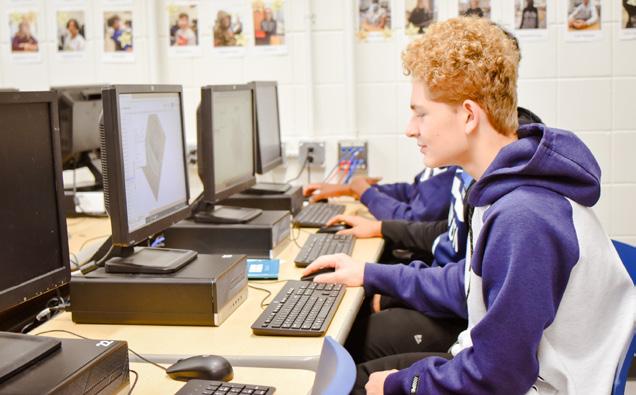
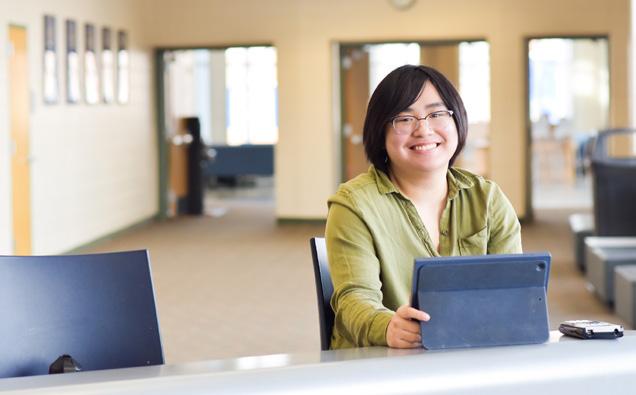
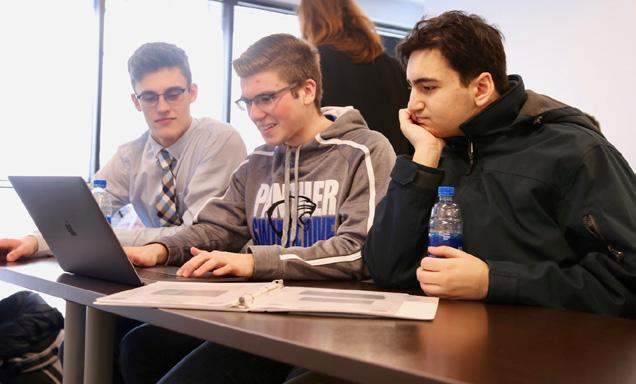
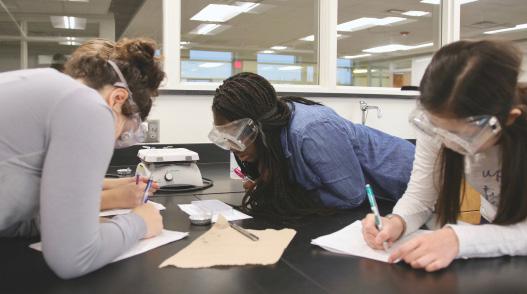
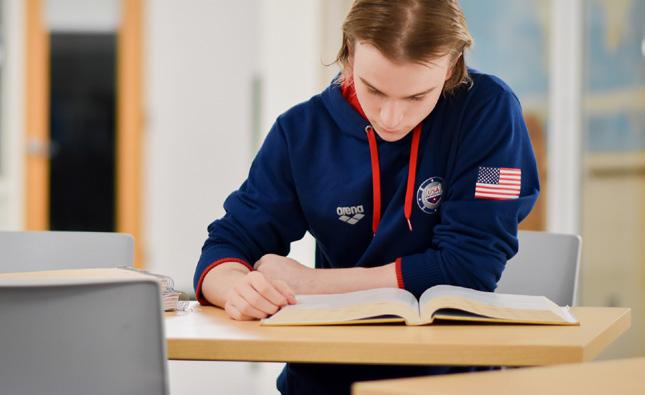
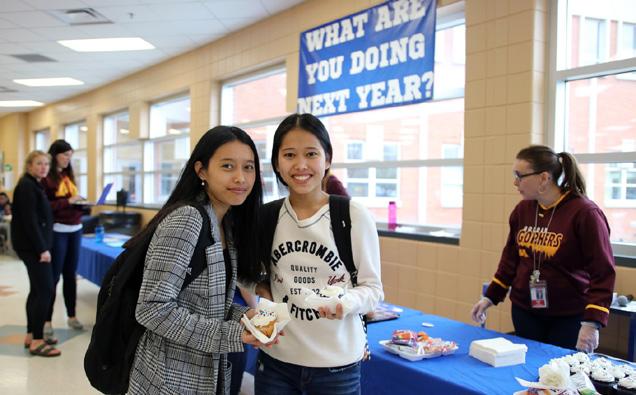
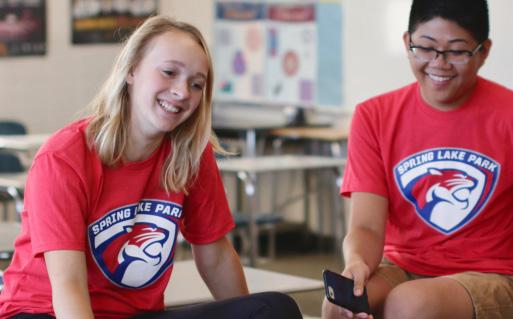

GO TO SECTION Family and Consumer Sciences Art Music CLICK IMAGES BELOW TO NAVIGATE TO COURSE LISTING SECTIONS. Physical Education and Health World Language Business and Entrepreneurship Health and Human Services Technology, Engineering & Design Language Arts Mathematics Science Social Studies Credits for Prior Learning AVID Hybrid or Online Course List
Students and Families,
We’re kicking off registration for the 2023-2024 school year. It’s time for students to refine their plans and make choices about their learning for next year. At Spring Lake Park High School, we deeply appreciate that each student’s path to career, college and life success is unique. We’re ready to support each of them in charting a course to reach their goals for graduation and beyond.
We want each student to graduate – on time – with identified plans for their future. We offer many options to explore career paths, earn college credits and gain real-world skills while fulfilling high school graduation requirements. At our best, we’re helping students discover their interests and equipping them for a life of learning and growth.
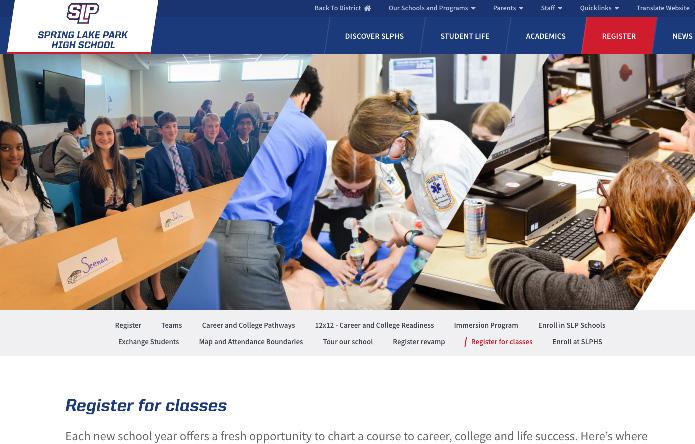
The choices students make now during registration set them further on their path. They also help our entire school community plan for a fantastic year. My advice: Take time now to consider and plan. Review course options. Weigh challenges and interests. Consult with teachers and staff to make choices that align to future goals. Let’s get to it.
Here’s to a new year of endless possibilities!
Regards, Matthew Boucher
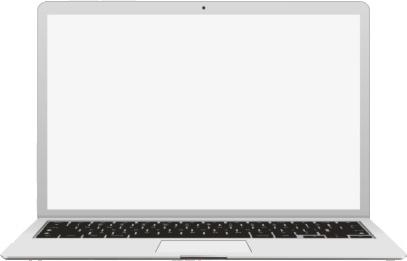
Principal
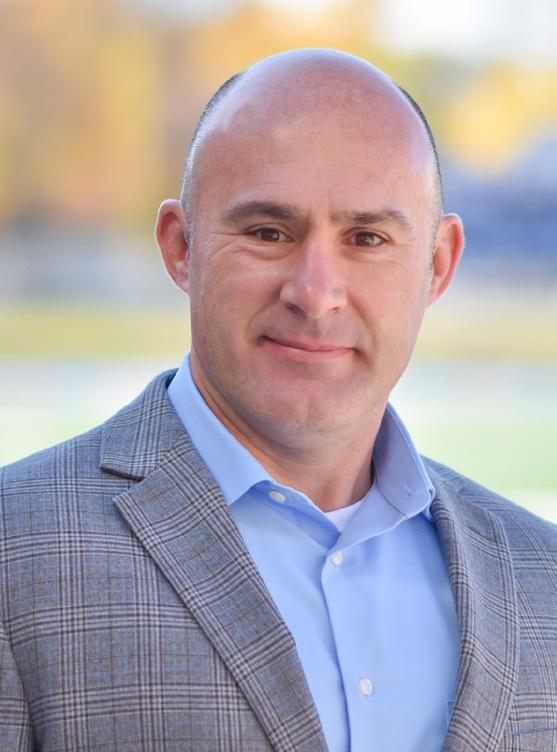
Spring Lake Park High School mbouch@district16.org I 763-600-5101
Our
District Purpose High expectations. High achievement for all. No excuses.
4 I
2023-2024 Registration Guide
Spring Lake Park High School
WELCOME ONLINE REGISTRATION HUB SpringLakeParkSchools.org/ HSregistration • Interactive, online catalog • Registration guide and 9th grade worksheet • Recorded presentations (Earning College Credit – 12x12, Exploring Careers – Pathways, Spanish Immersion, Athletics and Activities) • And more…
ADMINISTRATIVE
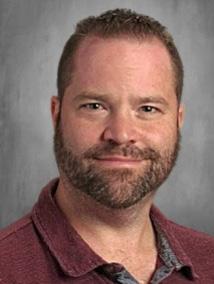
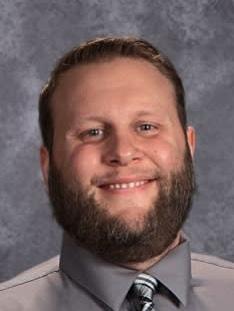
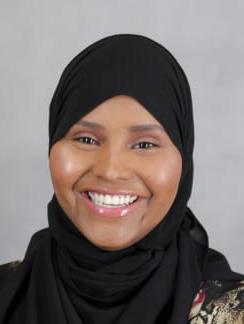
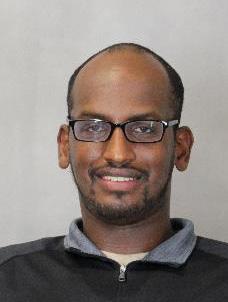
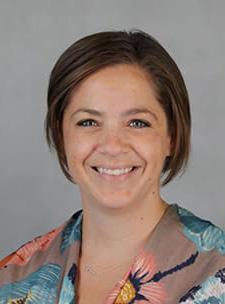

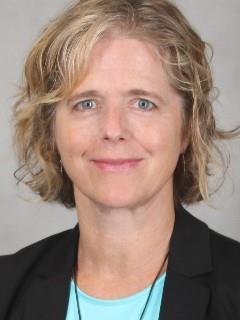
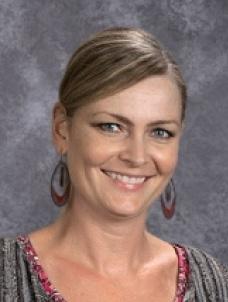
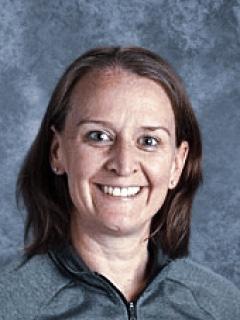
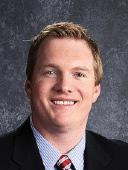
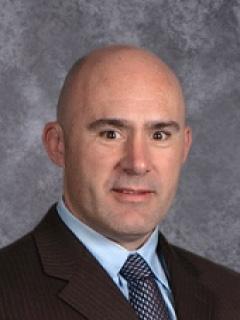
SpringLakeParkSchools.org/ HSregistration I 5 The Spring Lake Park High School administrators and counselors for personalized learning are here to support students as they develop their plans and make their course selections for next year. At any point in the process, reach out to the Student Services Office
at 763-600-5130.
TEAM COUNSELORS FOR PERSONALIZED LEARNING MATTHEW BOUCHER Principal mbouch@district16.org STEVE BRADY Associate Principal sbrady@district16.org MEGAN JAHNKE Associate Principal mjahnk@district16.org
MALECHA 10th & 12th grade Last Names Hi-Pa jmalec@district16.org YVONNE GODBER 10th & 11th grade Last Names Pe-Z tmontg@district16.org JENNIFER BLAIDO Counselor for College and Career Planning jblaid@district16.org MEET YOUR TEAM
REDMANN 9th & 11th grade Last Names
lredma@district16.org NOUR ALI 10th & 12th grade Last Names
nali@district16.org IKRAN SALAT 9th & 11th grade Last Names Hi-Pa isalat@district16.org TROY WILLEMSSEN 9th & 11th grade Last Names Pb-Z twille@district16.org CHRIS LEGRAND Dean of Students clegran@district16.org
JUSTINE
LINDSEY
A-He
A-He
STEPS AND TIMELINES
1 2
CREATE AND REVISE YOUR 4-YEAR PLAN
Each student at the high school has a 4-year plan within Naviance, an online tool used to support each student’s career and college readiness. The plan is updated and adjusted each year as students learn more about their interests and think more deeply about future plans.
• Current 8th graders create their initial 4-year plan for high school when high school counselors visit 8th graders at Westwood Middle School.
• Current 9th, 10th, and 11th graders review and revise their 4-year plan during the school day’s Panther Time. Updates can happen any time, and the goal is to use this registration season as a time to refine your choices and path.
EXPLORE COURSE OPTIONS AND MAKE CHOICES By February
24
Registration materials – including this full guide and interactive online course catalog – are available to support students as they explore options. We encourage students to:
• Review the information in the registration guide and online at SpringLakeParkSchools. org/HSRegistration . Information includes recorded presentations – a general overview, career pathways, earning college credit, athletics and activities and more.
• Pay special attention to graduation requirements, course sequence and opportunities to take rigorous courses.
• Consult with your teachers. Your teachers should be making recommendations about courses you should take next. Please consider their recommendations carefully, as they know your academic strengths and needs.
• Consider your post-secondary goals.
• Use your support system. Share your plans with your family and share any questions or concerns with your counselor.
CONFIRM COURSES
May and August 2023
A confirmation of next year’s course selections will be sent to homes in the month of May. Contact your counselor with any change requests. Final course schedules will be provided to students in August before the first day of school.
6 I Spring Lake Park High School 2023-2024 Registration Guide
3
The registration process supports intentional exploration and planning. It also provides the information we need to prepare course sections and determine staffing for the coming year. Course offerings are dependent on the number of students who sign up. Making sound decisions now that reflect your needs and goals is important.
CREDIT REQUIREMENTS
CREDIT REQUIREMENTS FOR GRADUATION
There are many ways to achieve the credits necessary to graduate. Students must have enough courses and credits in their core areas: English Language Arts, Science, Social Studies and Math. Electives cover a range of requirements and include courses in World Language, Fine Arts (including Art and Music), Physical Education, Career and College Pathways Courses and many more.
Graduation
Credit Requirement Credits
Arts-based 3 Health 1 Physical Education 2 Math 9 Language Arts 12 Science 9 Social Studies & Economics 11 Required Credits 47 Elective Credits 17 (minimum)
Total number of trimester credits 64 (minimum)
GRADUATING WITH ACADEMIC HONORS
At the time of commencement, students are recognized in various ways for their cumulative Grade Point Average (GPA) and for the academic rigor of their coursework:
Earned status
GPA requirement
Recognition
Graduate Less than 3.0 Blue/white tassel Honors graduate 3.0 through 3.399 Gold tassel High honors graduate 3.4 through 3.699 Gold tassel
Highest honors graduate 3.7 or greater Gold tassel With academic distinction 3.7 or greater Gold tassel w/ gold shoulder cord
A minimum of 29 credits of “high rigor” coursework are needed for students to graduate with Academic Distinction. At least four of those credits must have been earned in Trimester 1 and Trimester 2 of the senior year. The Grade Point Average (GPA) used to calculate graduation honors will be calculated at the end of Trimester 2. Courses of high rigor include all honors courses, advance math pathways, all Advanced Placement (AP) courses, and embedded, College In the Schools and articulated courses taken for college credit.
SpringLakeParkSchools.org/ HSregistration I 7
4-YEAR PLANNING
Students create a 4-year plan as they enter 9th grade within Naviance, an online tool to support career and college readiness. The plan is updated and adjusted each year as students learn more about their interests and think more deeply about their future plans.
A student’s 4-year plan should take into consideration the various requirements at any post-secondary institutions they are considering after they graduate:
Subject Technical College Community College

4-Year MN State College U of M 4-Year Private College
Language Arts 4 years 4 years 4 years 4 years 4 years
Social Studies 3 years 3 years 3 years 3 years 4 years
Math 3 years 3 years 3 years 4 years 4 years Science 3 years 3 years 3 years 4 years 4 years
World Language 2 years 2+ years 2+ years
Fine Arts 1 year 1 year 1 year
Admission Testing Accuplacer optional Accuplacer optional ACT / SAT optional ACT / SAT optional ACT / SAT optional
8 I Spring Lake Park High School 2023-2024 Registration Guide
LEARNING MODELS
TEAMS: GRADE 9 AND GRADE 10
Teams for 9th and 10th graders are designed to offer a supported transition into high school by fostering strong relationships between a common group of students and teachers. Students are placed on teams for their four core courses – English, Math, Science and Social Studies. Teams are about 100-120 students. By knowing students more deeply, teachers are able to personalize student learning based on their understanding of their students as learners.
MODES OF LEARNING – IN-PERSON, HYBRID AND ONLINE
Students have choices in how they learn. Many courses are offered in multiple modes – in-person, hybrid or online.
All students have the ability to choose:
• In-person, classroom-based courses that meet five days per week at school.
• Online courses, available through SLP Schools Online, delivered primarily through asynchronous (ondemand) learning experiences.
In grades 11 and 12, students may also choose courses that are:
• Hybrid courses that meet 2-3 days per week in-person at school (Tuesday, Wednesday, Thursday). Other days, students work independently from anywhere.
Students can mix and match modes of learning by course or choose courses in all one learning mode as they design their schedules.
FULL-TIME ONLINE
SLP Schools Online offers a full-time online learning option for students in grades K-12. The online high school experience provides students choice in the time, place, path and pace of their learning as they develop both academic and life competencies aligned to state standards.
Spring Lake Park High School teachers facilitate learning primarily through asynchronous, “on demand,” learning experiences. Virtual “live” sessions and/or small group learning experiences also are defined for each course. Each student is assigned a learning advocate, an SLP teacher, who checks in with students and families frequently to understand a student’s progress and provide direct learning support.

SpringLakeParkSchools.org/ HSregistration I 9
CO-CREATED LEARNING EXPERIENCES
Students at all grade levels can choose to co-create their own learning experience with a teacher to achieve identified academic and life competencies. Learning is designed to help the student earn high school credit in identified subject areas and connect a student’s passions outside of school and their goals for career and college.
Key highlights:
• Courses are trimester or yearlong project-based courses.
• Learning can happen in a variety of places and ways and is primarily independent learning through research, reading, listening, viewing, participating, and creating.
• The teacher is a learning advocate and responsible for supporting and guiding the student on their learning journey.
ALTERNATIVE OPTIONS TO MEET ACADEMIC REQUIREMENTS
Students have the opportunity to waive a course, or receive course credit, for knowledge they acquire outside the standard course curriculum. The experience must meet current Minnesota academic standards. Students may pursue credit in two ways:
• Credit by Assessment - In credit by assessment, students demonstrate the course learning outcomes prior to enrollment in a course by taking an examination.
• Credit by Portfolio - Credit by portfolio is an option that high school students have for attaining course learning outcomes through an approved learning experience.
Students who are interested in either of these options must, along with their parent, consult with their counselor. Requests will be reviewed on an individual basis. The principal or designee in consultation with the student, counselor and a teacher for the specified content area determine whether a course will be waived, or credit will be granted.
10 I Spring Lake Park High School 2023-2024 Registration Guide
CAREER AND COLLEGE
CAREER AND COLLEGE READINESS
Today’s students are building the skills they need to navigate a world of the future we can’t even imagine. We’re focused on getting them ready for career, college, and life.

EXPLORING CAREERS – CAREER PATHWAYS
Career Pathways courses provide students with an opportunity to explore different careers as they gain skills, work on real-world projects and even earn college credit. Through pathways courses, students have a chance to see if a career path is of interest – or not – and gain experiences to help them make better decisions for their path after high school.
There are three Career Pathways that each represent a predicted need for future jobs. Students can take courses in one pathway – or all three.
BUSINESS AND ENTREPRENEURSHIP
Experience the many careers within the varying types of business, from startups to small businesses and corporations to nonprofits. Explore marketing, finance, leadership, business management, analytics and other sectors. Gain skills to thrive in the business world.
TECHNOLOGY, ENGINEERING & DESIGN
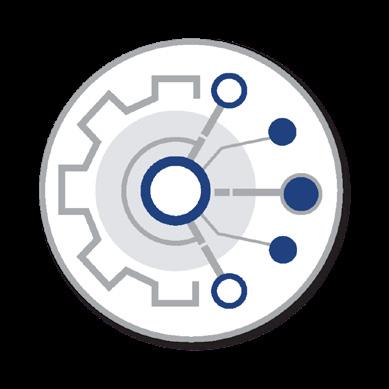
Explore the advances and innovation within the design, engineering, and information systems fields. Through hands-on experiences with simulations, projects, case studies, and guest instructors, students also gain collaboration skills critical to success in today’s workforce.
HEALTH & HUMAN SERVICES
Explore careers that meet the basic needs of our communities, including medicine, public health, social services and education. This pathway gives students several opportunities for hands-on learning in the field.
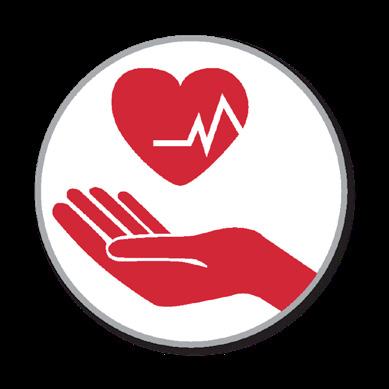
SpringLakeParkSchools.org/ HSregistration I 11
Career Pathways give students a chance to work with real companies on real projects, while fulfilling graduation requirements and even earning college credits.
EARNING COLLEGE CREDIT – 12 COLLEGE CREDITS BY 12TH GRADE
Increasingly, any path beyond high school requires some exposure to college-level rigor. Our goal is for each graduate to have an opportunity to earn 12 college credits by the end of the 12th grade – without leaving their Spring Lake Park High School experience. There are many routes to achieving 12 by 12.
Research shows that completion of one semester of college-level work results in higher success at the postsecondary level, regardless of what path you take. College-level rigor is preparation for 2-year, 4-year and technical jobs. It also makes financial sense. Earning college credits now saves money in the future.
• Advanced Placement (AP) - AP courses are some of the most widely accepted college-level academic experiences available to high school students. Credit is not guaranteed; it depends on your AP Exam score and each college sets their own score marker for obtaining credit. AP courses are the ONLY weighted courses at the high school using an added .5 weight.
• Pathways courses - Year-long Pathways courses are designed to embed college credit options while also providing hands-on learning experience in a career field. These courses provide an opportunity to see if you actually like a particular career field such as engineering, business, or healthcare and help you make a better decision about what type of college or certification you may want to do after high school.
• Project Lead the Way – These are engineering courses for which students can apply for credit through University of Minnesota or St. Cloud State University. Each course requires a passing grade on the end-ofcourse assessment.
• Articulated College Credit - Articulation agreements allow students to earn a certificate of completion from the partnering college. College credits are typically awarded if you attend that specific college after graduation.
• College in the Schools (CIS) - CIS is a collaborative program offered through the University of Minnesota – Twin Cities. Students in CIS are concurrently enrolled—taking a college course at Spring Lake Park High School.


• Embedded College - Students have the opportunity to start their college careers early by taking rigorous, college-level classes in the high school. Assessment will determine eligibility for the Concurrent Enrollment Program. Partnering programs include Anoka-Ramsey Community College, Bethel University, and Mankato State University.

12 I Spring Lake Park High School 2023-2024 Registration Guide
As you explore courses, look for the 12x12 symbol. That will tell you if college credit is available. There are many different options available at the high school for earning college credits.
12x12
AVID (ADVANCEMENT IN INDIVIDUAL DETERMINATION)
AVID is an elective program at the high school for students enrolled in advanced courses, in the academic middle and college bound. The program helps students to build academic, career and life skills used in high school and beyond.



A normal week in AVID elective consists of two days of skill-building in writing, inquiry, collaboration, organization and reading. Two days of tutorials and other activities that support their thinking in core classes and one day of exploration into future planning such as career and college.
Students build their executive functioning, organizational and academic skills. They develop test-taking strategies, access support for AP, honors and college credit bearing courses as well as gain exposure to colleges and careers through tours, guest speakers and class activities.
To join, students must complete and return an application and complete a short interview. For more information contact your counselor or Ms. Switzer lswitz@district16.org.
POSTSECONDARY ENROLLMENT OPTIONS (PSEO)
This program is outside of the high school. It allows 10th-, 11th- and 12th-grade students to earn both high school and college credit while still in high school, through enrollment in and successful completion of collegelevel courses at eligible participating postsecondary institutions. Students must meet the PSEO residency and eligibility requirements and abide by participation limits specified in Minnesota Statutes, section 124D.09. Students must notify the school by May 30 if they want to participate in PSEO for the following school year.
SpringLakeParkSchools.org/ HSregistration I 13
SPANISH IMMERSION
SPANISH IMMERSION AND “JUNTOS”
Students who have been involved in the Spring Lake Park Schools Spanish Immersion and Juntos programming are welcomed to Spring Lake Park High School (SLPHS) with a series of rigorous and engaging courses instructed in the target language of Spanish. High school courses meet and extend student’s language acquisition.
• Placement in high school courses: In the spring of the 8th grade year, students take the AAPPL (ACTFL Assessment of Performance toward Proficiency in Languages). Based on results, students are placed in college-level Spanish classes at the high school.
• High school schedule: Students will have one class in the target language of Spanish each year at the high school, assuming they place into it.
• College credits: Through our partnership with Minnesota State Mankato, students may earn MNSCU college credits for College Intermediate Spanish 101, 102, 201, 202 and 210. Advanced Placement Spanish Literature and Culture is also offered for college credit potential.
• Bilingual seal: Beginning in 11th grade, students have an opportunity to test and obtain their bilingual seal, a recognition of their proficiency in Spanish.
• Internship opportunities: In the 12th grade, students have access to additional opportunities for Spanish-speaking internships within the SLP pathways for teacher training, Opportunities in Emergency Care, and business.
For students involved in immersion or Juntos programming, our goal is for each graduate to leave our school bilingual and biliterate and English and Spanish.
INMERSIÓN EN ESPAÑOL Y EL PROGRAMA “JUNTOS”
Los alumnos que participaron en el programa de inmersión en español y el programa que se llama “Juntos” tienen la oportunidad de tomar una serie de cursos interesantes y rigurosos en español cuando llegan a los grados 9-12. Estos cursos toman en cuenta su nivel actual del español y les apoyan con su desarrollo continuo del idioma.
• Cursos ofrecidos en los grados 9-12: En la primavera del octavo grado, estos alumnos tomarán el examen “AAPPL,” que mide su progreso hacia ser proficiente en el idioma español. Según sus resultados, los alumnos pueden llegar a tener la oportunidad de tomar clases en español de nivel universitario durante los grados 9-12.
• El horario escolar en los grados 9-12: Con tal de que saquen los resultados requeridos del examen AAPPL, los alumnos tendrán una clase en español cada año escolar durante los grados 9-12.
• Créditos universitarios: Gracias a nuestra colaboración con la universidad de Minnesota State Mankato, los alumnos pueden ganar créditos universitarios durante los grados 9-12 cuando toman los cursos de español 101, 102, 201, 202 y 210. También existen cursos avanzados de literatura y cultura español que pueden contar para créditos universitarios.
• El sello bilingüe: Empezando con el grado once, los alumnos tienen la oportunidad de usar sus resultados del examen AAPPL para obtener un “sello bilingüe,” que es un reconocimiento de su nivel avanzado del español.
• Oportunidades de ser aprendiz: En el grado doce, los alumnos tienen acceso a oportunidades en español para ser aprendiz en los áreas de educación (entrenamiento para ser maestro/a), el cuido médico de emergencia, y los negocios.
Nuestra meta para los alumnos que participaron en el programa de inmersión en español y el programa que se llama “Juntos” es que se gradúen de nuestra escuela siendo bilingüe, con la habilidad de leer y escribir en los dos idiomas de ingles y español.
14 I Spring Lake Park High School 2023-2024 Registration Guide
ENGLISH LANGUAGE LEARNERS
We have three different levels of service for students identified as English Learners. Entrance, placement, and exit from services is determined by teacher recommendation and the ACCESS for ELs test administered every February.
Level 1 (newcomer):
Students with beginning levels of proficiency are placed in a newcomer class (ELD 1) that provides intensive and direct instruction on the social and instructional language needed for academic success. This is a two-hour block of classes that is also accompanied by three elective classes in the student’s schedule that also help them to begin to acquire conversational English. An additional support hour is also recommended. Students receive elective credit for completion of ELD 1 classes.
Level 2 (intermediate proficiency):
Students with an intermediate proficiency are placed in at least one of the following sheltered classes. These courses allow students to develop their academic language skills while working towards the grade-level Minnesota content standards. Instructional strategies include teaching vocabulary, providing additional reading and writing supports, and using visual, auditory, and kinesthetic supports to deepen understanding of the language and content.
• Language of Humanities (ELA credit)
• ELA 9/10 (ELA credit)
• ELA 11 (ELA credit)
• Human Geography/Civics (Social Studies credit)
• US History (Social Studies credit)
Level 3 (advanced proficiency):
Students with an advanced proficiency in the English language are enrolled in a support hour where they receive support in organizing and mastering course work for other classes. Students also have opportunities to engage in language lessons that help them to be successful in their other classes. Elective credit is given for participating in the language lessons and other coursework.
SpringLakeParkSchools.org/ HSregistration I 15
Art Foundations 1
Course Numbers: School-based - 1001 | Online - 5001 Grades: 9, 10, 11, 12
Credits: 1
Type: Trimester; meets art requirement Fee: No fee for basic projects, additional projects may incur a project based fee.
This is a foundation course of drawing and painting concepts. Students will explore the elements of design through projects like figure drawing, portraiture, landscape, animals, and still life. Various media like pastels, ink, markers, digital apps, and acrylic paint will be the artist’s tools throughout the course. Emphasis will be placed on art history, aesthetics, criticism, and studio production.
Art Foundations 2
Course Numbers: School-based - 1002 | Online - 5002 Grades: 9, 10, 11, 12
Credit: 1
Type: Trimester; meets art requirement Prerequisite: Art Foundations 1 Fee: No fee for basic projects, additional projects may incur a project-based fee.
This foundation’s course continues to explore drawing and painting concepts. Students will be introduced to the principles of design through projects like observational drawing, gesture drawing, grid design, oil painting, and a self-portrait. Art appreciation will concentrate on major art movements from cave paintings through the Renaissance into modern isms.
Adobe Illustrator: Electronic Easel
Course Number: 1003 Grades: 9, 10, 11, 12
Credit: 1
Type: Trimester; meets art requirement Prerequisite: Art Foundations 1 Fee: No fee for basic projects, additional projects may incur a project-based fee.
Adobe Illustrator is considered the industry standard in today’s fast-paced world of visual communication and print. During the first half of the trimester, students will learn the in-depth tools of this vector-based program with teacher-guided tutorials. The student will soon be able to apply the technology and skills they gain and create original pieces of their own designs. Elements and principles of design will be emphasized and applied to sketch compositions. Students will learn to scan their own sketches and recreate the designs using this powerful program. This course is designed for both the beginner and the serious art students who wish to take their art to the level of digital manipulation.
AP Studio Art: 2D Design Course Numbers: 1005/1006/1007 Grades: 11, 12 Credits: 3
Type: Honors credits; Full year; meets art requirement Prerequisite: Art Foundations 1 & 2 Fee: No fee for basic projects, additional projects may incur a project-based fee.
Post-secondary Connection: College credit possible upon successful completion of AP Portfolio
This course is designed to create a fully functional portfolio for the serious art student. The course offers instruction in aesthetics through various art media such as charcoal, ink, pastel, painting, digital apps, or other 2D designs. The student will tap into their personal artistic skills and refine their true creative style through multimedia. An Artist’s Statement is required. Student assessment will be based on critiques of work and a personal Keynote portfolio. Students taking this class will be required to work independently on their portfolio. This course will prepare students for submission of a 2D or 3D portfolio to the College Board for Advanced Placement credit.
AP Studio Art: 3D Design Course Numbers: 1015/1016/1017 Grades: 11, 12 Credits: 3
Type: Honors credits; Full year; meets art requirement Prerequisite: Ceramics 1 & 2
Fee: No fee for basic projects, additional projects may incur a project-based fee.
Post-secondary Connection: College credit possible upon successful completion of AP Portfolio
This course is designed to create a fully functional portfolio for the serious art student. The course offers instruction in aesthetics through various art media such as plaster, yarn, jewelry, pottery sculpture or other 3D designs. The student will tap into their personal artistic skills and refine their true creative style through multimedia. An Artist’s Statement is required. Student assessment will be based on critiques of work and a personal Keynote portfolio. Students taking this class will be required to work independently on their portfolio. This course will prepare students for submission of a 3D portfolio to the College Board for Advanced Placement credit.
16 I Spring Lake Park High School 2023-2024 Registration Guide
ELECTIVES: ART 12
x12 12x12
Ceramics 1
Course Number: 1010
Grades: 9, 10, 11, 12
Credit: 1
Type: Trimester; meets art requirement Fee: No fee for basic projects, additional projects may incur a project-based fee.
This beginning course in ceramics will introduce the student to clay construction, the use of clay tools and the three hand building methods of clay construction: pinch, slab, and coil. Students will also learn glazing techniques. The student will demonstrate an understanding of art analysis in a final presentation.
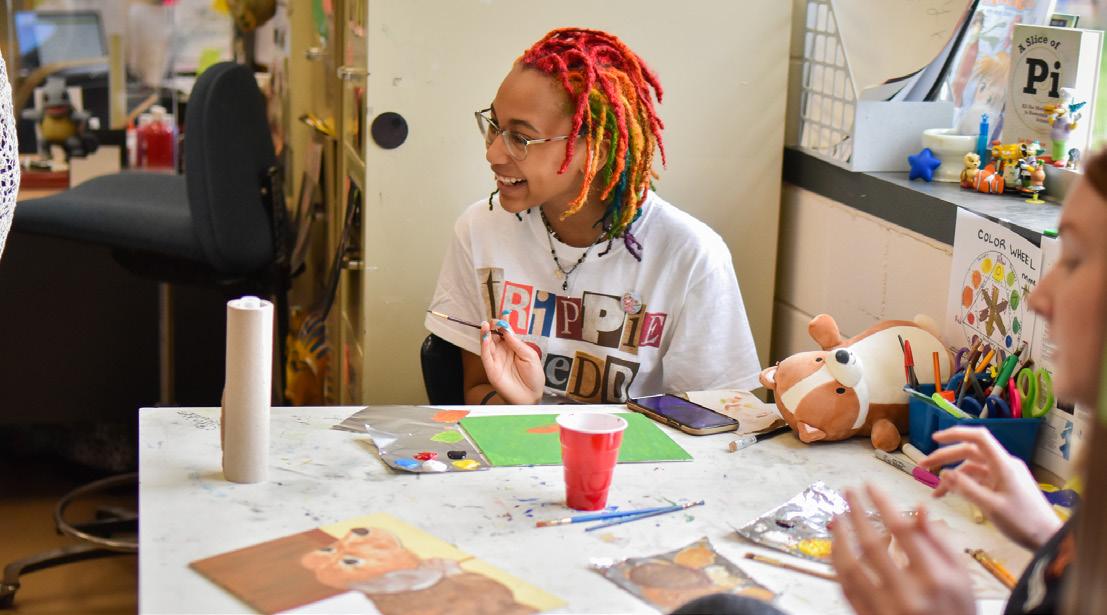
Ceramics 2
Course Number: 1011
Grades: 9, 10, 11, 12
Credit: 1
Type: Trimester; meets art requirement
Prerequisite: Ceramics 1 Fee: No fee for basic projects, additional projects may incur a project-based fee.
This is the second course in our sequence of ceramics class offerings. Register for this class if you are serious about advancing your skills in pinch, slab, and coil methods. Students will be introduced to throwing clay on the potter’s wheel. Students are encouraged to create original works of art. Students will create a personal portfolio presented in a slide show format. If the student successfully completes this course, he/she may continue their ceramics experience in AP Studio Art 3D or Ceramics 3 - ARCC and possibly earn college credit.
Ceramics 3
Course Number: 1012
Grades: 10, 11, 12
Credit: 1
Type: Trimester; meets art requirement Prerequisite: Ceramics 2 Fee: No fee for basic projects, additional projects may incur a project-based fee.
This is the third course in our sequence of ceramics class offerings. The course covers the advance techniques of ceramic arts including methods of construction, forming on the potter’s wheel, glazing, and firing. Historic perspective, the contemporary expression using ceramic media, and discussion of ceramic issues are part of the class. Students should be prepared to work in the studio outside of class time.
Introduction to Photography
Course Numbers: School-based - 1021 | Online - 5021 Grades: 9, 10, 11, 12
Credit: 1
Type: Trimester; meets art requirement Fee: No fee for basic projects, additional projects may incur a project-based fee.
Digital Photography using an iPad/cellular device is a foundational course exploring the science and composition of photography. Students will gain an understanding of how reflective light is captured through various science experiments; cyanotypes, and capturing imagery through the camera obscura. Students will learn the basics of the camera system and Photographic Principles of Design and how to apply this knowledge to their own DSLR cameras and the iPad. The student will be introduced to a raster based application such as Adobe Photoshop and be able to apply some basic editing techniques as well as work with some basic layout design principles with layers. DSLR cameras are suggested but not required as the iPad will be the main tool of the course.
Advanced Black & White Photography Course Number: 1022 Grades: 10, 11, 12 Credit: 1
Type: Trimester; meets art requirement Prerequisite: Intro to Photography Fee: No fee for basic projects, additional projects may incur a project-based fee.
This course is for the serious photographer who wishes to take up photography as a hobby or profession. Traditional 35mm film is explored at a more rigorous pace, challenging the student to apply elements and principles of composition while learning advanced techniques of camera use to create desired effects in their images. Advanced darkroom techniques are introduced with the use of filters and dodging and burning. Students should have access to a traditional 35mm SLR FILM camera. Newer cameras should have settings that manually control ISO, F/stops and shutter speeds. There are a limited number of cameras available for use during the trimester.
SpringLakeParkSchools.org/ HSregistration I 17
ELECTIVES: ART
ELECTIVES: ART
Graphic Arts – Digital Drawing Course Number: 1037 Grades: 9, 10, 11, 12
Credit: 1
Type: Trimester; meets art requirement Fee: No fee for basic projects, additional projects may incur a project-based fee.
Welcome to Graphic Arts - Digital Drawing! Want to learn art as a complete beginner or take your existing art skills to the next level? You’ve come to the right place! We will learn how to use up-andcoming professional art software. You will learn all the essential skills needed to get ahead in the crowded digital art industry with a curriculum packed with content to help develop or extend your artistic talent. Ranging from visual vocabulary, the steps of design, storytelling through art and much more, all leading to complete artworks digitally drawn.
Digital Art & Design Course Numbers: School-based - 2140 | Online - 5940 Grades: 9, 10, 11, 12
Credit: 1
Type: Trimester; Art Elective
This is an entry-level course. Students will learn about relevant digital design elements used by professionals across the globe, including image creation, graphics, typography, page layout, color theory, navigation, editing, branding, and more. In this modified version of the course students will develop an understanding of how to apply these principles in adobe creative suite software program designed for the iPad. A variety of apps will be used in designing authentic digital products utilized in business, marketing, computer science, and beyond. This course is highly recommended for students with an interest in business, entrepreneurship, marketing, computer science, art, and/or design careers.
How to Make Almost Anything
Course Numbers: School-based - 2101 | Online - 5901 Grades: 9, 10, 11, 12
Credit: 1
Type: Trimester; Art elective
This one-trimester elective course provides a hands-on introduction to the initial foundations of engineering and the design process. Students will work in the Spring Lake Park High School Maker Studio as designers. They will become inventors, artists, and creators, using human- centered design, engineering principles, and cutting-edge technology to create prototypes of practical solutions to problems that people face every day. Products will be designed on computers for processing on 3D printers, vinyl cutters, and a laser cutter. This is a project-based course that requires students to exhibit self-direction and agency.
Yearbook Publication – Fall, Winter, Spring Course Numbers: 1031/1032/1033
Grades: 9, 10, 11, 12
Credit: 1
Type: 1, 2, 3 trimesters; meets art requirement
Prerequisite: None, however Digital Art and Design is a great way to gain experience for this course!
Fee: None. Students have the opportunity to earn not only an art credit but also a discount toward the purchase of their own yearbook and even better cover the full cost. Students must understand that their contribution towards the publication stays consistent throughout the year to receive full credit for a complete book.
This course is for the serious student who is willing to commit fully to producing an award winning yearbook that families purchase expecting a high quality product. Students are encouraged to take these courses for all three trimesters in a single year as the publication is produced over two trimesters and the next year’s book begins in the spring. Meets arts requirements. Yearbook is defined as a complete record of our community at SLPHS through journalism, photography. Adobe Photoshop, and a desktop publishing program will be used throughout the year. Registering for all three trimesters is recommended but not required.
Students who wish to design their senior yearbook should seriously consider registering for Yearbook Publication in the spring of their junior year.
Advanced Yearbook Staff – Fall, Winter, Spring Course Numbers: 1034/1035/1036
Grades: 10, 11, 12
Credit: 1
Type: Trimester; meets art requirement (can be taken more than once)
Prerequisite: At least one trimester of Yearbook Publication and have permission from the instructor.
Fee: None. Students have the opportunity to earn not only an art credit but also a discount toward the purchase of their own yearbook and even better cover the full cost. Students must understand that their contribution towards the publication stays consistent throughout the year to receive full credit for a complete book.
In this advanced level of the series, experienced students will work independently and be able to mentor beginners while exploring and developing a higher understanding of design and conceptual work. The student will have the opportunity to contribute towards the theme and final layout designs. Juniors are highly encouraged to enroll in “Yearbook Publication –Spring”, so they can develop their senior yearbook. The student has the opportunity to earn leadership roles on the main yearbook staff and to earn a varsity letter. Students will be mentoring their peers throughout the course. Note for Juniors: In the spring of your junior year, you will have the opportunity to attend a Yearbook Training Camp in June to begin the overall theme and look of the book.
18 I Spring Lake Park High School 2023-2024 Registration Guide
ELECTIVES: ART
Adobe Photoshop: Digital Darkroom
Course Number: 1024 Grades: 9, 10, 11, 12
Credit: 1
Type: Trimester; meets art requirement Fee: No fee for basic projects, additional projects may incur a project-based fee.
Photoshop is the digital answer to manipulating images and producing special effects on prints. The computer becomes the darkroom and is a powerful tool in creating imagery while using today’s standards in the design industry. Students will be using devices such as iPads, cell phones and professional DSLR digital cameras to capture images; then applying the techniques in Adobe Photoshop to enhance their compositions. It is helpful that students have an understanding of how to use a DSLR camera prior to taking this class, but it is not required. Basic use of the DSLR will be covered in the course. Some standard teacher guided lessons will be done with images provided for the student on formative assessments given throughout the course. Summative assessments will require the student to produce original images using some type of camera or device.
Co-Created Course: Fine Arts
Course Number: 9710
Grade: 9, 10, 11, 12
Credits: 1, 2, or 3
Learning Mode: Individualized course – Students co-create their learning experience with a teacher to achieve identified academic and life competencies. Learning can happen in a variety of places and ways.
Type: Full Year or Trimester. Depends on the design of the learning plan
Create your own course in Art by working closely with a teacher to achieve learning outcomes, earn high school credit and connect your learning to your passions outside of school and to your career and college goals. Students and teachers design the learning experiences together matched to the individual student’s learning performance level and preferences. Students follow their customized learning pathway supported and guided by the teacher. Learning goals are connected to clear, diverse, and engaging experiences that are based on content and life competencies. Through research, reading, listening, viewing, participating, and creating, students advance their learning and are able to demonstrate their learning when they are ready, rather than a predetermined time.
ELECTIVES: FAMILY AND CONSUMER SCIENCES
Culinary Arts I Course Number: 1070 Grades: 9, 10, 11, 12
Credit: 1
Type: Trimester; Art elective Fee: No fee for basic projects, additional projects may incur a project fee.
Culinary Arts 1 will provide a foundation of culinary skills. In this course, students will gain knowledge, skills and understanding of food preparation techniques and baking methods. Students will participate in culinary labs that provide hands-on learning experiences. Lab experiences include the following: quick and easy breads, cookies, fruit/vegetables, dairy, etc. as well as meal preparation.
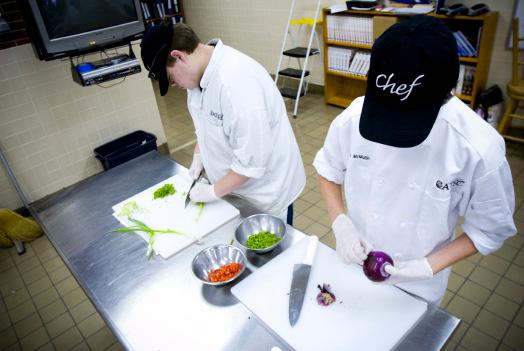
Culinary Arts II Course Number: 1071 Grades: 9, 10, 11, 12
Credit: 1
Type: Trimester; elective Fee: No fee for basic projects, additional projects may incur a project fee.
Culinary Arts II is the next step to advancing culinary skills with an enriched understanding of food principles, techniques and cultural cuisine skills. Students will participate in a variety of culinary labs that will move beyond the basics. Let world cultures and cuisines be your guide as you plan and prepare food from around the world to deepen the understanding of culinary techniques. Hands-on lab experiences will include but are not limited to culinary tools, regional foods, cultural cuisines of various countries, garnishes, meats, salads, desserts, etc.
SpringLakeParkSchools.org/ HSregistration I 19
ELECTIVES: MUSIC
Varsity Band Course Number: 1300 Grades: 9
Credits: 3
Type: Full Year; meets art requirement Prerequisite: All students are welcome. Fee: $25 uniform, instrument rentals are available for most instruments on an as needed and availability basis.
Varsity Band covers intermediate skills in ensemble and individual performance skills and expands upon previously learned musical skills and concepts. Performance repertoire represents a wide variety of genres, periods and cultures. Through the use of music, students will be able to develop creative self and ensemble expression, create music and perform in a variety of experiences.
Symphonic Band Course Number: 1306 Grades: 10, 11, 12
Credits: 3
Type: Full Year; meets art requirement Prerequisite: All students are welcome. Fee: $25 uniform, instrument rentals are available for most instruments on an as needed and availability basis.
Students in Symphonic Band gain an advanced understanding of their individual instruments, as well as mature ensemble skills, complex rhythm reading and further music composition skills. Students receive individual or small group lessons. Ensembles are evenly distributed based on ability and instrument needs.
Wind Ensemble Course Number: 1309 Grades: 10, 11, 12
Credits: 3
Type: Full Year; meets art requirement
Prerequisite: Teacher approval required Fee: $25 uniform, instrument rentals are available for most instruments on an as needed and availability basis.
Students in Wind Ensemble gain an advanced understanding of their individual instruments, mature ensemble skills, complex rhythm reading and complex problem solving through composition. Students receive individual or small group lessons. Ensembles are evenly distributed based on ability and instrument needs.
Jazz Ensemble
Course Number: 1312
Grades: 10, 11, 12
Credits: 3
Type: Full Year; meets art requirement Prerequisite: Teacher approval required with concurrent registration in another band course.
Fee: Instrument rentals are available for larger instruments.
Jazz Ensemble is composed of wind instruments and a standard rhythm section (piano, guitar, bass, drums). The course is dedicated to the performance and study of Jazz, Latin, Contemporary rock, Funk, and more. Course also includes jazz music theory and a large improvisational component. This course meets as a zero-hour class before school and students must be concurrently enrolled in either Symphonic Band or Wind Ensemble. Once students are enrolled in Jazz Ensemble, they will be divided into two separate ability-based groupings known as Jazz 1 and Jazz 2.
Song Writing 1
Course Number: 1336 Grades: 9, 10, 11, 12
Credit: 1
Type: Trimester
This course, for beginning songwriters, focuses on basic songwriting styles and techniques. Over the course of the trimester, different songwriting basic methods will be presented and students will be shown easy to understand methods to develop the necessary skills to compose wellcrafted lyrics and music. Focusing on melody writing and lyric structure, your teacher will encourage you to develop your own personal musical identity and help the student develop critical listening skills. This will be accomplished in a lecture/ demonstration format that will include networking with other students as learning opportunities during each class and by analyzing hit songs.
Music Production 1
Course Number: 1337 Grades: 9, 10, 11, 12
Credit: 1
Type: Offered Trimester 1; meets art requirement
This course is for students who want to be able to create, perform and produce their own music. Students will develop their own music making skills through the use of recording technology and techniques to create a graduated complexity of productions in a variety of styles including Hip Hop, Rock, and R&B. Students will also learn music creation fundamentals, acoustics, audio technology terminology and some music management and marketing fundamentals.
20 I Spring Lake Park High School 2023-2024 Registration Guide
ELECTIVES: MUSIC
Music Production 2
Course Number: 1338
Grades: 10, 11, 12
Credit: 1
Type: Offered Trimester 1; meets art requirement
Prerequisite: Music Production 1
This course is for students who want to continue building the skills learned in Music Production 1. Students will use a more in-depth process to create, perform, and produce their own music that includes analysis, technology, and real-world applications. Students will also continue to deepen their contemporary and historical knowledge of music genres including Hip Hop, Rock, R&B, Jazz and Blues.
Panther Choir
Course Number: 1320
Grades: 9, 10, 11, 12
Credits: 3
Type: Full Year; meets art requirement Prerequisite: All students are welcome regardless of choral experience.
The Panther Choir is a group of students of various grade levels and abilities. Through performing a variety of vocal genres including choral repertoire, music from world cultures and traditions, and American popular music, among others, students will gain music reading skills, singing skills, learn about history, explore other cultures and connect with each other in new and meaningful ways.

Bel Canto Treble Choir
Course Number: 1326
Grades: 10, 11, 12
Credits: 3
Type: Full Year; meets art requirement
Prerequisite: Membership for upper-class treble voices (alto and soprano) is by audition with the director. Students must be able to match pitch.
Bel Canto Treble Choir is a group of treble voices of various grade levels and abilities. Through performing a variety of vocal genres including choral repertoire, music from world cultures and traditions, and American popular music, among others, students will gain music reading skills, singing skills, learn about history, explore other cultures and connect with each other in new and meaningful ways.
Concert Choir Course Number: 1323
Grades: 10, 11, 12
Credits: 3
Type: Full Year; register for all three trimesters; meets art requirement
Prerequisite: Membership is by audition with the director. Students must be able to sing in tune on their own and have an intermediate knowledge of music concepts and terms.

Concert Choir is a group of students of various grade levels with a thorough knowledge of vocal technique and a high degree of self-discipline. Through performing a variety of vocal genres including choral repertoire, music from world cultures and traditions, and American popular music, among others, students will gain music reading skills, singing skills, learn about history, explore other cultures and connect with each other in new and meaningful ways.
Co-Created Course: Music Course Number: 9713
Grades: 9, 10, 11, 12
Credits: 1, 2, or 3
Learning Mode: Individualized course – Students co-create their learning experience with a teacher to achieve identified academic and life competencies. Learning can happen in a variety of places and ways.
Type: Full Year; meets art requirement
Create your own course in Music by working closely with a teacher to achieve learning outcomes, earn high school credit and connect your learning to your passions outside of school and to your career and college goals. Students and teachers design the learning experiences together matched to the individual student’s learning performance level and preferences. Students follow their customized learning pathway supported and guided by the teacher. Learning goals are connected to clear, diverse, and engaging experiences that are based on content and life competencies. Through research, reading, listening, viewing, participating, and creating, students advance their learning and are able to demonstrate their learning when they are ready, rather than a predetermined time.
SpringLakeParkSchools.org/ HSregistration I 21
ELECTIVES: PHYSICAL EDUCATION & HEALTH
Health
Course Numbers: School-based - 1401 | Online - 5401 Grades: 10, 11, 12
Credit: 1
Type: Trimester; Meets Health credit requirement
This course studies individual health, critical thinking and decision making to promote life-long healthy choices. Topics covered include digital citizenship, self-esteem, nutrition, healthy sexual development, mental/emotional health and addiction/drugs. Students will be asked to reflect on the decisions made in their own life as they relate to course topics, as well as transfer the learning to experiences outside of class.
Foundations of Fitness
Course Numbers: School-based - 1410 | Hybrid - 1411 | Online - 5410 Grades: 9, 10, 11, 12
Credit: 1
Type: Trimester; Meets 1st Phy. Ed. credit requirement
Students will engage in performance-based activities to introduce the health-related fitness concepts, skill-related components of fitness and promote personal fitness. Individual and team-centered activities will be used to develop fitness as well as learn and reinforce skills, strategies, teamwork, and sportsmanship. Students will evaluate personal fitness for strengths and areas of need. This is the one of the first courses students can take to start meeting their High School Physical Education credit requirements.
Fit for Life
Course Numbers: School-based - 1413 | Hybrid - 1414 | Online - 5413 Grades: 10, 11, 12 Credit: 1
Type: Trimester; Meets 2nd Phy. Ed. credit requirement.
Students will continue to develop skills, knowledge and strategies through a variety of individual and team-centered lifetime activities. Recreational and lifetime activities are included in this course. Strength training and aerobic exercise will be incorporated to promote personal fitness. Students will evaluate personal fitness and set fitness goals.
Team – Fall Course Number: 1420 Grades: 11, 12
Credit: 1
Type: Trimester; Elective Prerequisite: Successful completion of required Phy Ed credits.
This is an elective for juniors and seniors who have the skill, knowledge and desire to compete in team-based activities at a higher level. Possible Activities: Fall – Razzle Football, Tennis, Volleyball and Softball.
Team – Winter Course Number: 1421 Grades: 11, 12 Credit: 1
Type: Trimester; Elective Prerequisite: Successful completion of required Phy Ed credits
This is an elective class for juniors and seniors who have the skill, knowledge and desire to compete in team-based activities at a higher level. Possible Activities: Winter – Basketball, Floor Hockey, Badminton & Volleyball.
Team – Spring Course Number: 1422 Grades: 11, 12 Credit: 1
Type: Trimester; Elective Prerequisite: Successful completion of required Phy Ed credits
This is an elective class for juniors and seniors who have the skill, knowledge and desire to compete in team-based activities at a higher level. Possible Activities: Spring – Team Handball, Speedball, Tennis & Soccer.
Weight Training - Hybrid Course Number: 1435 Grades: 10, 11, 12
Credit: 1 Type: Trimester; Meets 2nd Phy. Ed. credit requirement
In this class, the emphasis is on strength development and overall fitness. Students engage in hands-on activities individually and with the instructor on a pre-designed computer workout. Agility training, speed development, and flexibility are emphasized in addition to strength development.
Weights for Women 1 Course Number: 1431 Grades: 9, 10, 11, 12
Credit: 1
Type: Trimester; Meets 1st Phy. Ed. Credit or 2nd Phy. Ed credit requirement
This is a female-only course for those interested in learning about strength training. Through hands-on activities, students will be introduced to strength training and speed development exercises. Proper lifting techniques, training principles and safety will be stressed. Students will follow pre-designed lifting routines to improve strength and speed. This is one of the first courses students can take to start meeting their High School Physical Education credit requirements.
22 I Spring Lake Park High School 2023-2024 Registration Guide
ELECTIVES: PHYSICAL EDUCATION & HEALTH
Weights for Women 2
Course Number: 1432
Grades: 10, 11, 12
Credit: 1
Type: Trimester; Meets 2nd Phy. Ed. credit requirement
Prerequisite: Successful completion of Weights for Women 1 or Beginning Weight Training.
This is a female only course for those interested in learning about strength training. Students will expand on what they learned in Weights for Women 1 or Beginning Weight Training. Students will participate in strength training and speed development exercises, daily challenges, as well as develop their own workouts. Proper lifting techniques, training principles and safety will be stressed.
Beginning Weight Training
Course Number: 1423
Grades: 10, 11, 12
Credit: 1
Type: Trimester; Meets 1st Phy. Ed. Credit or 2nd Phy. Ed credit requirement
Prerequisite: Successful completion of Foundations of Fitness
Students should be interested in developing strength & speed. Students will be introduced to speed development exercises and strength training. Proper lifting techniques, training principles and safety will be stressed. Students will follow pre-designed lifting routines to improve strength, speed & explosiveness.
Intermediate Weight Training Course Numbers: 1424/1425/1426
Grades: 11, 12
Credit: 1
Type: 1, 2 or 3 Trimesters; Elective(s), Meets 2nd Phy. Ed. credit requirement.
Prerequisite: Beginning Weight Training
In this class, the emphasis is on strength development and overall fitness. Students engage in hands-on activities individually and with the instructor on a pre-designed computer workout. Agility training, speed development, and flexibility are emphasized in addition to strength development. This class may not be substituted for a required Phy Ed credit.
Advanced Weight Training Course Numbers: 1427/1428/1429
Grade: 12
Credits: 3
Type: Full Year; Register for all three trimesters
Prerequisite: Intermediate Weight Training
This course is recommended for varsity athletes and serious lifters. This class enhances the body’s flexibility, agility, speed, and quickness. Proper nutrition, plyometric and advanced lifting techniques are taught. This class may not be substituted for a required Phy Ed credit.
Lifetime Outdoor Adventures: (Fall/Spring) Course Number: 1433
Grades: 11, 12
Credit: 1
Type: Trimester; Elective, Meets 2nd Phy. Ed. credit requirement
Prerequisite: Successful completion of required Phy Ed credits
In this class, students will experience various indoor and outdoor activities, enhance fitness levels, develop appreciation for the outdoors, acquire leadership skills and will learn to understand the importance of physical activity as it relates to a healthy lifestyle. Activities could include: golf, rock climbing, canoeing, orienteering, court sports, fishing, biking, inline skating, hiking and disc golf. Students should be prepared to spend time outside each day during this course. This course will also include fitness, strength, and cardio training to increase performance for outdoor activities.
Lifetime Outdoor Adventures: (Winter) Course Number: 1434

Grades: 11, 12 Credit: 1
Type: Trimester; Elective, Meets 2nd Phy. Ed. credit requirement
Prerequisite: Successful completion of Foundations of Fitness
In this class, students will experience various indoor and outdoor activities, enhance fitness levels, develop an appreciation for the outdoors, acquire leadership, survival, and outdoor skills and will learn to understand the importance of physical activity as it relates to a healthy lifestyle. Activities could include Snowshoeing, Nordic skiing, ice fishing, winter camping, hiking, & shelter building. Some of the indoor/ outdoor games include floor/boot hockey, snow football/ soccer, curling and golf. You must enjoy going outside in the winter to be successful in this course. This course will also include fitness, strength, and cardio training to increase performance for outdoor activities.
HSregistration I 23
SpringLakeParkSchools.org/
ELECTIVES: PHYSICAL EDUCATION & HEALTH
Yoga, Aerobics & Personal Fitness
Course Number: 1415
Grades: 10, 11, 12
Credit: 1
Type: Trimester; Elective, Meets 2nd Phy. Ed. credit requirement
In this course, students will focus on yoga and mobility based activities to enhance fitness and movement patterns. There will be a blend of individual, small, and large group activities that allow students to evaluate and set goals for their own fitness. Course content includes history of yoga and its progression through time, human anatomy and biomechanics, exercise safety, and a variety of yoga styles. No previous yoga experience is necessary.
Self Defense for Women
Course Number: 1358
Grades: 11, 12 (preference give to seniors if full)
Credit: 1 Type: Trimester; Elective Prerequisite: Females only
This one-of-a-kind course provides frank discussion and about personal protection, rape, assault, and harassment, and strategies to reduce the risk of assault. This course requires students to use considerable physical effort in applying various self-protection techniques and a focus on personal strength and fitness development.
Topics include: Relationship violence, setting boundaries, increasing awareness of your surroundings, assertiveness, middle ground defense, physical resistance; including:
• Striking with hands and arms
• Kicking
• Breaking holds
• Fighting from the ground
• Escaping pins
• Dealing with a weapon-wielding assailant
• Multiple assailants
ARCC - Anoka Ramsey Community College Classes
If taking the course for college credit, eligibility and placement requirements for the school year are as follows:
• 2.6 Unweighted GPA for Juniors or Seniors, OR
• Being in the top 1/3 of the class as a junior and top 1/2 of the class as a senior, OR
• Having a passing score on a National Test: Accuplacer Reading Assessment (54 or higher), or ACT Reading (21 or higher), or MCA reading (1047 or higher).
Health & Sport Performance - ARCC Course Numbers: 1370/1371/1372
Grades: 11, 12
Credit: 3 high school credits; meets required Health credit, meets 2nd PhyEd credit requirement, includes elective Phy Ed credit
Type: Full Year
Post-Secondary Connection: Option for 4 college credits for HPER 1120 at Anoka-Ramsey Community College
This year-long course is designed for students who may want to pursue a career related to health, wellness, or sports. It includes high school requirements for health, one requirement for physical education and one elective option in physical education while also allowing students to gain 4 college credits in health and physical education. The course will cover content in individual and community health, including nutrition, healthy sexual development, mental/emotional health and addiction. Students will work toward achieving individual fitness goals and must be able to participate in regular aerobic exercise. Students will develop skills to assess their current wellness levels and be able to develop a plan to positively enhance their personal health and fitness status.
Students will have shadowing and other opportunities in sport and health-related fields, such as physical therapy, athletic training, exercise physiology, occupational therapy, sports management, and sports psychology. Fitness labs will take place at the high school and National Sports Center.
*This course can be taken to meet the required Health and PE credits but is also open to students who have already met those requirements.
Exercise Science - ARCC Course Numbers: 1373/1374
Grades: 12
Credit: 2 high school elective credits
Type: 2 trimesters
Prerequisite: Health & Sport Performance
Post-Secondary Connection: Option for 2 college credits for HPER 1205 at Anoka-Ramsey Community College
This course is designed to take a broad-based look at the field of Exercise Science. We will explore not only the historical and philosophical foundations of the field of exercise science, but also look into career exploration that surrounds this field of study. It is designed to introduce students to all aspects of Exercise Science. Students will also have an internship opportunity embedded into the course.
24 I Spring Lake Park High School 2023-2024 Registration Guide
12
12x12
x12
ELECTIVES: PHYSICAL EDUCATION & HEALTH
Health - Online (Summer 2023)
Course Number: 9990
Grades: 10, 11, 12
Credit: 1
Type: Trimester; Required course – This is the Summer Online Course, please see tuition requirements in box*.
This course is a general study of individual health. Units covered in this course include decision making, digital citizenship, self-esteem, nutrition, healthy sexual development, mental/ emotional health and addiction/drugs. Students will be asked to reflect on the decisions made in their own life as they relate to course topics, as well as transfer the learning to experiences outside of class.
Foundations of Fitness - Online (Summer 2023)
Course Number: 9991
Grades: 10, 11, 12
Credit: 1
Type: Trimester; Required course – Online Version - This is the Summer Online Course, please see requirements in box*.
This is the first course students should take to start meeting their High School Phy Ed credit requirements. Students will engage in performance based activities to introduce the healthrelated fitness concepts, skill-related components of fitness and promote personal fitness. Individual and team-centered activities will be used to develop fitness as well as learn and reinforce skills, strategies, teamwork, and sportsmanship. Students will evaluate personal fitness for strengths and areas of need.
Fit for Life - Online (Summer 2023)
Course Number: 9992 Grades: 10, 11, 12
Credit: 1
Type: Trimester; Meets 2nd Phy Ed credit requirementOnline Version - This is the Summer Online Course, please see requirements in box*.
Students will engage in performanced based activities to continue to develop skills, knowledge and strategies through a variety of individual and team-centered lifetime activities. Recreational and lifetime activities are included in this course. Strength training and aerobic exercise will be incorporated to promote personal fitness. Students will evaluate personal fitness and set fitness goals.
*Summer
Online - Tuition Requirements
Spring Lake Park students may take one additional online course per trimester during the summer under these options:
• Pay tuition for the online course to accelerate learning or take additional courses of interest
• Spring Lake Park students: $240/trimester credit
• Out of district students: $300/trimester credit OR
• Take an online course for free under one of these scenarios (please see your counselor for any questions or support).
• Student is taking band/choir AND world language all four years
• Student is taking a double-block concepts language arts or math course in order to accelerate learning to career and college readiness.
• Student moves into Spring Lake Park Schools from a district with different graduation requirements and therefore needs to recoup credits in order to meet our graduation requirements.
• Student is enrolled in the full-year AVID elective AND band/choir, or AVID elective AND world language course.
• Other learning plans that have been approved by a student’s counselor or administrator.
Co-Created Course: Physical Education and Health Course Number: 9714 Grade: 9, 10, 11, 12 Credits: 1, 2, or 3
Learning Mode: Individualized course – Students co-create their learning experience with a teacher to achieve identified academic and life competencies. Learning can happen in a variety of places and ways.
Type: Full Year or Trimester. Depends on the design of the learning plan
Create your own course in Physical Education and/or Health by working closely with a teacher to achieve learning outcomes, earn high school credit and connect your learning to your passions outside of school and to your career and college goals. Students and teachers design the learning experiences together matched to the individual student’s learning performance level and preferences. Students follow their customized learning pathway supported and guided by the teacher. Learning goals are connected to clear, diverse, and engaging experiences that are based on content and life competencies. Through research, reading, listening, viewing, participating, and creating, students advance their learning and are able to demonstrate their learning when they are ready, rather than a predetermined time.
HSregistration I 25
SpringLakeParkSchools.org/
ELECTIVES: WORLD LANGUAGE
Spanish 1
Course Numbers: School-based - 1700 | Online - 5700
Grades: 9, 10, 11, 12
Credits: 3
Type: Full Year; Register for all three trimesters
Spanish 1 will be taught using the TPRS method. Language structures are acquired through the target language with the use of short stories, embedded readings, videos, extended readings and novels.
The method to teach this course is called teaching proficiency through reading and storytelling (TPRS). It provides the vehicle for students to acquire grammar structures and vocabulary through an authentic context. Students can hear, see, act out, retell, revise, and rewrite interesting stories. We implore students to “think in the target language.” These easy to follow stories help students to think in the target language. It also allows for endless variety. Students add humor, creativity, originality to class stories and original stories. Students begin to develop an “ear” for language. By allowing students to acquire the language naturally, fluency is promoted. This method eliminates the need to memorize lengthy vocabulary lists and complex grammar rules. Students no longer need to edit their speech and interrupt their message trying to think about grammar rules. This lowers the level of stress, enhances fluency, invites participation and increases motivation.
Spanish 2
Course Numbers: School-based - 1703 | Online - 5703 Grades: 9, 10, 11, 12
Credits: 3
Type: Full Year; register for all three trimesters
Prerequisite: Spanish 1; “C” or higher recommended.
Spanish 2 continues to use and reinforce the TPRS method of learning languages. (See description in level one). This allows students to hear, speak, write and read a large amount of the target language in a comfortable, easy and natural way. This course is designed to be synchronous to provide for lots of targeted interaction between students and the teacher. World Language classes are continuous, meaning that the content taught builds on previous content each trimester and year. If a student fails a trimester, they will be advised to discontinue World Language and resume the following year.
Spanish
3
Course Number: 1706
Grades: 10, 11, 12
Credits: 3
Type: Full Year; register for all three trimesters Prerequisite: Spanish 2; “C” or higher recommended. Post-Secondary Connection: This is a Minnesota State University – Mankato College course taught at Spring Lake Park High School. Students may earn 8 credits for SPAN 101 and SPAN 102 -- Spanish 101 and 102, upon successful completion. This course helps fulfill Minnesota Transfer Curriculum 8, Global Perspectives. Students may enroll for both high school and college credit. If students want to earn Minnesota State University – Mankato College, they must meet concurrent enrollment eligibility standards to take this class.
In the third year of Spanish study, there is a definite emphasis placed on doing things in Spanish. The majority of the classroom activities are conducted in Spanish and the student is encouraged to use Spanish as his/her primary mode of communication in the classroom. Nearly all of the remaining verb tenses (preterite, imperfect, conditional, future, present perfect, present subjunctive) are introduced and the students’ vocabulary repertoire is greatly expanded.
The course will be a combination of learning through the TPRS (Teaching Proficiency through Reading and Storytelling) method and comprehensible input, which was used in level 1 and 2 for the first few months, and a transition into thematic units in the last few months of the year.
Note: This course is a recommended prerequisite to Spanish 4 (College in the Schools Spanish 201). It is recommended students earn a grade of C or higher to register for the next level.
26 I Spring Lake Park High School 2023-2024 Registration Guide
12x12
Spanish 4 – College Intermediate Spanish 201 Course Numbers: 1709/1710/1711
Grades: 9th grade immersion students, 11, 12 Credits: 3
Type: Honors credits; Full Year; register for all three trimesters Prerequisite: Spanish 3; “C” or higher recommended Post-Secondary Connection: This is a Minnesota State University – Mankato College course taught at Spring Lake Park High School. Students may earn 4 credits for SPAN 201, upon successful completion. This course helps fulfill Minnesota Transfer Curriculum 8, Global Perspectives. Students may enroll for both high school and college credit. If students want to earn Minnesota State University – Mankato College, they must meet concurrent enrollment eligibility standards to take this class.
In the fourth-year Spanish course,we delve deeper into the many facets of Spanish language and culture. This is done through the exploration of Hispanic literature, arts, history and customs.
Grammar continues to be taught but the primary focus is using the Spanish language to understand, explore, investigate, and experience the various aspects of Hispanic life and culture. The students will have an opportunity to experience Spanish language literature through authentic texts, videos and audio taken from the internet. There will be several projects involving presentational skills in Spanish. Successfully completing this course will give students the necessary background to continue on to the next level of College Intermediate Spanish and AP level in Spanish.
En el cuarto año de español, profundizamos en muchas de las facetas del lenguaje español y su cultura. Esto se hace por medio de la exploración de la literatura, arte, historia y costumbres hispanas. Gramática continuara siendo aprendida pero el enfoque principal es usar el lenguaje español para entender, explorar, investigar, y experimentar los aspectos de la vida y cultura hispana. Estudiantes tendrán la oportunidad de experimentar la literatura del lenguaje español por medio de textos auténticos, videos y audio, tomadas de internet. Habrá algunos proyectos que involucraran presentaciones en español. Completar exitosamente este curso, les dará a los estudiantes la formación necesaria para continuar hacia el siguiente nivel universitario de español.
Spanish 5 – College Intermediate Spanish 202
Course Numbers: 1712/1713/1714
Grades: 10th grade immersion students, 12 Credits: 3
Type: Full Year; Register for all three trimesters Prerequisite: Spanish 4; “C” or higher recommended Post-Secondary Connection: This is a Minnesota State University – Mankato College course taught at Spring Lake Park High School. Students may earn 4 credits for SPAN 202, upon successful completion. This course helps fulfill Minnesota Transfer Curriculum 8, Global Perspectives. Students may enroll for both high school and college credit. If students want to earn Minnesota State University – Mankato College, they must meet concurrent enrollment eligibility standards to take this class.
The course is focused on developing the student’s auditory, written and oral skills through reading comprehension, grammar and composition skills. Spanish 5 – College Intermediate Spanish 202 completes the second semester of intermediate college Spanish through Mankato State.
The main course objectives are:
• The ability to comprehend formal and informal spoken Spanish;
• The acquisition of vocabulary and a grasp of structure to allow the easy, accurate reading of newspaper and magazine articles, as well as some modern literature;
• The ability to compose expository passages;
• The ability to express ideas orally with accuracy and fluency.
Este curso se concentra en desarrollar las habilidades auditivas, escritas y orales del estudiante por medio de la comprensión de la lectura, gramática, y habilidades de composición. Spanish 5 –College Intermediate Spanish 202 completa el Segundo semestre de Español de Universidad por medio de Mankato State.
Los objetivos principales del curso son:
• La habilidad de comprender español hablado ya sea formal o informal;
• La adquisición del vocabulario y el entendimiento de la estructura para permitirles leer artículos de periódico o revistas mas fácilmente, tan bien como literatura moderna;
• La habilidad de componer pasajes;
• La habilidad de expresar ideas orales con exactitud y fluidez
SpringLakeParkSchools.org/ HSregistration I 27
ELECTIVES: WORLD LANGUAGE 12x12 12x12
Spanish 6 – College Intermediate Spanish 210
Course Numbers: 1715/1716/1717
Grades: 11th grade immersion students
Credits: 3
Type: Full Year; register for all three trimesters
Spanish-Speaking Internships
Course Number: See Counselor Grades: 12th grade immersion students Credits: 1, 2, or 3
Type: Elective
Prerequisite: Spanish 5; “C” or higher recommended Post-Secondary Connection: This is a Minnesota State University – Mankato College course taught at Spring Lake Park High School. Students may earn 4 credits for SPAN 210, upon successful completion. This course helps fulfill Minnesota Transfer Curriculum 8, Global Perspectives. Students may enroll for both high school and college credit. If students want to earn Minnesota State University – Mankato College, they must meet concurrent enrollment eligibility standards to take this class.
Are you interested in keeping up your well-earned Spanish skills, especially those in writing? This course is perfect for those who have taken Spanish levels 4 and 5 (Mankato courses Spanish 201 and 202). You will hone your writing abilities as well as continue your speaking skills. In addition, you will earn another four credits through Minnesota State University Mankato. We will focus on short stories, podcasts and current topics from countries where Spanish is spoken as a springboard to develop and enhance your writing and speaking skills. This course is primarily synchronous to allow for discussion, questions and commentary from students and the teacher. Come join us - ¡Sí se puede!
Spanish 7 - AP Spanish
Literature and Culture Course Numbers: 1733/1734/1735
Grades: 12th grade immersion students Credits: 3
12x12 12x12
Type: Full Year; register for all three trimesters Prerequisite: Spanish 6; “C” or higher recommended Post-Secondary Connection: College credit is possible upon completion of and earning a 3 or more on the AP exam in May. This academically rigorous course follows the Advanced Placement guidelines designed by the College Board.
AP Spanish Literature is equivalent to a college level introductory survey course of literature written in Spanish. Students continue to develop their interpretive, interpersonal, and presentational skills in Spanish language as well as critical reading and analytical writing as they explore short stories, novels, plays, essays, and poetry from Spain, Latin America, and U.S. Hispanic authors along with other non-required texts.
Spanish Immersion Students: There are multiple internship/ course opportunities, If you are looking to continue your immersion experience, please contact your counselor to sign up for an internship/course. Please see Business Internship, OEC Internship, and/or the Teacher Education course descriptions for more information.
German 1 Course Number: 1720 Grades: 9, 10, 11, 12 Credits: 3 Type: Full Year; register for all three trimesters.
Sprichst du DEUTSCH? German 1 is a great way for you to add another language to your life. This class is designed to be interactive, communicative, challenging and FUN! Instruction will be mainly through reading and storytelling. You will be part of a learning community where you will quickly discover how to express yourself in German while you also learn a lot of culture related to the German-speaking areas of the world. However, this is truly just the beginning. Learning any foreign language takes years of practice, so plan on taking four or more years if you can fit it in your schedule.
German 2 Course Number: 1723 Grades: 9, 10, 11, 12 Credits: 3
Type: Full Year; register for all three trimesters Prerequisite: German 1; “C” or higher recommended
Second-year German allows students the opportunity to expand on what they learned in the first year and continue to learn German through interactive stories and communicative activities. More focus is given to grammatical elements and structures of the language as we continue to build our vocabulary and overall ability to communicate in German. We continue to study the cultures of German-speaking countries in-depth through in-class activities and a field trip. It is a challenging and positive experience.
Note: This course is a recommended prerequisite to German 3 (College in the Schools German 1003) and German 4 (College in the Schools German 1004). It is recommended students earn a grade of C or higher to register for the next level.
28 I Spring Lake Park High School 2023-2024 Registration Guide
ELECTIVES: WORLD LANGUAGE
German 3
Course Number: 1745
Grades: 10, 11, 12
Credits: 3
Type: Full Year; register for all three trimesters Prerequisite: German 2; “C” or higher recommended Post-secondary Connection: This is a Minnesota State University – Mankato College course taught at Spring Lake Park High School. Students may earn 8 credits for GER 101 and GER 102 -- German 101 and 102, upon successful completion. This course helps fulfill Minnesota Transfer Curriculum 8, Global Perspectives. Students may enroll for both high school and college credit. If students want to earn Minnesota State University – Mankato College, they must meet concurrent enrollment eligibility standards to take this class.
Herzlichen Glückwunsch on deciding to continue with your German studies! This third-year German course allows students the opportunity to deepen their understanding of basic grammatical concepts before taking on the challenge of collegelevel German. We will expand on levels 1 and 2 as we continue to learn German through stories, communicative activities, and the exploration of German-speaking cultures. Grammar and syntax are stressed to best prepare you for success in University of Minnesota Intermediate German 1003. Of course we will also continue to build our vocabulary and overall ability to communicate in German! It is a challenging and positive experience.
Note: This course is a recommended prerequisite to University of Minnesota College in the Schools German 1003 and University of Minnesota College in the Schools German 1004. It is recommended students earn a grade of C or higher to register for the next level.
Co-Created Course: Language Spanish or German Course Number: 9717 Grades: 9, 10, 11, 12
Credits: 1, 2, or 3
Learning Mode: Individualized course – Students co-create their learning experience with a teacher to achieve identified academic and life competencies. Learning can happen in a variety of places and ways.
Type: Full Year or Trimester. Depends on the design of the learning plan
Create your own course in World Language by working closely with a teacher to achieve learning outcomes, earn high school credit and connect your learning to your passions outside of school and to your career and college goals. Students and teachers design the learning experiences together matched to the individual student’s learning performance level and preferences. Students follow their customized learning pathway supported and guided by the teacher. Learning goals are connected to clear, diverse, and engaging experiences that are based on content and life competencies. Through research, reading, listening, viewing, participating, and creating, students advance their learning and are able to demonstrate their learning when they are ready, rather than a predetermined time.
German 4 – U of M Intermediate German 1003
Course Number: 1726
Grade: 10, 11, 12 Credits: 3
Type: Honors credits; Full Year; register for all three trimesters. Prerequisite: German 2 (“A” recommended), German 3 or by teacher/school recommendation
Post-secondary Connection: Option for 5 University of MN semester credits through College in the Schools (CIS)
Herzlichen Glückwunsch on deciding to continue with your German studies! This is the year things will really be coming together! You will take your German to a whole new level! We will enjoy what we are already able to say and do and go much more in-depth in all aspects of learning German. CIS is a partnership program between the University of Minnesota and area high schools. It delivers regular University introductory level courses to advanced high school students. CIS students study the same curriculum that U of M students do on campus. SLPHS sophomores, juniors, and seniors can apply to take this course and should be in the top 30% of the class.
Note: This course is a prerequisite to German 5 (College in the Schools German 1004). It is recommended students earn a grade of C or higher to register for the next level.
German 5 - U of M Intermediate German 1004 Course Number: 1729 Grade: 12 Credits: 3
Type: Honors credits; Full Year; register for all three trimesters. Prerequisite: German 4; “C” or higher recommended. Post-secondary Connection: Option for 5 University of MN semester credits through College in the Schools (CIS)
German 1004 is a continuation of German 1003. It is similar in design, where you continue to improve your reading, writing, listening, and speaking proficiency. Students will learn how to write about their past personal experiences and historical events will be examined and discussed - in German! Many students who complete this course will have completed foreign- language requirements toward college degrees, all while still in high school! If you continue with German, you will likely be able to use your U of M transcript and/or test out of lower-level courses and be placed into 3rd-year college courses. Wunderbar!
Note: SLPHS juniors and seniors can apply to take this course and it is recommended that they earn a C- or better in University of Minnesota Intermediate German 1003. Students should be in the top 30% of the class per U of M CIS recommendations. Exceptions can be made by instructors and for younger transfer students who have strong German skills/background. Please contact an instructor if you have questions.
SpringLakeParkSchools.org/ HSregistration I 29
ELECTIVES: WORLD LANGUAGE 12x12 12x12
12x12
ELECTIVES: BUSINESS & ENTREPRENEURSHIP PATHWAY
Foundations of Business
Course Numbers: School-based - 1053 | Online - 5053 Grades: 9, 10, 11, 12
Credit: 1
Type: Trimester; Elective
This project-based course provides students with the foundational knowledge necessary for success in more advanced business courses. The course will focus on entrepreneurship and marketing, but will also expose students to other areas of study including finance, management, and ethics. Students will grow their entrepreneurial thinking skills by developing their own startup ideas using design thinking and lean startup methodology. Students will have the opportunity to test out their ideas and grow their businesses in an online business simulator. Students will also gain a better understanding of the various careers within business.
Personal Money Management
Course Numbers: School-based - 1059 | Online - 5059 Grades: 9, 10, 11, 12
Credit: 1
Type: Trimester; Elective
The knowledge of money management and banking services can provide you with the skills to deal with financial matters. Topics covered include budgeting, credit cards, opening and using a checking and savings account, borrowing money, filling out tax forms and making consumer-smart decisions when buying an automobile or buying/renting a home. This course is designed to give the student an understanding of the role of personal money management and how he/she can handle money wisely in day-to-day living.
Foundational Leadership Course Number: 1055
Grades: 10, 11, 12
Credit: 1
Type: Trimester; Elective
This course is an exploration of leadership, organization and ethics. Learners will differentiate between various leadership styles and reflect on their own personal values and style. Students will also engage in rich dialogue highlighting barriers to effective communication while learning strategies to overcome those barriers. The course will present a balanced approach between leading from the head and leading from the heart by examining the relationship between beliefs, values, dialogue, trust, influence, transition, complexity and uncertainty. Students will develop leadership skills that are transferable to various aspects of life and will have the opportunity to apply those skills to real-world projects during the course.
Accounting
1
Course Numbers: School-based - 1051 | Online - 5051 Grades: 10, 11, 12
Credit: 1
Type: Trimester; Elective
This course covers the concepts and principles of accounting as they relate to financial statements of a single proprietorship. The course will cover a broad range of accounting principles. This includes special journals, posting, trial balancing, worksheets, financial statements, adjustments, and closing ledgers. This course is strongly recommended for students who will be pursuing a business major in college.
Accounting
2
Course Numbers: School-based - 1052 | Online - 5052 Grades: 10, 11, 12
Credit: 1
Type: Trimester; Elective Prerequisite: Accounting 1
This course will be a continuation of Accounting 1. The accounting principles taught in this course include an in-depth study of accounting principles, procedures, and techniques used in keeping financial records for sole proprietorships, partnerships, and corporations. Students must take Accounting 1 prior to taking this course. This course is strongly recommended for students who will be pursuing business in college.
Sports and Entertainment Marketing
Course Numbers: School-based - 1054 | Online - 5054 Grades: 9, 10, 11, 12
Credit: 1
Type: Trimester; Elective
Sports and Entertainment Marketing is a unique and specialized course designed for students with an interest in the sports and entertainment industries. In this course, students have the opportunity to explore basic marketing principles and dive deeper into the multi-billion dollar sports and entertainment marketing industry. They will learn about how professional athletes, sports teams, and well-known entertainers are marketed as commodities and how some of them become billionaires as a result.
30 I Spring Lake Park High School 2023-2024 Registration Guide
ELECTIVES: BUSINESS & ENTREPRENEURSHIP PATHWAY
DECA Coffee Shop
Course Numbers: 1056/1057/1058
Grades: 9, 10, 11, 12
Credits: 3
Type: Full Year; Elective
In this year-long course (3 trimesters), students will prepare for DECA* competitions and run the school coffee shop. Students will gain hands-on experience running a business and make important decisions regarding the school coffee shop.
In the DECA Coffee Shop course, students will choose an area to focus on and prepare for competitive events that are of interest to them. We want each student to participate in competitions, but it is not mandatory to take the course. The competitive event categories are business management & administration, hospitality and tourism, marketing, entrepreneurship, finance, and personal financial literacy. Students will gain presentation and marketing skills.
* The co-curricular organization DECA is an opportunity for students interested in challenging their newly acquired business skills. This organization offers many benefits and exciting activities for marketing students, including competitions, awards, scholarships, job opportunities, and travel.
Marketing & EntrepreneurshipFlex (Hybrid)
Course Numbers: 1060/1061/1062
Grades: 11, 12
Credits: 3 credits of required English Language Arts; 3 credits of business elective; Option for 3 college credits in CMST 1110 at Anoka-Ramsey Community College
Type: Full Year, two-hour block
*Students do not need to sign up for Language Arts if registering for this course
Post-Secondary Connection: Option for 3 college credits in CMST 1110 at Anoka-Ramsey Community College
*This class is part of a larger Business & Innovation course. Students who register for this as a business elective will automatically be registered for the English Research & Communication class, which counts as their required Language Arts for the year.

Students will earn a full-year of elective business credit in the Marketing & Entrepreneurship class and earn one of their required English Language Arts credits in the English Research & Communication course. The class will operate in a doubleblock to allow flexibility for each day so students can engage in company projects, travel to local businesses, and participate in field experiences. In the past, students worked on company projects with partners such as National Sports Center, Urban Air, Infinite Campus and Rise nonprofit. This class will follow a hybrid model, meeting face-to-face on Mondays, Wednesdays and Fridays, allowing for online or project learning on Tuesdays and Thursdays.
In Marketing & Entrepreneurship, students will build on their learning in Foundations of Business by learning advanced digital marketing concepts and an approach to entrepreneurship that emphasizes design thinking and the “lean startup” model. In the first half of the year, students will create a business plan and participate in a shark-tank style entrepreneurship competition for an idea, product, or service. In the second half of the year, students will work in teams on real consulting projects for local companies.
In English Research & Communication, students are introduced to fundamental elements and models of communication, basic theory, interpersonal communication, small group communication and public speaking. Students will study persuasion, cultural competency, professional communication and read both fiction and nonfiction texts relevant to global communication, research and leadership.

SpringLakeParkSchools.org/ HSregistration I 31
Learn more about the Business and Entrepreneurship Pathway on Page 11 12x12
ELECTIVES: BUSINESS & ENTREPRENEURSHIP PATHWAY
Business Internship
Course Numbers: 1064/1065
Grades: 12 Credits: 4
Type: Business Elective, two-hour block in trimester 2 and 3 Prerequisite: Marketing & Entrepreneurship
In this course, students will intern within a local business, going off-site most days to work at the assigned company. Every effort will be made to place the student in a sector of business that is of interest to them, such as marketing, finance, or communications. Students will be expected to engage in professional behavior and will be assigned a professional mentor from the hosting company. Student selection will include an interview process.


Spanish Immersion Students - If you are looking for a Spanishspeaking internship, please contact your counselor to sign up.
Co-Created Course: Pathways
Course Number: 9720
Grade: 9, 10, 11, 12 Credits: 1, 2, or 3
Learning Mode: Individualized course – Students co-create their learning experience with a teacher to achieve identified academic and life competencies. Learning can happen in a variety of places and ways.


Type: Full Year or Trimester. Depends on the design of the learning plan
Create your own Pathways course by working closely with a teacher to achieve learning outcomes, earn high school credit and connect your learning to your passions outside of school and to your career and college goals. Students and teachers design the learning experiences together matched to the individual student’s learning performance level and preferences. Students follow their customized learning pathway supported and guided by the teacher. Learning goals are connected to clear, diverse, and engaging experiences that are based on content and life competencies. Through research, reading, listening, viewing, participating, and creating, students advance their learning and are able to demonstrate their learning when they are ready, rather than a predetermined time.
32 I Spring Lake Park High School 2023-2024 Registration Guide
ELECTIVES: HEALTH & HUMAN SERVICES PATHWAY
Child Development 1
Course Numbers: School-based - 1074 | Hybrid - 1077 | Online - 5074 Grades: 10, 11, 12
Credit: 1
Type: Trimester; Elective Prerequisite: None – First Aid/CPR course recommended Fee: No fee for basic projects, additional projects may incur a project fee.
Post-Secondary Connection: Students in grades 10, 11 and 12 may earn articulated college credits by completing BOTH Child Development 1 and 2 with a grade of A- or higher. See Articulations chart below.
This course will give students the chance to explore the developmental areas of children from ages birth to 3. This course is designed to give students the skills necessary for effectively caring for, working with, and/or parenting children. Students will learn about the physical, intellectual, social and emotional development of children, birth to preschool. In addition, students will explore how play, technology, and specific environments impact development. This is a great course for students interested in careers in teaching, social work, psychology, pediatrics, early childhood education, parenting education and human services.
Child Development 2
Course Numbers: School-based - 1075 |
Hybrid - 1078 | Online - 5075 Grades: 10, 11, 12 Credit: 1
Type: Trimester; Elective Prerequisite: Child Development 1
Teacher Education I: Exploring the Teaching Profession
Course Numbers: 1080/1081/1082
Grades: 11, 12
12x12 12x12 12x12
Credits: 3 elective credits, includes 2 college credits through University of Minnesota Type: Full Year; Elective Post-Secondary Connection: College in the Schools, two UMN semester credits College in the Schools (CIS)
The course is designed to give students an entry point into pursuing a career in education by providing both content knowledge and field experiences. Students explore the self as a teacher, the culture of teaching, student learning, and the sociocultural and political influences on teaching and learning. Students will consider the role of equity in working with diverse students and develop reflective practices. In addition, students in the course will participate in discussions, write reflective papers, and engage in small-group activities. Throughout the year, students will work with students as an intern in a local elementary, middle, or high school classroom, under the supervision of a mentor teacher.
**This course is the first in a sequence of two year-long courses offered by the University of Minnesota. While this course is open to any junior or senior, it is highly recommended to take this course as a junior so that you can take the second class as a senior.
Note, Spanish Immersion Students - If you are looking for a Spanish speaking opportunity, please contact your counselor to sign up for Teacher Education, we are looking for students to work with students at Woodcrest Spanish Immersion.

Post-Secondary Connection: Students in grades 10, 11 and 12 may earn articulated college credits by completing BOTH Child Development 1 and 2 with a grade of A- or higher. See Articulations chart below.
This course gives students the chance to explore the developmental areas of children from ages 4 to 12. Students will learn about the physical, intellectual, social and emotional development of preschool and elementary students. In addition, students will explore how play, technology, and specific environments impact child development.
Students will have the opportunity to develop and teach preschool where they engage with kids and apply what they have learned about child development. In addition, they will conduct outside observations in school settings. This is a great course for students interested in careers in teaching, social work, psychology, pediatrics, early childhood education, parenting education and human services.
Colleges College Courses Articulated College Credit
Hennepin Technical College
CDEV 1500 –Child Growth & Development
3 credits of 3 total credits (45 hrs. class + 3-4 hrs./wk. for class work)
SpringLakeParkSchools.org/ HSregistration I 33
Health & Sport Performance - ARCC
Course Numbers: 1370/1371/1372
Grades: 11, 12
Credits: 3 high school credits; meets required Health credit, meets 2nd PhyEd credit requirement, includes elective PhyEd credit
Type: Full Year
Post-Secondary Connection: Option for 4 college credits for HPER 1120 at Anoka-Ramsey Community College
This year-long course is designed for students who may want to pursue a career related to health, wellness, or sports. It includes high school requirements for health, one requirement for physical education and one elective option in physical education while also allowing students to gain 4 college credits in health and physical education. The course will cover content in individual and community health, including nutrition, healthy sexual development, mental/emotional health and addiction. Students will work toward achieving individual fitness goals and must be able to participate in regular aerobic exercise. Students will develop skills to assess their current wellness levels and be able to develop a plan to positively enhance their personal health and fitness status.
Students will have shadowing and other opportunities in sport and health-related fields, such as physical therapy, athletic training, exercise physiology, occupational therapy, sports management, and sports psychology. Fitness labs will take place at the high school and National Sports Center.
*This course can be taken to meet the required Health and PE credits but is also open to students who have already met those requirements.
ARCC - Anoka Ramsey Community College Classes
If taking the course for college credit, eligibility and placement requirements for the school year are as follows:
•
2.6 Unweighted GPA for Juniors or Seniors, OR
• Being in the top 1/3 of the class as a junior and top 1/2 of the class as a senior, OR
• Having a passing score on a National Test: Accuplacer Reading Assessment (54 or higher), or ACT Reading (21 or higher), or MCA reading (1047 or higher).
Exercise Science - ARCC Course Numbers: 1373/1374
Grades: 12 Credit: 2 high school elective credits Type: 2 trimesters Prerequisite: Health & Sport Performance Post-Secondary Connection: Option for 2 college credits for HPER 1205 at Anoka-Ramsey Community College
This course is designed to take a broad-based look at the field of Exercise Science. We will explore not only the historical and philosophical foundations of the field of exercise science, but also look into career exploration that surrounds this field of study. It is designed to introduce students to all aspects of Exercise Science. Students will also have an internship opportunity embedded into the course.
First Aid/CPR Course Number: 1351 Grades: 9, 10, 11, 12 Credit: 1 Type: Trimester; Elective Potential Certifications: American Heart Association Heartsaver CPR/AED & First Aid Post-secondary Connection: 10th-12th grade students can earn up to 2 Articulated college credits
This is an entry level course that prepares students to perform life-saving skills until healthcare professionals arrive. This course offers opportunities to get out of your seat and apply learning with practical scenarios. This class is strongly recommended, but not required for the other OEC classes.

34 I Spring Lake Park High School 2023-2024 Registration Guide
ELECTIVES: HEALTH & HUMAN SERVICES PATHWAY
12x12 12x12
on Page 11
Learn more about the Health and Human Services Pathway
Nursing Assistant – Registered Course Number: 1352
Grades: 10, 11, 12
Credits: 2
Emergency Medical Responder
12x12 12x12
Type: Honors credits; Trimester; Elective – (2-hour course). Prerequisite: Students in 10th grade applying for this class must have completed first aid with a B or better OR have a GPA of 3.0 or higher entering 10th grade without having taken first aid. Students must be 16 years old, two weeks prior to the completion of the course. For 11/12 graders, no prerequisites required.
Fees: Students are required to purchase medical scrubs, a transfer belt, liability insurance, and pass a background check. Students wishing to complete the Nursing Assistant State certification test must cover the testing cost of $213.
Post-secondary Connection: Four (4) articulated college credits are available upon successful completion with a B-/80%.
In this college level course, students are exposed to medical terminology, medical documentation, and anatomy and physiology as it relates to aging and long-term care. Students will learn how to assist and relate to and care for residents at a long-term care facility. A Nursing Assistant certification is a requirement for most college nursing programs. The required service project facilitates teamwork and a chance to see how service directly affects the lives of others. Attendance requirements are set by the Minnesota Nursing Assistant Registry. Students with more than six absences in the course will not be eligible for clinicals and certification.
Course Requirements:
• Purchase own medical scrubs, transfer belt, liability insurance and pass a background check
• Provide own transportation to clinical sites
• Complete a three-hour service project during the course
• Complete a minimum of 16 clinical hours at a long-term care facility
• Students need to be 16 years old, two weeks prior to the completion of the course
Note: Any student hired by a nursing home within six months of passing the test will be eligible for reimbursement of the test fee from the State of Minnesota; keep records of all expenses. Students will follow the Minnesota Department of Health course guidelines for Nursing Assistant-Registered training.
Nursing Assistant has articulated college credit possibilities through Century College, Anoka Technical College, Central Lakes College , MN State College Southeast, Normandale Community College, Rochester Community & Technical College, and St. Cloud Technical & Community College
Course Number: 1353
Grades: 11, 12
Credits: 2
Type: Honors credits; Trimester; Elective – (2-hour course); Trimester 1 only Post-secondary Connection: College credits available upon successful completion, B- or 80%
Potential Certifications:
• American Heart Association Healthcare Provider CPR
• Minnesota State Emergency Medical Responder
This course meets and exceeds requirements set forth by the National EMS Education Scope of Practice. Students who successfully complete the course will be eligible for the Emergency Medical Responder (EMR) certification. This course provides the student the necessary tools to sustain life, reduce pain and minimize injury during out-of-hospital medical and traumatic emergencies, while awaiting or alongside EMS personnel. Students can apply their skills at school and community events, and an optional four-day emergency care retreat in Amery, WI. At this retreat, students will have ample opportunity for hands-on experience through mock emergencies, ambulance runs, and sessions from a variety of healthcare, fire, and law enforcement professionals.
EMR certification is required for any firefighter or police officer in the State of Minnesota. Course requirements include completion of a minimum of 10 service learning/skill lab hours to be completed outside the school day. Clinical opportunities include Spring Lake Park football games, Twin Cities Marathon, hockey games and more. Certification may allow students to ride with Fridley Fire and New Brighton Police Departments.
Note: First Aid & CPR Certification recommended but not required.
Colleges College Courses Articulated College Credit
Century College EMS 1015 – Emergency Medical Responder 3 credits
Alexandria Technical & Community College
LENF 1624 – Emergency Medical Responder (EMR)
3 credits
Anoka Technical College
Normandale Community College
3 credits
EMED 1025 – Emergency Medical Responder 3 credits Hennepin Technical College EMSV 1050 – Emergency Medical Responder (First Responder)
HLTH 2209 3 credits
HSregistration I 35
SpringLakeParkSchools.org/
HEALTH &
PATHWAY
ELECTIVES:
HUMAN SERVICES
Emergency Medical Technician (EMT) 1
Course Number: 1354
Grades: 11, 12
Credits: 2 (two-hour course)
Type: Honors credits; Trimester; Elective - 2 hours / 2 credits; first of two courses. Trimester 2 Only.
Fee: $20 for Department of Human Services background check, and Mantoux test for fire department ride-alongs, uniform, Explorer Post registration, State Competition, others.
Post-secondary Connection: Articulation agreement for up to 9 credits. Students must successfully complete EMT 1 & 2 for college credit. See chart below EMT 2.
Potential Certification:
• AHA Healthcare Provider CPR (as needed)
The Emergency Medical Technician (EMT) 1 course is designed to train students in emergency medical care in the prehospital environment. It is the entry level certification in the Emergency Medical Services career field. The program follows the current Department of Transportation EMT curriculum. The program instructs the student in medical practices available to pre-hospital personnel, precise patient assessment and management of trauma and medical emergencies, airway management, resuscitation and pharmacological interventions. This program will develop the student’s confidence, knowledge and skills in performing critical assessment and management of patients with medical and trauma related life threats. It also focuses on development of the EMT’s critical role as a team member during patient crisis situations.
EMT-1 is the first half of the National EMT curriculum for certification as a Nationally Registered Emergency Medical Technician.10 lab/service learning hours are required as part of the course.

Note: The Emergency Medical Responder (EMR) course #1353 is strongly recommended, but not required.
Emergency Medical Technician (EMT) 2
Course Number: 1355
Grades: 11, 12
Credits: 2 (two-hour course)
Type: Honors credits; Trimester; Elective - 2 hours / 2 credits; second of two courses. Trimester 3 Only.
Fees: $40 for EMT skills exam / $90 for National Registry of EMT computer exam (optional for national EMT certification) and uniform consisting of black pants and white dress shirt highly recommended.
Post-secondary Connection: Articulation agreement for up to 9 credits. Students must successfully complete EMT 1 & 2 for college credit. See chart below.
Potential Certifications:
• National Registry/State of Minnesota Emergency Medical Technician
This is the second half of the EMT course which meets the National EMS Education Standards for Emergency Medical Technician (EMT). Students must take EMT 1 in conjunction with EMT 2.
This course includes assessment-based education and medical interventions. Ambulance calls will be staged for students on a routine basis. Ride-alongs are available with the Fridley Fire and New Brighton Police departments for students making adequate progress. Students are encouraged to participate in the optional 3 - day emergency care retreat in Amery, WI, where they will apply their skills by working simulated emergencies out of an ambulance, learning from and networking with healthcare, fire and law enforcement professionals. 10 lab/ service learning hours are required as part of the course. (The EMT Lab/Service Learning Course # 0522 is optional for students wanting to complete at least 40 lab or service hours for additional credit.)
Note: This is the second half of the course which meets the new National EMS Education Standards for the Emergency Medical Technician (EMT). Students must take EMT 1 in conjunction with EMT 2.
Anoka
Hennepin
Lake
Lake
36 I Spring Lake Park High School 2023-2024 Registration Guide
Colleges College Courses Articulated College Credit
College EMSB 1020 – Emergency Medical Technician 9 credits
Century
Technical College
1113 – Emergency Medical Technician I 4 credits
EMED
Technical College EMSV 1100 – Emergency Medical Technician 6 credits
Superior College
2482 – Emergency Medical Technician 3 credits
FIRE
Superior College
2484 –
Medical Technician (Lab) 3 credits ELECTIVES: HEALTH & HUMAN SERVICES PATHWAY 12x12 12x12
FIRE
Emergency
ELECTIVES: HEALTH & HUMAN SERVICES PATHWAY
Enhanced EMT InternshipSecond Year Pathway
Course Number: 1356
Grade: 12
Credits: 2 (two-hour course)
Fire/Rescue Technician
12x12 12x12
Type: Trimester; Elective - 2 hours / 2 credits. Please note, this course is offered in fall trimester only
Prerequisite: Grade of B+ or higher in EMT 1 & 2 Fees: EMT uniform required for clinical experiences, own transportation (may carpool with classmates with parental permission), AHA instructor testing fees (if pursued)
Potential Certifications:
• AHA CPR & First Aid Instructor
Units include advanced emergency medical training:
• EMT skills & academic review
• EMR skills examiner
• American Heart Association CPR & First Aid Instructor course
• Ambulance operations
• Advanced airway intubation including endotracheal tubes, iGels, and King Airways, CPAP and BiPAP
• Electrocardiogram (EKG) interpretation
• Basic cardiology medications
• Intravenous therapy, blood draws, intraosseous infusion
• Final mega-code demonstration including the use of cardiac monitor/defibrillator, starting an IV, and administering medications used in a mock cardiac arrest
Emphasis is placed on leadership as intern students are expected to work with and mentor EMR students by assisting at after school labs, evaluating student skills, running scenarios, and leading new students at medical events. The course is taught by OEC faculty and ancillary staff, including paramedics, registered nurses, and others.
Major Outcomes:
• To handle stressful scenarios and situations in a professional and calm manner as an EMT would
• To demonstrate an understanding, and the use of, advanced EMT skills
• To demonstrate dynamic communication skills with students, patients and teammates
• To organize and complete a personal resume and/or portfolio to be used for future job interviews
• American Heart Association Health Care Provider CPR (recertification)
• To set up and complete two fire department ride-alongs, as well as other clinical experiences
Course Number: 1361 Grade: 12 Credits: 2 (two-hour course) Type: Trimester 2 only; Elective - 2 hours / 2 credits.
Prerequisite: Emergency Medical Responder certification Fees: Appropriate footwear required. Provide your own transportation to the training site. MSFCB Rope Rescue Technician testing fees (if pursued).
Possible Certifications: Minnesota Rope Rescue Technician and Confined Space Rescue Technician
This unique course is taught in conjunction with the Fridley Fire Department. Unit includes training that meets or exceeds the requirements of NFPA 1006: Standard for Technical Rescue Personnel Professional Qualifications, 2021 Edition
Rope Rescue - Operations Level:
• Ropes, harnesses and hardware
• Rescue knots
• Anchoring and rigging
• Lowering and belay systems
• Mechanical advantage (hauling) rope systems
• Litter lashing and rigging
• Use of ground and aerial ladders in rope rescue operations
Rope Rescue - Technician Level:
• Working on a rope system
• Litter attendant
• Patient pickup rescues
• Inline transfer rescues
• Steep angle rope systems
• Highline rope systems
• Dealing with difficult patients
Confined Space Rescue - Awareness Level:
• Recognition and identification of confined spaces per 29 CFR 1910.146
• Assessing confined space hazards
• Perform non-entry confined space rescue of an entrant
Confined Space Rescue - Operations Level:
• Select and don appropriate personal protective equipment, including self-contained breathing apparatus (SCBA)
• Monitor and control atmospheric hazards in a permitrequired confined space.
• Perform a confined space entry rescue of an entrant
Confined Space Rescue - Technician Level:
• Don and operate a supplied air breathing apparatus
• Perform a search and rescue operation in a permit-required confined space
• Prepare a preplan for managing a confined space rescue operation
Major Outcomes:
• Technician level rope rescue skills
• Technician level confined space rescue skills
SpringLakeParkSchools.org/ HSregistration I 37
ELECTIVES: HEALTH & HUMAN SERVICES PATHWAY
Fire Fighter 1 Course Number: 1357
Grade: 12
Credits: 2 (two-hour course) Type: Trimester; Elective - 2 hours / 2 credits; offered trimester 3 only
Prerequisite: Emergency Medical Responder Certification Fees: OEC uniform required for clinical/ride-along experiences. Provide own transportation to the training site. MSFCB firefighter 1 testing fees (if pursued)
Potential Certifications: Minnesota Firefighter 1
This unique course is taught in conjunction with the Fridley Fire Department. At the conclusion of the course, 18 year old students may participate in a live, controlled burn as part of the final testing (if the opportunity is available), take the Firefighter 1 examination, and attempt a fire department physical agility test.
Unit includes training that meets or exceeds the requirements of NFPA 1001: Standard for Fire Fighter Professional Qualifications, 2019 Edition
• History of the fire service
• Fire behavior and extinguishment
• Firefighter safety
• Personal protective equipment (PPE)
• Self-contained breathing apparatus (SCBA)
• Firefighter survival skills
• Firefighter rehabilitation
• Building construction
• Response and size-up
• Tools and equipment
• Ground and aerial ladders
• Fire hose, nozzles and appliances
• Fire attack
• Forcible entry
• Ventilation
• Overhaul and salvage
• Search and rescue
• Assisting special rescue teams
Major Outcomes:
• To understand and demonstrate Firefighter I skills
• To become a viable candidate for hiring as a certified State of Minnesota Firefighter
Emergency Medical Lab/Service Learning: Available through EMR, EMT1, EMT2 and Internship Course Number: See Counselor Grades: 11, 12 Credit: 1 (concurrent with Emergency Medical class) Course Requirements: 40 lab/service hours, and five patient contacts are required per course.
Emergency Medical Responder, Emergency Medical Technician 1 & 2 and Medical Internship students will have the opportunity to acquire additional elective credit while being concurrently enrolled in an Emergency Medical course. Lab class is offered up to two days per week after school. Multiple opportunities to obtain actual patient experience with hands-on learning are offered at a variety of clinical venues including the Twin Cities Marathon, Spring Lake Park varsity football games and more. Additional experiences will take place in community and athletic events and potentially police and fire department ride-alongs as well as the fall and spring EMS retreat experience.
Students will be awarded the additional credit at the end of trimester if criteria have been met. Students have the opportunity to earn Service Learning credit for each Emergency Medical taken.
Note: Spanish Immersion Students - If you are looking for a Spanish speaking internship, please contact your counselor to sign up for an internship.
Service Learning for Healthy Communities Course Number: 1430 Grades: 10, 11, 12 Credit: 1 Type: Trimester; Elective
This elective course will be an active education experience. While helping the surrounding community, you will be able to learn how to take responsibility for improving the quality of life for you personally and for others in your community. You will do meaningful community service with instruction and reflection to enrich your learning experience. This course will take place off-site at times and students will need to provide their own transportation. It may also help when applying for colleges, scholarships or jobs-showing that you have done some volunteer work in the community.
38 I Spring Lake Park High School 2023-2024 Registration Guide
Co-Created Course: Pathways
Course Number: 9720
Grade: 9, 10, 11, 12
Credits: 1, 2, or 3
Learning Mode: Individualized course – Students co-create their learning experience with a teacher to achieve identified academic and life competencies. Learning can happen in a variety of places and ways.
Type: Full Year or Trimester. Depends on the design of the learning plan
Create your own Pathways course by working closely with a teacher to achieve learning outcomes, earn high school credit and connect your learning to your passions outside of school and to your career and college goals. Students and teachers design the learning experiences together matched to the individual student’s learning performance level and preferences. Students follow their customized learning pathway supported and guided by the teacher. Learning goals are connected to clear, diverse, and engaging experiences that are based on content and life competencies. Through research, reading, listening, viewing, participating, and creating, students advance their learning and are able to demonstrate their learning when they are ready, rather than a predetermined time.
About OEC - Opportunities in Emergency Care

OEC is an award-winning medical education program that offers extensive opportunities to students interested in serving others in the healthcare field. We teach Emergency Medical Services (EMS) programs to regional high school students.



Students can learn basic First Aid, or become fully prepared for pursuing careers in clinics, hospitals, nursing homes, in-home healthcare, ambulance services, fire departments, etc. through our courses. Students can earn college credits and/or their National Registry of Emergency Medical Technician (NREMT) certification, which enables them to pursue careers in various EMS and healthcare professions.

SpringLakeParkSchools.org/ HSregistration I 39
ELECTIVES: HEALTH & HUMAN SERVICES PATHWAY
ELECTIVES: TECHNOLOGY, ENGINEERING & DESIGN PATHWAY
How to Make Almost Anything
Course Numbers: School-based - 2101 | Online - 5901 Grades: 9, 10, 11, 12
Credit: 1
Type: Trimester; Art elective
This one-trimester elective course provides a hands-on introduction to the initial foundations of engineering and the design process. Students will work in the Spring Lake Park High School Maker Studio as designers. They will become inventors, artists, and creators, using human- centered design, engineering principles, and cutting-edge technology to create prototypes of practical solutions to problems that people face every day. Products will be designed on computers for processing on 3D printers, vinyl cutters, and a laser cutter. This is a project-based course that requires students to exhibit self-direction and agency.
How to Make Almost Anything 2
Course Numbers: 2102 Grades: 11, 12
Credit: 1
Type: Trimester; Art elective Prerequisite: How to Make Almost Anything
This one-trimester elective challenges students to take their design skills to the next level. Students will partner with a local business and with the Spring Lake Park High School Business and Innovation class to design solutions and create prototypes for real-world problems. Students will become experts in the design process and learn more about the technologies used in the Spring Lake Park High School Maker Studio.
Engineering Essentials
Course Number: 2107 Grades: 9, 10, 11, 12
Credit: 1
Type: Trimester; Elective Prerequisite: How to Make Almost Anything
Type: Trimester; Elective; If you take all three Engineering Essentials courses you may be eligible to earn college credits offered through Project Lead the Way (PLTW), a national nonprofit organization.
Engineering Essentials is a course designed to explore engineering as a process, mindset, and career for students to investigate whether they are interested in engineering and want to further explore the engineering pathway after the end of the course. Students will work on documentation of design, systems thinking, experimental design, and computer modeling. Students will work as a group to apply the design process to solve and present their solutions to challenges that cover a wide variety of engineering fields, including mechanical, civil, electrical, industrial, and environmental engineering.
Introduction to Engineering Design - PLTW Course Numbers: 2110/2111/2112
Grades: 9, 10, 11, 12
Credits: 3
Type: Full Year; Elective Prerequisite: None but highly recommend successful completion of quadratic algebra prior to taking this course Post-Secondary Connection: Completion of the course and a passing score on final exam results in 3.0 college credits through the University of Minnesota or St. Cloud State University.
This year-long class allows students to go deep into Engineering Design using Computer Aided Design software. Targeted to students that are committed to Engineering and have a completed Quadratic Algebra or have a strong comfort with applying math concepts. Students are encouraged to complete Engineering Essentials or How to Make before taking this class.
Principles of Engineering - PLTW Course Numbers: 2113/2114/2115

Grades: 10, 11, 12
Credits: 3
Type: Full Year; Required - register for all three trimesters, Elective Prerequisite: Successful completion of Quad Algebra with concurrent enrollment in Geometry Post-Secondary Connection: Completion of the course and a passing score on final exam results in 3.0 college credits through the University of Minnesota or St. Cloud State University
This year-long class has students working hand-on to explore different engineering fields, the Engineering Design Process, and the foundational Physics concepts behind those fields. Targeted to students that are committed to Engineering and have completed Geometry or have a strong comfort with Quadratic Algebra. Students are encouraged to complete Introduction to Engineering Design before enrolling.
Learn more about the Technology, Engineering and Design Pathway on
40 I Spring Lake Park High School 2023-2024 Registration Guide
Page 11
12x12 12x12
ELECTIVES: TECHNOLOGY, ENGINEERING & DESIGN PATHWAY
Intro to Coding
Course Numbers: School-based - 2120 | Online - 5920
Grades: 9, 10, 11, 12
Credit: 1
Type: Trimester; Elective
Intro to Coding is a one-trimester elective course aimed at exposing students to the world of coding. Code helps enable every piece of technology around us , from mobile apps, to websites, to social media. Intro to Coding is intended for students with no previous background, and teaches students the foundations of coding and algorithmic thinking through the creation of two-dimensional arcade games. Students start off learning how to program using block-based programming and have the opportunity to branch out and learn how to program using the text-based languages Python or JavaScript if interested.
AP Computer Science - A Course Numbers: 2136/2137/2138 Grades: 10, 11, 12
Credit: 3
12x12
Type: Full Year; Required- register for all three trimesters, Elective Prerequisite: Successful completion of Intro to Coding and/or AP Computer Science Principles and/or one of the middle school coding classes.

Post-secondary Connection: College credit is possible upon completion of and earning a 3 or more on the AP exam in May.
This year-long class has students working in a fully text-based object-oriented programming language. Targeted to students that are committed to Computer Science and have already completed Intro to Coding or AP Computer Science Principles. Students are encouraged to have completed AP Computer Science Principles before enrolling.
AP Computer Science Principles Course Numbers: 2094/2095/2096
Grades: 10, 11, 12
12x12
Credits: 3 elective credits in computer science Type: Full Year; Required - register for all three trimesters, Elective
Prerequisite: Completion of Quadratic Algebra A/B/C, and/or successful completion of Intro to Coding and/or AP Computer Science Principles and/or one of the middle school coding classes.
Post-secondary Connection: College credit is possible upon completion of and earning a 3 or more on the AP exam in May.
This year-long class allows students to go deep into algorithms and programming, data, and creative development. Targeted to students that are committed to Computer Science. Students are encouraged to complete Intro to Coding or Epic Game Design before enrolling in this class.
Reading & Writing in the Digital Age Course Numbers: 1176/1177/1178
Grades: 10, 11, 12
Credits: 3, option for Honors English Language Arts Type: Full Year
Students will learn differently and explore a variety of perspectives with Reading & Writing in the Digital Age. Media Literacy, social media, social justice, digital media communications, website creation, viral videos, escape rooms, and e-sports are some of the ways students will learn about communications, problem-solving, and becoming a critical consumer.
Students will also examine texts and language through the lens of technology and its impact on the way we write, speak, and learn information. Students will also gain the necessary skills of public speaking, small-group communication, and presentation of research as part of this class. Using nonfiction and fiction texts, students will engage in discussion and analysis of human communication in today’s modern world. Students have the option to take this course as a general or honors course.
Digital Art & Design Course Numbers: School-based - 2140 | Online - 5140 Grades: 9, 10, 11, 12 Credit: 1
Type: Trimester; Art Elective
This is an entry-level course. Students will learn about relevant digital design elements used by professionals across the globe, including image creation, graphics, typography, page layout, color theory, navigation, editing, branding, and more. In this modified version of the course students will develop an understanding of how to apply these principles in adobe creative suite software program designed for the iPad. A variety of apps will be used in designing authentic digital products utilized in business, marketing, computer science, and beyond. This course is highly recommended for students with an interest in business, entrepreneurship, marketing, computer science, art, and/or design careers.
SpringLakeParkSchools.org/ HSregistration I 41
ELECTIVES: TECHNOLOGY, ENGINEERING & DESIGN PATHWAY

Introduction to the Trades
Course Number: 2141
Grades: 9, 10, 11, 12
Credit: 1
Type: Trimester; Elective
Students in this course will learn a wide variety of skills related to general trades. Students will learn job safety, how to operate power tools, sheetrock work, read blueprints, framing, cutting, various installation techniques, roofing, siding, basic pipefitting, basic plumbing, electrical circuits related to construction sites, and hear from a variety of trades professionals. This hands-on course will provide students with multiple entry points to exploring various trades.
Construction Trades
Course Numbers: 2142/2143/2144
Grades: 11, 12 (must be 16 years old)
Credit: 6 Elective Credits - 2 hour course for each trimester Type: Full Year; Required- register for all three course numbers, Elective
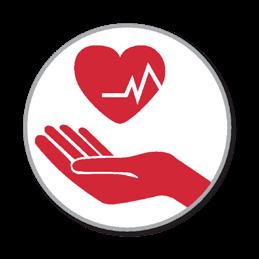
Students will construct a 3-bedroom house or stand-alone rental cabins. Students will learn about construction materials, tools and equipment, read blueprints and analyze, estimate, and plan residential buildings. Other projects may include students’ personal projects which they have the option to design and possibly build. Collaboration with local construction companies, colleges, and business partners will supplement the learning experience throughout the course. This course is held at Spring Lake Park High School and is a 2-hour block. As part of this course, students will also have the opportunity to attend off-site opportunities focused on different trades.
Co-Created Course: Pathways
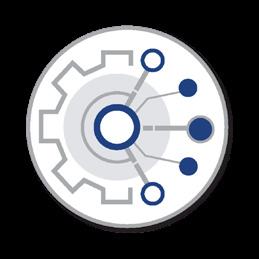
Course Number: 9720
Grade: 9, 10, 11, 12
Credits: 1, 2, or 3
Learning Mode: Individualized course – Students co-create their learning experience with a teacher to achieve identified academic and life competencies. Learning can happen in a variety of places and ways.
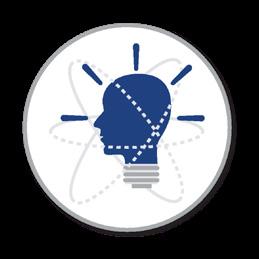
Type: Full Year or Trimester. Depends on the design of the learning plan
AVAILABLE
FOR
Create your own Pathways course by working closely with a teacher to achieve learning outcomes, earn high school credit and connect your learning to your passions outside of school and to your career and college goals. Students and teachers design the learning experiences together matched to the individual student’s learning performance level and preferences. Students follow their customized learning pathway supported and guided by the teacher. Learning goals are connected to clear, diverse, and engaging experiences that are based on content and life competencies. Through research, reading, listening, viewing, participating, and creating, students advance their learning and are able to demonstrate their learning when they are ready, rather than a predetermined time. Personalized
Grades: 12
Credit: 1 credit per trimester (1, 2, or 3 credits)
Type: 1, 2, 3 trimesters
42 I Spring Lake Park High School 2023-2024 Registration Guide
Apprenticeships & Career Exploration
Internships,
Course Numbers: 9800/9801/9802
This course includes formalized learning with instruction occurring at the school and at a community-based setting with an employer in the geographical region of the school. This is a collaborative endeavor between a student, his/her parents/guardians, an employer, and the school that engages students in real-world activities. Through school involvement and defined learning, students can earn school credit for the supervised real-world experiences outside the school building. This could include paid employment, job shadowing, internships (paid or unpaid), apprenticeship, on the job training, or site visits/tours to industry partners. ALL PATHWAYS: INTERNSHIPS, APPRENTICESHIPS & CAREER EXPLORATION
ELECTIVES: TECHNOLOGY, ENGINEERING & DESIGN PATHWAY
Spring Lake Park High School partners with neighboring districts for these courses. Please see the “Note:” section of each course below for details.
Welding 101
Course Numbers: 2145/2146 Grades: 10, 11, 12
Credits: 2 elective credits
Type: Two trimesters; 1 hour course
Note: This class is offered at Irondale High School and transportation will be provided from SLPHS
Experience the real world of welding through classroom handson simulations as well as actual welding projects. This course will give students an introduction to the basic welding processes and power sources used for each of the following: Arc Welding; Metal Inert Gas Welding; Oxyacetylene Welding and Cutting. Students will learn about shop and equipment safety rules in addition to the procedures to set-up, take-down, and troubleshoot these procedures as well as the welding equipment.
Students will build skills in the area of welding by operating the tools used in metal fabrication with proficiency to design and build their own structures or make repairs. Industry certified trainers will be available as guest speakers to ensure students are receiving “certified” training in welding safety and procedures. Welders are currently in high demand in the fields of construction, plumbing/pipefitting, manufacturing, the arts, and solar technology installation.
Welding and Small Engines 1
Course Number: 2160, 2161 Grades: 10, 11, 12
Credit: 2 Trimesters
Note: This class is offered at Centennial High School and transportation will be provided from SLPHS
Students in this course will learn about many manufacturing processes including teardown and reassembly of a 4-stroke small engine.
• Learn how to MIG weld, gas weld, and cut with torch.
• Learn how to use various hand tools for metal working and engine rebuilding applications, including grinders, wrenches, files, and screwdrivers. Complete a welding project.
• Tear down and reassemble 4 stroke engine labeling and identifying engine components and explaining process.
• Learn how to use a factory service manual to preform work on engine and look up specifications.
• Become OSHA 10 Hour General Industry Certified.
• Learn about soft skills and work ethics in industry.
• Certification: OSHA Certification
Welding and Small Engines 2 Course Number: 2162, 2163
Grades: 10, 11, 12
Credit: 2 Trimesters
Prerequisite: Welding and Small Engines 1 Note: This class is offered at Centennial High School and transportation will be provided from SLPHS
Students in this course will use knowledge and skills gained in Small Engines and Welding 1 to expand on their knowledge and skills in the area of manufacturing.
• Students will learn to solve problems and fabricate products using manufacturing processes which include machine tools, welders, plasma cutting, CNC machining. Students in this course will work through rotations in plasma cutting, advanced MIG, TIG, and CNC machining and complete projects demonstrating proficiency.
• Students will learn skills and techniques in:
• CNC machining
• Stick and TIG welding
• CNC Plasma Cutting
• Developing Projects Plans and Fabricating
Chemistry of Foods - Science Course Number: 2165, 2166, 2167
Grades: 10, 11, 12
Credit: 6 credits (3 trimester of Chemistry and 3 Trimester of elective credit). This is a full year course. Students will be scheduled for 2 periods each trimester
Recommendation: Prior completion of Physical Science. This course may be taken in place of Chemistry 1 and 2. Note: This class is offered at Centennial High School and transportation will be provided from SLPHS. Students who have already taken Chemistry 1 & 2 may enroll in this course. This course satisfies the requirement (in conjunction with Physical Science and Biology) for taking a third year of science.
Chemistry of Foods focuses on the scientific method to study the various relationships between food science, nutrition, and food preparation. Laboratory skills in measuring, recording, and analyzing data are used to explore these relationships. Experimental methods are employed to analyze food mixtures, food preservations, and complex food systems. Students are given insight into career possibilities as well as up to date information regarding technological advances and future trends in food preparation, preservation, evaluation, and utilization of food.
Students in this course will: Understand laboratory safety, measure precisely and convert among metric and standard unit systems, describe the properties of elements, compounds, and mixtures found in food production, prepare solutions and study their properties, and more.
HSregistration I 43
SpringLakeParkSchools.org/
Language Arts 9
Course Numbers: School-based - 1100 | Online - 5100 Grade: 9 Credits: 3
Learning Mode: School-based or Online Type: Full Year
Language Arts 9 allows students to explore many themes in literature by reading and analyzing short stories, nonfiction, poetry, drama and novels. This course balances direct instruction with opportunities multiple times per week for students to engage in discussions and work on projects related to texts we are reading. The ability to analyze literature and support ideas with specific, relevant proof is developed throughout the course. Additionally, students will continue to develop their writing skills through a variety of writing tasks that frequently offer choice.
Honors Language Arts 9
Course Numbers: School-based - 1103 | Online - 5103 Grade: 9 Credits: 3
Type: Honors credits; Full Year; Required – register for all three trimesters
Honors Language Arts 9 parallels the LA 9 course by exploring similar themes and selections. The ability to evaluate literature and support ideas with specific, relevant proof is stressed throughout the course. Enrichment activities include challenging reading selections and exercises in analytical and critical thinking. Students demonstrate mastery of learning targets via projects and develop writing skills. There is an expectation that each student enrolled in this course will read “The Book Thief” by Markus Zusak over the summer and complete the related assessment. The books will be issued by English teachers at the end of eight grade. Summer reading and assignment are to be completed before the start of course.
Note: Students are advised to consult with an English teacher before registering. To be successful in this course, students will demonstrate excellent comprehension while independently reading, use knowledge of academic writing skills and sentence structures, and work independently both in and out of school.
Language Arts 10
Course Numbers: School-based - 1110 | Online - 5110 Grade: 10
Credits: 3
Learning Mode: School-based or Online Type: Full Year
Prerequisite: Language Arts 9
Language Arts 10 focuses on the themes of choices, heroes, and identity. Students explore these themes in literature by reading short stories, non-fiction, poetry, drama, and novels. The course also features creative writing and independent research - all of which are intended to best prepare students for the 11th and 12th grade curriculum.
Honors Language Arts 10
Course Numbers: School-based - 1113 | Online - 5113 Grade: 10
Credits: 3
Learning Mode: School-based or Online Type: Honors credits; Full-year
Students in this course demonstrate excellent comprehension while independently reading, and the ability to self-regulate their learning both in and out of school. Honors Language Arts 10 parallels Language Arts 10 by exploring similar themes and selections. The course provides acceleration and enrichment to meet the needs of students who grasp concrete material quickly and who benefit from greater intellectual challenges. Enrichment activities include additional reading assignments, exercises in critical and analytical thinking and projects that require demonstration of mastery of the course content through application.
Note: A grade of C or better in HLA9; B or better in LA9 is highly recommended. Summer reading is to be completed before the start of the course. Students are advised to consult with an English teacher before registering.
Reading & Writing in the Digital Age Course Numbers: 1176/1177/1178 Grades: 10, 11, 12
Credits: 3, option for Honors English Language Arts Type: Full Year
Students will learn differently and explore a variety of perspectives with Reading & Writing in the Digital Age. Media Literacy, social media, social justice, digital media communications, website creation, viral videos, escape rooms, and e-sports are some of the ways students will learn about communications, problem-solving, and becoming a critical consumer.
Students will also examine texts and language through the lens of technology and its impact on the way we write, speak, and learn information. Students will also gain the necessary skills of public speaking, small-group communication, and presentation of research as part of this class. Using nonfiction and fiction texts, students will engage in discussion and analysis of human communication in today’s modern world. Students have the option to take this course as a general or honors course.
44 I Spring Lake Park High School 2023-2024 Registration Guide
CORE COURSES: LANGUAGE
ARTS
Language Arts 11
Course Numbers: School-based - 1120/1121/1122 | Hybrid - 1162/1163/1164 | Online - 5156/5157/5158
Grade: 11
Credits: 3; Option for Honors English Language Arts Type: Full year; Required - register for all three trimesters. Prerequisite: Language Arts 10
In this year-long course, students will engage in teacher-led and independent practice lessons in order to become proficient in the course competencies. Some of these competencies are Author’s Craft, Argumentative Writing, Discussion, and Media Maker. Students will demonstrate their proficiency in the course competencies through authentic performance assessments. This course will use a gradual release model where students will have more opportunities for independence as they demonstrate their readiness.
Our first unit is largely teacher-led as we read excerpts from The Scarlet Letter or classic and contemporary short fiction as a class and focus on cancel culture. Our second unit focuses on different methods to effect social change and concludes with small groups engaging in a debate. Our third unit offers students a lot of choice in the texts they read and the issues they want to focus on. Students will synthesize what a range of both fiction and non-fiction texts seem to be saying about their chosen issues and use this to create PSA videos. During trimester three, students will essentially create their own units by selecting texts, competencies, and a menu of options for lessons and performance assessments.
Honors Credit: Students have the option to earn honors credit for this course without a separate registration by exceeding proficient on a number of competencies.
College Writing and Critical Reading – ARCC Course Numbers: 1133/1134/1135
Grade: 11, 12 Credits: 3
Type: Honors credits; Full Year; register for all three trimesters Prerequisite: Language Arts 10/11 or Honors Language Arts 10/11 with a recommended grade of a B- or higher and meeting the eligibility and placement requirements
Post-Secondary Connection: This course is taught concurrently with Anoka-Ramsey Community College at Spring Lake Park High School. Upon successful completion, students will earn four college credits in English (ENGL1121), fulfilling Minnesota Transfer Curriculum Goal 1a and 2, Communication and Critical Thinking. Students must enroll for both high school and college credit and must apply to the college before formal coursework commences; they must meet concurrent enrollment eligibility standards to take this class.
College Writing and Critical Reading provides extended practice in writing, the writing process, critical analysis of complex texts, and principles of effective written communication. Coursework includes focused instruction in methods of writing, revision, outlining, and reading analysis. Multiple essays are included in the coursework, as well as short writing and analysis assignments, discussion, and presentations. Students will compose and explore fiction and non-fiction texts and write in a variety of styles, effectively implementing writing and analysis skills to create effective papers, articles, professional documents, summaries, and other written work. Students are required to complete much of their work independently to meet deadlines.
ARCC - Anoka Ramsey Community College Classes
If taking the course for college credit, eligibility and placement requirements for the school year are as follows:
•
2.6 Unweighted GPA for Juniors or Seniors, OR
• Being in the top 1/3 of the class as a junior and top 1/2 of the class as a senior, OR
• Having a passing score on a National Test: Accuplacer Reading Assessment (54 or higher), or ACT Reading (21 or higher), or MCA reading (1047 or higher).
HSregistration I 45
SpringLakeParkSchools.org/
CORE COURSES: LANGUAGE ARTS
12x12
AP English Language and Composition
Course Numbers: School-based - 1126/1127/1128 |
Online - 5126/5127/5128
Grade: 11 Credits: 3
Type: Honors credits; Full year, register for all three trimesters. Post-Secondary Connection: College credit is possible upon completion of and earning a 3 or more on the AP exam in May.
The AP English Language and Composition course cultivates the reading and writing skills that students need for college success and for intellectually responsible civic engagement. Students cultivate their understanding of writing and rhetorical arguments through reading, analyzing, and writing texts as they explore rhetorical and thematic topics. The course, and AP exam, are skills-based and a variety of nonfiction texts will be used to learn rhetorical analysis, claims and evidence, reasoning and organization, and style. Students will engage in a variety of learning experiences including short lectures, discussion, reading annotation, collaborative projects, creative projects, process essays, timed writing, and frequent reflection. There is a balance of individual, collaborative, and teacherled experiences that are both synchronous and asynchronous throughout the course.
Note: A grade of A or B in Honors level English 10 is highly recommended. Students should be capable and willing readers and have good working vocabulary. Summer reading will be completed before the start of this course. Three terms of AP English will fulfill all academic requirements for 11th grade students.
English Research & CommunicationHybrid - ARCC Course Numbers: 1173/1174/1175
Grades: 11, 12 Credits: 3 credits; option for 3 college credits in CMST 1110 at Anoka-Ramsey Community College Type: Full Year, required, two-hour block to include Marketing & Entrepreneurship, register for all three trimesters Post-Secondary Connection: This is an Anoka Ramsey Community College course taught at Spring Lake Park High School. Students will earn three credits for CMST 1110 -Introduction to Communication, upon successful completion. This course helps fulfill Minnesota Transfer Curriculum Goals 1 and 2, Communication and Critical Thinking. Students may enroll for both high school and college credit. If students want to earn Anoka Ramsey Community College credit, they must meet concurrent enrollment eligibility standards to take this class.
*This class is part of a larger Business & Innovation course. Students who register for this as their English Language Arts class will also need to register for the Marketing & Entrepreneurship class.
ARCC -
Anoka
Ramsey Community College Classes
If taking the course for college credit, eligibility and placement requirements for the school year are as follows:
• 2.6 Unweighted GPA for Juniors or Seniors, OR
• Being in the top 1/3 of the class as a junior and top 1/2 of the class as a senior, OR
• Having a passing score on a National Test: Accuplacer Reading Assessment (54 or higher), or ACT Reading (21 or higher), or MCA reading (1047 or higher).
Students will earn a full-year of elective business credit in the Marketing & Entrepreneurship class and earn one of their required English Language Arts credits in the English Research & Communication course. The class will operate in a doubleblock to allow flexibility for each day so students can engage in company projects, travel to local businesses, and participate in field experiences. In the past, students worked on company projects with partners such as National Sports Center, Urban Air, Infinite Campus and Rise nonprofit. This class will follow a hybrid model, meeting face-to-face on Mondays, Wednesdays and Fridays, allowing for online or project learning on Tuesdays and Thursdays.
In Marketing & Entrepreneurship, students will learn advanced marketing concepts and an approach to entrepreneurship that emphasizes design thinking and the “lean startup” model. In the first half of the year, students will work in teams on real consulting projects for local companies. In the second half of the year, students will create a business plan and participate in a shark-tank style entrepreneurship competition for an idea, product, or service.
In English Research & Communication, students are introduced to fundamental elements and models of communication, basic theory, interpersonal communication, small group communication and public speaking. Students will study persuasion, cultural competency, professional communication and read both fiction and nonfiction texts relevant to leadership. Students will engage in a variety of learning experiences including short lectures, discussion, collaborative projects, speeches, essays, and reflection. There is a balance of individual, collaborative, and teacher-led experiences that are both synchronous and asynchronous throughout the course.
46 I Spring Lake Park High School 2023-2024 Registration Guide
CORE COURSES: LANGUAGE ARTS 12x12 12x12
COURSES: LANGUAGE ARTS
Language Arts 12 A & B
Course Numbers: School-based - 1130/1131 |
Hybrid - 1180/1181
Grade: 12
Credits: 2
Type: Register 12A & 12B and an elective Prerequisite: Language Arts 11
Students will explore works of fiction and non-fiction drawn from various sources of world literature. Students will read and think critically about each work as they prepare to respond in writing and engage in class discussion. Students will complete an argumentative persuasive research paper. Students will explore and analyze a movie as a text and write a critique and evaluation of the film. A large component of this course is the production of a variety of written works in preparation for career and college writing demands. Students will work independently, with the instructor, and with one another to become more confident, skillful readers and writers.
12A focuses on reading and responding to longer pieces of fiction including a novel from the mystery genre. Smaller units include poetry, editorial cartoon analysis, and interpretation and understanding of an event presented as a movie
12B focuses on argumentative persuasive research papers and short stories. Smaller units include film analysis and comparison and contrast between two pieces of literature.
Language Arts 12 A, B & C – Online
Course Numbers: Online - 5159/5160/5161
Grade: 12
Credits: 3
Type: Full Year; register for all three trimesters Prerequisite: Language Arts 11
Students will explore works of fiction and non-fiction drawn from various sources of world literature presented through various formats. Students will read, view, and think critically about each work as they interact with and respond to the form through different expressions including writing, speaking, and media presentations. Like a Humanities course, students will investigate the world through a variety of lenses to learn about and experience real-world connections. A large component of this course is the creation of a variety of products to prepare students for career and college demands of writing, reading, speaking, and presentation. Students will work independently, with the instructor, and with one another to become more confident and skilled readers, writers, and media producers.
AP English Literature and Composition
Course Numbers: School-based - 1136/1137/1138 | Online - 5136/5137/5138
Grade: 12
Credits: 3
Type: Honors credits; Full Year; register for all three trimesters Post-Secondary Connection: College credit is possible upon completion of and earning a 3 or more on the AP exam in May.
The AP English Literature and Composition course engages students in the careful reading and critical analysis of imaginative literature. Through the close reading of selected texts, students deepen their understanding of the ways writers use language to provide both meaning and pleasure for their readers. As they read, students consider a work’s structure, style and themes, as well as such smaller-scale elements as the use of figurative language, imagery, symbolism and tone. The course includes intensive study of representative works from various genres and periods, concentrating on works of recognized literary merit. There is an expectation that students will read Invisible Man by Ralph Ellison in the summer before 12th Grade.
Note: A grade of A or B in Honors-level course or an A or A- in previous English classes is highly recommended. Students should be capable and willing readers and have a good working vocabulary. Summer reading list is to be completed before the start of the course.
College Film Studies
Course Numbers: School-based - 1190/1191/1192 Grade: 12 Credits: 3
Type: Full Year; register for all three trimesters Post-Secondary Connection: This is an Anoka Ramsey Community College course taught at Spring Lake Park High School. Students will earn three credits for HUM 1103 -Introduction to Film Studies, upon successful completion. This course helps fulfill Minnesota Transfer Curriculum Goals 1 and 6, Communication and Humanities/Fine Arts. Students may enroll for both high school and college credit. If students want to earn Anoka Ramsey Community College credit, they must meet concurrent enrollment eligibility standards to take this class.
Film Studies is a full-year course which will explore the development of film, how novels and short stories are interpreted in film, and how directors use film to communicate with an audience. The course will involve reading a variety of texts including selections from various novels and plays, and short stories then analyzing how film interprets and alters those texts. Students will also research the history of film or a specific movie, and its development and create their own digital presentations using production values.
Note: This course is not approved for NCAA requirements for Division 1 and 2 athletes. Please work with your counselor if you need your course to be NCAA approved.
HSregistration I 47
SpringLakeParkSchools.org/
CORE
12x12
12x12
CORE COURSES: LANGUAGE ARTS
Creative Writing
Course Numbers: School-based - 1141 | Hybrid - 1183 |
Online - 5141 Grade: 12 Credit: 1
Type: Trimester; meets senior English elective requirement
Creative Writing will build on the basic techniques and structures of poetry, fiction, and creative non-fiction introduced to students in prior years. Short stories, poems, and essays will be used as models to examine with deeper analysis and used as guides for students to expand their creative writing tools. The analysis and exploration of a variety of works with the focus on the writer’s craft, students will have many opportunities to become the writer and to enhance their creativity, writing skills, and expression in their own original pieces. There is an opportunity for individual, collaborative, and teacher-led experiences throughout the course; however, most of the course includes individual writing.
Film Studies
Course Numbers: School-based - 1142 | Hybrid - 1184 Grade: 12 Credit: 1
Type: Trimester; meets senior English elective requirement
Focusing on the intersection between culture and the movies, Film Studies examines the evolution and expressive techniques of filmmaking. With the development and greater application of the concepts for the fundamentals, like the language of film, theories, techniques, and genre, students analyze a variety of films. Opportunities to investigate and show learning are available through written essays and a variety of options that could include videos, discussion boards, or spoken presentations. Students connect the language and techniques to develop and produce several projects that exhibit those, as well as the theories and genres throughout the trimester.
Note: This course is not approved for NCAA requirements for Division 1 and 2 athletes.
Journalism
Course Number: 1132
Grade: 11, 12
Credit: 1
Type: Trimester; meets senior English elective requirement
This course will introduce students to the fundamental elements of journalism and include the study of print, online and broadcast media. Major units of study will include reporting, writing, editing, photography, advertising, design, management, and teamwork. The history of journalism and the present-day realities of journalistic writing, broadcasting, podcasting, and blogging will complement the major units of study along with ethics and legal issues in journalism. Students will create a class and or school newspaper, podcast, and broadcast news features.
Theatre Course Number: 1144 Grades: 9, 10, 11, 12
Credit: 1
Type: Trimester; Meets Fine Arts Elective; does not meet senior English elective requirement
This course explores theatre from page to stage as a live performing art. Areas of study will include dramatic structure, theatrical representation and the crafts of theatre artists such as directors, designers, playwrights, actors and theatre tech. This course will also engage with live performances and video archives of past performances where and when available. Students will engage in a variety of performance-based activities and projects to gain experience and understanding of the theatre and its place in our world past and present.
Note: This course is not approved for NCAA requirements for Division 1 and 2 athletes.
Contemporary Literature Course Numbers: School-based - 1140 | Hybrid - 1182 | Online - 5140 Grade: 12 Credit: 1
Type: Trimester; meets senior English elective requirement
Contemporary Literature will allow students to explore a variety of recently written fiction, nonfiction, and poetry and analyze these works for a variety of purposes. Students will also write formal and informal responses to the literature in the course.
Co-Created Course: English Language Arts Course Number: 9711 Grade: 9, 10, 11, 12 Credits: 1, 2, or 3
Learning Mode: Individualized course – Students co-create their learning experience with a teacher to achieve identified academic and life competencies. Learning can happen in a variety of places and ways.
Type: Full Year or Trimester. Depends on the design of the learning plan
Create your own course in ELA by working closely with a teacher to achieve learning outcomes, earn high school credit and connect your learning to your passions outside of school and to your career and college goals. Students and teachers design the learning experiences together matched to the individual student’s learning performance level and preferences. Students follow their customized learning pathway supported and guided by the teacher. Learning goals are connected to clear, diverse, and engaging experiences that are based on content and life competencies. Through research, reading, listening, viewing, participating, and creating, students advance their learning and are able to demonstrate their learning when they are ready, rather than a predetermined time.
48 I Spring Lake Park High School 2023-2024 Registration Guide
MATHEMATICS
Quadratic Algebra
Course Numbers: School-based - 1200 | Online - 5200 Grade: 9 Credits: 3
Learning Mode: School-based or Online Type: Full Year Prerequisite: Middle School Algebra
This course continues the learning of the 8th grade Linear Algebra course, with a focus on skills and concepts that will help students complete competency-based performance assessments . Students will engage in both synchronous and asynchronous opportunities that require collaboration and problem solving to develop a deep conceptual understanding of linear, exponential, and quadratic functions and their applications in the world. Students will define and generalize patterns through multiple representations to make sense of solutions and mathematical information, recognizing that there are multiple strategies for solving problems.
Geometry
Course Numbers: School-based - 1203 | Online - 5203 Grade: 10 Credits: 3
Learning Mode: School-based or Online Type: Full Year Prerequisite: Quadratic Algebra
The course is structured around investigations that build spatial reasoning, promote problem-solving resilience, and form connections between real-life applications. The course emphasizes several big ideas in an integrated algebra-geometry context. The overarching themes of this course are: logical reasoning and proof, characteristics of and relationships between geometric shapes and patterns, and the usefulness of these concepts in our daily lives. Students will use various online tools for exploration, work in teams to discover new ideas, and demonstrate their learning through skills assessments and performance tasks.
Algebra 2
Course Numbers: School-based - 1206/1207/1208 | Online - 5206/5207/5208 Grades: 11, 12 Credits: 3
Type: Full Year; register for all three trimesters Prerequisite: Geometry
The course is structured around problems and investigations that build conceptual understanding of algebra topics. Students become comfortable with using general equations to represent functions and relations as well as with interpreting general equations to describe a situation. In particular, they develop the connections between and among the various core ideas of the course and will frequently use technology tools (such as Desmos) to support their learning. Students are encouraged to investigate, form conjectures, and then justify their thinking to develop their reasoning skills. In this course, students can expect to learn collaboratively through daily group activities, discussions, and independent practice. Students can expect to be assessed through skills assessments and performance assessments.
Algebra 2 + Trigonometry
Course Numbers: School-based - 1209/1210/1211 | Hybrid - 1238/1239/1240 | Online - 5209/5210/5211 Grades: 9, 10, 11,12 Credits: 3 Type: Full Year; register for all three trimesters Prerequisite: Geometry
This course covers all concepts taught in Algebra 2, but at a slightly faster pace. This allows for students to also explore circle trigonometry and learn basic skills needed to be successful in Pre-Calculus. The course is structured around problems and investigations that build conceptual understanding of algebraic topics. Students become comfortable with using general equations to represent functions and relations as well as with interpreting general equations to describe real-life situations. Students are encouraged to investigate, form conjectures, and justify their thinking to develop their reasoning skills. In this course, students can expect to learn collaboratively through daily group activities, discussions, and independent practice. Students can expect to be assessed through skills assessments and performance assessments.
SpringLakeParkSchools.org/ HSregistration I 49
CORE COURSES:
College Algebra – ARCC
Course Numbers: 1270/1271/1272
Grades: 11,12
Credits: 3
Type: Honors credits; Full Year; register for all three trimesters Prerequisite: Algebra 2 + Trigonometry with a grade of C+ or better.
Post-Secondary Connection: This is an Anoka Ramsey Community College course taught at Spring Lake Park High School. Students will earn three credits for MATH 1200 -College Algebra I, upon successful completion. This course helps fulfill Minnesota Transfer Curriculum 4, Mathematical/ Logical Reasoning. Students may enroll for both high school and college credit. If students want to earn Anoka Ramsey Community College credit, they must meet concurrent enrollment eligibility standards to take this class.
Topics include functions and function inverses; exponential and logarithmic functions; polynomial and simple rational functions; introduction to linear programming; systems of equations and inequalities; sequences and series; probability; and modeling. Recommended skills, abilities, or coursework: The completion of two years of high school algebra and one year of high school geometry is recommended.
Pre-Calculus - ARCC
Course Numbers: School-based - 1212/1213/1214 | Online - 5212/5213/5214
Grades: 10, 11,12
Credits: 3
12x12 12x12
Type: Honors credits; Full Year; register for all three trimesters. Prerequisite: Algebra 2 + Trigonometry and meeting the eligibility and placement requirements Post-Secondary Connection: This is an Anoka Ramsey Community College course taught at Spring Lake Park High School. Students will earn three credits for MATH 1210 -- Pre-Calculus, upon successful completion. This course helps fulfill Minnesota Transfer Curriculum 4, Mathematical/ Logical Reasoning. Students may enroll for both high school and college credit. If students want to earn Anoka Ramsey Community College credit, they must meet concurrent enrollment eligibility standards to take this class.
This course is designed to prepare students for a first course in calculus. The course develops basic understanding and manipulative skills that are essential for the study of calculus. Students will complete notes at home and spend the class period on hands-on engaging practice of the concepts. This student-centered instruction method will use a mixture of activities, collaborative discussion, real world application projects, and tests throughout this course. Topics include polynomial, rational, exponential, logarithmic, and trigonometric functions and their inverses; systems of equations and inequalities; matrices and determinants; trigonometric identities; equations and applications; parametric equations; polar coordinates; sequences and series; probability; conics and modeling.
AP Calculus Course Numbers: School-based - 1215/1216/1217 | Online - 5215/5216/5217 Grades: 11, 12 Credits: 3
Type: Honors credits; Full Year; register for all three trimesters Prerequisite: Pre-Calculus Post-secondary Connection: College credit possible upon successful completion of the AP Exam.
Calculus is designed for the highly advanced math student. It is a very desirable course for college-bound students, particularly those interested in a technical science or business career. Students will engage in a variety of activities, including daily practice, explorations, and formative as well as summative assessments. The goal of this course is to strengthen the reasoning and problem-solving skills for each student. At the end of this course students will have the opportunity to take the AP exam.
Note: It is recommended that students complete Pre-Calculus with a minimum of a C average.
12x12 12x12
AP Advanced Calculus Course Numbers: School-based - 1218/1219/1220 | Online - 5218/5219/5220 Grade: 12 Credits: 3 Type: Honors credits; Full Year; register for all three trimesters. Prerequisite: AP Calculus A and B Post-secondary Connection: College credit available upon successful completion of the AP Exam.
Advanced Calculus is designed to prepare students for the AP calculus examination (part BC). The year begins with a review of Calculus AB topics and then continues into the study of parametric and polar functions, sequences and series, and Taylor polynomials.
Note: It is recommended that students complete AP Calculus with a minimum of a B average.
ARCC - Anoka Ramsey Community College Classes
If taking the course for college credit, eligibility and placement requirements for the school year are as follows:
• CE Program Requirements: 2.6 Unweighted GPA for Juniors/Seniors OR being in the top 1/3 of the class as a junior or top ½ of the class as a senior AND
• Course Requirements: 2.8 Unweighted GPA for Juniors/Seniors AND high school Algebra II with a C or better.
50 I Spring Lake Park High School 2023-2024 Registration Guide
CORE COURSES:
MATHEMATICS
COURSES: MATHEMATICS
AP Statistics
Course Numbers: School-based - 1221/1222/1223 | Online - 5221/5222/5223 Grades: 11, 12
Credits: 3
Type: Honors credits; Full Year; register for all three trimesters Prerequisite: Algebra 2/Trig Post-secondary Connection: College credit possible upon successful completion of the AP Exam.
This course is for students who have completed their math requirements for graduation and are looking to continue their study of mathematics beyond what is required. Students in this class are likely considering a four-year college degree in areas such as business, science, or psychology. At the end of this course, students will have the opportunity to take the AP exam. Students will complete notes at home and spend the class period on hands-on engaging practice of the concepts. This student-centered instruction method will use a mixture of activities, collaborative discussion, real world application projects, and tests throughout this course.
Note: It is recommended that students complete all three core courses (Alg. 1, Geom., and Alg. 2) with a C average or higher.
Probability
Course Numbers: School-based - 1230 | Online - 5230 Grades: 11, 12
Credit: 1
Type: Trimester; elective Prerequisite: Algebra 2
This course will cover topics such as general counting techniques (fundamental counting, principle, factorials, permutations and combinations), representing probabilistic situations graphically (tree diagrams, Venn diagrams and twoway tables) experimental probability, conditional probability, expected value, multiplication and addition rules for probability, Baye’s Theorem, discrete probability distributions and measures of variability. This course is heavily centered in project-based learning. In their course projects, students will be analyzing board and casino games probabilistically.
Statistics
Course Numbers: School-based - 1231 | Online - 5231 Grades: 11, 12
Credit: 1
Type: Trimester; elective Prerequisite: Algebra 2
This course will introduce topics in statistical studies including displays of data (bar charts, line graphs, dot plots, cumulative frequency distributions, etc.), measures of central tendency and measures of variability. Statistical inference including confidence intervals and z and t tests will be covered.
Trigonometry
Course Numbers: School-based - 1232 | Online - 5232 Grades: 11, 12
Credit: 1
Type: Trimester; elective Prerequisite: Algebra 2
This course will cover topics including but not limited to right triangle trigonometry, to Law of Sines, Law of Cosine, the unit circle, graphs of basic trigonometric functions and their transformations as well as problem-solving using trigonometric ratios.
Co-Created Course: Math Course Number: 9712 Grade: 9, 10, 11, 12 Credits: 1, 2, or 3
Learning Mode: Individualized course – Students co-create their learning experience with a teacher to achieve identified academic and life competencies. Learning can happen in a variety of places and ways.
Type: Full Year or Trimester. Depends on the design of the learning plan
Create your own math course by working closely with a teacher to achieve learning outcomes and earn high school credit. You will connect your learning to your passions outside of school and to your career and college goals. Students and teachers design the learning experiences together matched to the individual student’s learning performance level and preferences. Students follow their customized learning pathway supported and guided by the teacher. Learning goals are connected to clear, diverse, and engaging experiences that are based on academic and life competencies. Through research, reading, listening, viewing, participating, and creating, students advance their learning and will demonstrate their learning when they are ready.
SpringLakeParkSchools.org/ HSregistration I 51
CORE
12x12
Physical Science
Course Numbers: School-based - 1500 | Online - 5500 Grade: 9 Credits: 3
Type: Full Year
Physical Science is a course designed to introduce students to the basic concepts in Physics and Chemistry that will prepare students for their future studies in Biology, Chemistry, and Physics. Learning targets include the metric system, atomic structure, periodic table, chemical reactions, acids and bases, waves, electricity and magnetism, and Newton’s laws of motion. Students will participate in labs, experiments, and hands-on activities.
Honors Physical Science
Course Numbers: School-based - 1503 | Online - 5503 Grade: 9 Credits: 3
Type: Honors credits
Honors physical science is a course designed to introduce major concepts in Physics and Chemistry that will prepare students for their future studies in Biology, Chemistry, and Physics. This course is recommended for students with very strong math skills and a history of success in science. Learning targets include the metric system, atomic structure, periodic table, chemical reactions, acids and bases, waves, electricity and magnetism, Newton’s laws of motion, forces, and energy. Students will participate in labs, experiments, and hands-on activities by using their mathematics to analyze phenomena and derive conclusions. This course is for the highly motivated student with strong math skills.
Note: A grade of B or higher in 8th grade science and math is highly recommended.
Biology
Course Numbers: School-based - 1510 | Online - 5510 Grade: 10 Credits: 3
Learning Mode: School-Based or Online (Students will choose one learning mode for all courses in 9th/10th grade - see School-Based and Online descriptions for more information)
Type: Full Year
Biology is a course designed to meet the MN State science standards. Course work will include: conducting scientific experiments, examining cell structures and functions, predicting the movement of molecules. Students learn how organisms make proteins (DNA), how traits are passed on (Genetics), How organisms obtain, use energy and pass on energy (Photosynthesis, Cellular Respiration, Ecology), and how organisms use behaviors to survive (Behavior). Instruction is a mixture of direct instruction and independent learning, there will be major project each trimester.
AP Biology
Course Numbers: School-based - 1513 | Online - 5513
Grades: 10, 11, 12
Credits: 3
Learning Mode: School-Based or Online (Students will choose one learning mode for all courses in 9th/10th grade - see School-Based and Online descriptions for more information)
Type: Honors credits; Full Year
Post-secondary Connection: College credit is possible upon completion of and earning a 3 or more on the AP exam in May. This academically rigorous course follows the Advanced Placement guidelines designed by the College Board.
AP Biology is a college level Biology course where students spend class time focused on labs, hands on activities and cooperative learning experiences to master unit concepts. This is a rigors course where students are expected to read and study outside of class. Successful learners are selfdirected learners, since not all content will be directly covered in class. The course follows the guide laid out by the College Board. Units covered in the first trimester include Chemistry of life and Cell Structure and Function, Cellular Energetics (Photosynthesis, Cellular Respiration and Enzymes), Cell Communication and Cell Cycle. Trimester 2 covers Heredity (Genetics), Gene Expression and Regulation (DNA), and Natural Selection. Trimester 3 includes 1 final unit, Ecology. The remaining time is spent reviewing for the exam in May. After completing this course, students will have gained study and reading skills that will greatly benefit them in their college courses and may earn college credit by taking the AP exam.
Note: A grade of B or higher in Physical Science, math, and language arts is highly recommended.
Chemistry Course Numbers: School-based - 1520/1521/1522 | Hybrid - 1506/1507/1508 | Online - 5520/5521/5522
Grades: 11, 12
Credits: 3
Type: Full Year; register for all three trimesters
Prerequisite: Student should be concurrently enrolled in a High School Algebra 2 or higher math course.
General chemistry is a course designed to fulfill the third year of science requirement. It focuses on the behavior of matter. In addition to improving a student’s chemistry knowledge, it also improves the student’s ability to think critically, as well as the student’s study habits and techniques. This is a problem solving, lab-oriented course for students. Although time will be given in class to complete work, mastery will require additional time spent outside of class.
52 I Spring Lake Park High School 2023-2024 Registration Guide
CORE COURSES: SCIENCE 12x12
CORE COURSES: SCIENCE
Honors Chemistry
Course Numbers: 1523/1524/1525
Grades: 11, 12
Credits: 3
Type: Honors credits; Full Year; register for all three trimesters Prerequisite: Student should be concurrently enrolled in a High School Algebra 2 + Trig or higher math course.
This course is for those students who are planning on going to college, especially those planning on a technical, math, or science-related career. This course covers all of the topics covered in General Chemistry but at a more rapid pace and includes additional content and a more detailed analysis of concepts and will prepare you for learning at the college level. This course is required to take AP chemistry next year. This class is intended for a highly motivated student with strong math skills. Students will be challenged to think critically, work both cooperatively and independently, and solve problems in both lab and classwork.
AP Chemistry
Course Numbers: School-based - 1526/1527/1528 | Online - 5533/5534/5535
Grade: 12
Credits: 3
12x12
Type: Honors credits; Full Year; register for all three trimesters
Prerequisite: Honors Chemistry & Algebra 2 + Trig Post-secondary Connection: College credit possible upon successful completion of AP Exam.
This academically rigorous course follows the Advanced This academically rigorous course follows the Advanced Placement course guidelines designed by the College Board. This course is designed to be the equivalent of a typical freshman college chemistry course. Students should expect to put in a collegelevel effort to be successful. Successful completion of Honors Chemistry is required to take this course. This includes independent learning and practice in addition to what is covered and assigned in class. An extensive amount of work in a college-level text book and assignments will be required. Class time will be spent on lecture and laboratory practice. Students should expect four-five hours a week of homework and study to be successful in this rigorous course.
AP Chemistry will deeply explore the concepts of atomic structure, compound structure and function, intermolecular forces and bonding, chemical reactions, kinetics, thermodynamics and its application, equilibrium and acids and bases.
Note: In order to be successful in AP Chemistry, it is recommended that students have a B or better in both Algebra 2/Trig and Pre-AP Chemistry.
Physics
Course Numbers: School-based - 1530/1531/1532 | Hybrid - 1556/1557/1558 | Online - 5530/5531/5532
Grades: 11, 12 Credits: 3
Type: Full Year; Register for all three trimesters; meets science requirement
Prerequisite: Student should be concurrently enrolled in a High School Algebra 2 with trigonometry or higher math course
Physics is a challenging course that will help students prepare for the rigor of college and sharpen their critical thinking and problem-solving skills. Students who enroll in physics should be highly motivated to learn and prepared to work hard. Most four-year universities want their applicants to have completed four years of science, with physics typically being the fourthyear course. Any student planning to continue their education beyond high school in STEM-related fields should take physics in order to be successful in physics at the college level. Topics that will be covered in physics include mechanics (velocity and speed, acceleration, forces and Newton’s Laws), work, energy and momentum, sound and light waves, electricity and magnetism.
AP Physics 1
Course Numbers: School-based - 1536/1537/1538 | Online - 5536/5537/5538
Grades: 11, 12 Credits: 3
12x12
Type: Honors credits; Full Year; register for all three trimesters; meets science requirement
Prerequisite: Completion of Algebra 2 + Trigonometry with a B average or higher is recommended.
Post-secondary Connection: College credit possible upon successful completion of AP Exam.
This academically rigorous course follows the Advanced Placement course guidelines designed by the College Board, and students should be prepared to work at the college level. AP Physics 1 prepares students for the AP Physics I test. The course covers Newtonian mechanics (including rotational dynamics and angular momentum), work, energy, simple harmonic motion, momentum, and fluids. This course develops high level critical thinking and analysis skills. Students who enroll in AP Physics should be highly motivated and prepared to work very hard.
Reading from a college-level textbook will be required, and assignments will be given. Class time will be spent on lecture, laboratory and conceptual practice, as well as practice free of response questions. Students should expect 4-5 hours a week of homework and study to be successful in this rigorous course.
Note: In order to be successful in AP Physics 1, it is recommended that students have a B or better in both Algebra 2/Trig.
SpringLakeParkSchools.org/ HSregistration I 53
Physics
-
ARCC Course Numbers: 1560/1561/1562
Grades: 11, 12
Credits: 3
Type: Honors credits; Full Year; register for all three trimesters Prerequisite: Prerequisites (must have a grade of C or better): College Algebra – ARCC (MATH 1200) or concurrent enrollment or Pre-Calculus - ARCC MATH 1210 or passing ACCUPLACER score
Post-Secondary Connection: This is an Anoka Ramsey Community College course taught at Spring Lake Park High School. Students will earn five credits for PHYS 1317 -- General Physics 1, upon successful completion. This course helps fulfill Minnesota Transfer Curriculum 2, Natural Sciences. Students may enroll for both high school and college credit. If students want to earn Anoka Ramsey Community College credit, they must meet concurrent enrollment eligibility standards to take this class.
This course uses an algebra-based mathematical representation. Topics include kinematics, Newton’s laws of motion, energy, momentum, rotational motion, fluids, gravitation, oscillations and waves, and thermodynamics.
Applied Physics Course Numbers: 1543/1544/1545 Grades: 11, 12 Credits: 3
Type: Full Year; register for all three trimesters; meets physics science requirement
Prerequisite: Student should be concurrently enrolled in a High School Algebra 2 or higher math course.
Applied Physics offers the subject matter of a traditional physics course but is designed to involve less mathematics than a traditional Physics course. The format includes hands-on experiences, experimentation, discussion, graphing, problem solving, and computer simulation. There are also projects that demonstrate students’ mastery of course materials. General areas of study will include motion, forces, waves, light, sound, electricity and magnetism.
College Environmental Science - Hybrid
Course Numbers: 1540/1541/1542
Grades: 11, 12
Credits: 3 high school credits and 4 college credits
Type: Full Year; honors credits
Prerequisite: 3 years of high school science completed with a recommended minimum of a B average in the most recent or cumulative.
Post-secondary Connection: Successful completion of this course will result in four college credits from Bethel University.
This college course is an introduction to environmental studies, including interrelationships and interactions of humans with the natural environment in which they live. The focus will be the causes of and potential solutions to environmental problems like overpopulation; pollution of water, air, and soil; extinction of wildlife; and degradation of natural and human ecosystems are examined, using the science of ecology as a knowledge base. Many of the topics studied will revolve around the use, abuse, and care that we provide our earth.
Students will develop a deeper understanding of their own responsibility towards stewardship of the earth through discussions and activities within this course. Students will employ their knowledge of foundational biology, chemistry, and physics to explore the factors affecting natural cycles, species interactions, populations, pollution, climate change, and the role that alternative energy plays in helping us move closer to being a green planet. The Hybrid Biology format will have two-three days a week of independent classwork, with students working through lessons and activities on their own with the teacher available for help. All content lectures are available for viewing or review at any time. If we are operating in our online format the course will have live lectures 2 days per week with an optional third day of live class participation for discussions, virtual labs, or other necessary activities. The class will hold some live outdoor lab sessions, weather permitting. In either format, hybrid or online, students are expected to stay up with the workload, turn in all assignments on time, interact with the instructor if they have questions or need help, and study for quizzes and exams.
This course is worth four credits (course is three and lab is one) and both components are blended together in the week’s work. The grades from both portions will be averaged into one grade for the trimester and then both trimester grades, as well for the final Bethel University grade. The four credits will be in two parts, 3 for the lecture portion and 1 for the lab portion. The grades on a student’s Bethel transcript will also reflect the two separate parts of the course. The Bethel designation for these are ENS 104 and ENS 104D if you choose to investigate further details of the course description. Successful completion of this course will result in four college credits from Bethel University. Students will be officially enrolled through Bethel University and must officially drop or withdraw should they decide to discontinue the course at any time after enrollment in the first week of September.
54 I Spring Lake Park High School 2023-2024 Registration Guide
CORE COURSES: SCIENCE
12
x12 12x12
CORE COURSES: SCIENCE
Co-Created Course: Science
Course Number: 9715
Grade: 9, 10, 11, 12
Credits: 1, 2, or 3
Learning Mode: Individualized course – Students co-create their learning experience with a teacher to achieve identified academic and life competencies. Learning can happen in a variety of places and ways.


Type: Full Year or Trimester. Depends on the design of the learning plan
Create your own course in Science by working closely with a teacher to achieve learning outcomes, earn high school credit and connect your learning to your passions outside of school and to your career and college goals. Students and teachers design the learning experiences together matched to the individual student’s learning performance level and preferences. Students follow their customized learning pathway supported and guided by the teacher. Learning goals are connected to clear, diverse, and engaging experiences that are based on content and life competencies. Through research, reading, listening, viewing, participating, and creating, students advance their learning and are able to demonstrate their learning when they are ready, rather than a predetermined time.
ARCC - Anoka Ramsey Community College Classes
If taking the course for college credit, eligibility and placement requirements for the school year are as follows:
• CE Program Requirements: 2.6 Unweighted GPA for Juniors/Seniors OR being in the top 1/3 of the class as junior or top ½ of the class as senior AND
• Course Requirements: 2.8 Unweighted GPA for Juniors/Senior I with a C or better Prerequisites (must have a grade of C or better): College Algebra – ARCC (MATH 1200) or concurrent enrollment or Pre-Calculus - ARCC MATH 1210 or passing ACCUPLACER score.
SpringLakeParkSchools.org/ HSregistration I 55
CORE COURSES: SOCIAL STUDIES
Human Geography + Civics
Course Numbers: School-based - 1600 | Online - 5600 Grade: 9 Credits: 3
Type: Full Year
First and second trimester, students will be engaged in Human Geography; a required course for all ninth graders. The course is divided into six basic units with key geographical skills included in each unit of study. The units are: population geography, cultural geography, political geography, urban geography, economic geography, and agricultural geography. Third trimester, students will learn about civic participation in the United States of America and the early formation of the American system of government and its handbook, the Constitution. The units of study are: American political culture, Declaration of Independence, Bill of Rights, and The Constitution.
AP Human Geography + Civics
Course Numbers: School-based - 1603 | Online - 5603 Grade: 9 Credits: 3
Type: Honors credits; Full Year Post-secondary Connection: College credit possible upon successful completion of AP Exam.
The purpose of the AP Human Geography course is two-fold. First, students will study the patterns and processes of human activity on the earth’s surface. The secondary purpose in the course is to train the students to develop an elevated level of reading, writing, and analytical skills needed for the AP classes students will experience as they continue in high school. Students employ spatial concepts and landscape analysis to examine human social organization and its environmental consequences. The main areas of study are the nature and perspectives of geography, population, cultural patterns and processes, the political organization of space, agricultural and rural land use, urbanization, industrialization, economic development, and social geographies of the modern world. This is a rigorous, college-level course. This course will consistently require outside of class study and preparation. Students will also learn about civic participation in the United States of America and the early formation of the American system of government and its handbook, the Constitution.
United States History
Course Numbers: School-based - 1610 | Online - 5610 Grade: 10
Credits: 3
Type: Full Year
This course provides a one-year survey of American history from the colonial era to the contemporary time period. Students learn about various political, economic, and social developments that have shaped the United States. The curriculum engages students in historical inquiry by emphasizing the analysis of primary sources, developing historical arguments or claims, and evaluating the reliability of historical evidence.
AP United States History
Course Numbers: School-based - 1613 | Online - 5613 Grades: 10, 11, 12
Credits: 3
Type: Honors credits; Full Year Post-secondary Connection: College credit possible upon successful completion of AP Exam.
This is a highly rigorous course that is taught at a fast pace. Students should be excellent readers and should expect reading assignments every night. The Advanced Placement Program in U.S. History is designed to provide students with the analytic thinking, reading, and writing skills necessary to deal critically with problems and materials in U.S. History. The program requires that students master a broad body of historical knowledge. Course expectations include significant reading demands of approximately 30 pages per week. The overall goal of the course is to prepare students for the AP U.S. History examination. It also provides an enriched experience in the study of America’s past by exploring different interpretations of historical events, interpreting primary sources, and analyzing historical evidence in order to support conclusions.
Note: It is recommended that students earn a “B” or better in mainstream geography or a grade of “C” or better in AP Human Geography.
Economics Course Numbers: School-based - 1622 | Hybrid - 1623 | Online - 5622 Grades: 11, 12 Credit: 1
Type: Trimester; required
This Economics course begins with an introduction of economics, including a review of the American free enterprise system. Students will then learn about markets, business and labor, and banking and finance in the microeconomics section. Next, they will learn about measuring economic performance, the government’s role in the economy, and international trade and development in the macroeconomics section.
56 I Spring Lake Park High School 2023-2024 Registration Guide
12x12
12x12
World History A/B
Course Numbers: School-based - 1630/1631 |
Hybrid - 1675/1676 | Online - 5630/5631
Grade: 11
Credits: 2 credits (you will also need to sign up for Economics)
Type: Two parts of a full year of coursework; register for World History A and B and Economics (1622)
This course provides a 2-trimester survey of World History from the development of Western Civilization in Greece and Rome to the contemporary time period in India and China. Students learn about various political, economic, and social themes in World History. The curriculum furthers student’s skills in historical inquiry by emphasizing the analysis of primary sources, developing historical arguments or claims, and evaluating the reliability of historical evidence.
Part A: This course investigates the history and the issues in the development of Western Civilization starting with the classical civilizations of Greece and Rome, then jumping to the Renaissance in the 14th Century and continuing through European nationalism in the 19th Century. Other areas of study include: European exploration, the political revolutions in England and France during the 17th and 18th centuries, and the Napoleonic Era. Students will analyze, evaluate and synthesize information gathered from primary and secondary sources to further develop their historical thinking skills.
Part B: This course investigates the history and issues in the development of the non-western world beginning around 600 CE and progressing into the 20th Century. The course begins with the foundation of Islam and ends with growth of communism in Russia and China. Other areas of study include: the Golden Age of China, Mongol expansion, kingdoms of Africa, impact of the Industrial Revolution, and Imperialism. Students will analyze, evaluate and synthesize information gathered from primary and secondary sources to further develop their historical thinking skills.
Modern World Civilizations I: 1500-1870 – ARCC Course Numbers: 1646/1647/1648
Grades: 11, 12
Credits: 3
Type: Honors credits; Full Year; register for all three trimesters Post-secondary Connection: This course is taught concurrently with Anoka-Ramsey Community College at Spring Lake Park High School. Upon successful completion, students will earn four college credits in History (HIST 1111), fulfilling Minnesota Transfer Curriculum Goal Goals 5 and 8, Hist/Soc/ Behav Sci, and Global Perspective. Students must enroll for both high school and college credit and must apply to the college before formal coursework commences; they must meet concurrent enrollment eligibility standards to take this class.
This course is a survey of world civilizations from about 1500-1870 emphasizing major historical transformations and processes that have shaped the interrelated global experience. Topics include Reformation, colonization, mercantile imperialism, Enlightenment, the French Revolution, 19th Century Liberalism, industrialization, urbanization, socialism, and nationalism as they have affected life in Europe, the Middle East, Asia, South America, and Africa. Students are required to complete work independently to meet deadlines.
Note: This course meets the World History requirement.
AP World History
Course Numbers: School-based - 1627/1628/1629 | Online - 5627/5628/5629 Grades: 11, 12 Credits: 3
Type: Honors credits; Full Year; register for all three trimesters Post-secondary Connection: College credit possible upon successful completion of AP Exam.
ARCC - Anoka Ramsey Community College Classes
If taking the course for college credit, eligibility and placement requirements for the school year are as follows:
• 2.6 Unweighted GPA for Juniors or Seniors, OR
• Being in the top 1/3 of the class as a junior and top 1/2 of the class as a senior, OR
• Having a passing score on a National Test: Accuplacer Reading Assessment (78 or higher), or ACT English (18 or higher).
The purpose of the course is to develop a greater understanding of the evolution of global processes and contacts in different types of human societies as far back as 8000 B.C.E. to the present. The course examines the causes and consequences of global change along with comparisons among major societies. The course emphasizes understanding relevant factual knowledge, interpreting major issues, and developing skills used to analyze differing types of historical evidence. Students must master a broad range of global historical knowledge about Africa, the Americas, Asia, Europe, and Oceania.
Emphasis will be given to building reading and writing skills that are used to support individual authentic conclusions.
Note: Students need to add Economics in grade 11 or 12. It is recommended that students pass AP US History or received a grade of “C” or higher in their US History class.
SpringLakeParkSchools.org/ HSregistration I 57
CORE COURSES: SOCIAL STUDIES 12x12
12x12
SOCIAL STUDIES
US Government
Course Numbers: School-based - 1620 | Hybrid - 1653 | Online - 5620
Grades: 11, 12
Credit: 1
Type: Trimester; required
This course will have students describe and compare important facts, ideologies, and concepts related to the U.S. government and politics. Students will be able to explain how citizens can participate in the political process, analyze the functions of the branches of the federal government, and describe the liberties they have as Americans. Students will also analyze relationships the U.S. has with foreign nations and the possible impacts that result from those relationships. Finally, students will apply their learnings of the U.S. government to current political issues and explain how the government impacts those issues and their lives.
AP Government & Politics
Course Numbers: School-based - 1624/1625 | Online - 5624/5625 Grade: 12 Credits: 2
12x12
Type: Honors credits; two trimesters (fulfills the Government requirement)
Post-secondary Connection: College credit possible upon successful completion of AP Exam.
The goal of this academically rigorous course is to prepare students for the AP United States Government and Politics examination. The Advanced Placement coursework for United States Government and Politics is designed to develop and apply analytical thinking skills to political processes. Students will evaluate and analyze government and political relationships. Students will be required to use textbook and essay readings, statistical data, and political satire to develop and defend political arguments.
Note: This course is recommended for students who have achieved: a passing grade in AP U.S. History, a C or better in one of our World History courses, or a C or better in Language Arts class. This course fulfills the requirements for the Government class and the senior elective.
Current Issues
Course Numbers: School-based - 1640 | Hybrid - 1656 | Online - 5640
Grades: 11, 12
Credit: 1
Type: Trimester; meets second Social Studies requirement for grade 12
Current Issues introduces students to various issues facing the world today. Students will explore global economic systems, human rights, world health, environmental issues, and the role of the United States and the United Nations in a changing world. News articles and news documentaries are used as resources for the class. The student is required to understand, interpret, analyze, and evaluate data presented through these sources. In addition to the 4 units of study, students will complete an individual research project on a topic of their choice.
Psychology
Course Numbers: School-based - 1641 | Hybrid - 1657 | Online - 5641 Grades: 11, 12 Credit: 1
Type: Trimester; meets second Social Studies requirement for grade 12
This course is about human thinking and behavior. Students learn something about who they are, where they are going, and why. The topics of the course focus on practical uses of psychology through the study of theories and experiments. Students get involved by engaging intellectually and emotionally in the activities of the class. Psychology is the science of human behavior and can help students understand themselves.
Sociology
Course Numbers: School-based - 1642 | Hybrid - 1670 | Online - 5681 Grades: 11, 12 Credit: 1
Type: Trimester; meets second Social Studies requirement for grade 12
This course contains a brief overview of the current theoretical approaches and an outline of the components of culture including subcultures and counter-cultures. Discussions of internalization of norms, sanctions, components of social structure, and types of groups, societies and bureaucracies are also presented.
58 I Spring Lake Park High School 2023-2024 Registration Guide
CORE COURSES:
AP Psychology + US Government Course Numbers: School-based - 1643/1644/1645 |
Online - 5643/5644/5645
Grades: 11, 12
Credits: 3
Type: Honors credits; Full Year; register for all three trimesters Post-secondary Connection: College credit possible upon successful completion of AP Exam.
This academically rigorous course follows the Advanced Placement course guidelines designed by the College Board. Students should be prepared to read daily and participate in all class activities. Course content provides an in-depth look into human thinking and behavior and prepares students for the terminology and technical writing skills necessary to pass the AP exam in the spring. Students learn about who they are, where they are going, and why. Topics of the course focus on practical uses of psychology through the study of theories and experiments. Students engage intellectually and emotionally in the activities of the class. Psychology is the science of human behavior; it helps students understand themselves and others. Units covering U.S. Government will also be included during the course of study. Students successfully completing all three trimesters will meet both the U.S. Government requirements and the social studies elective credit. Strong reading and writing skills are required.
Notes: The U.S. Government requirement will be met by completing all three trimesters of study.
Co-Created Course: Social Studies Course Number: 9716
Grade: 9, 10, 11, 12 Credits: 1, 2, or 3
Learning Mode: Individualized course – Students co-create their learning experience with a teacher to achieve identified academic and life competencies. Learning can happen in a variety of places and ways.

Type: Full Year or Trimester. Depends on the design of the learning plan
Create your own course in Social Studies by working closely with a teacher to achieve learning outcomes, earn high school credit and connect your learning to your passions outside of school and to your career and college goals. Students and teachers design the learning experiences together matched to the individual student’s learning performance level and preferences. Students follow their customized learning pathway supported and guided by the teacher. Learning goals are connected to clear, diverse, and engaging experiences that are based on content and life competencies. Through research, reading, listening, viewing, participating, and creating, students advance their learning and are able to demonstrate their learning when they are ready, rather than a predetermined time.
HSregistration I 59
SpringLakeParkSchools.org/
CORE COURSES: SOCIAL STUDIES 12x12
AVID: ADVANCEMENT VIA INDIVIDUAL DETERMINATION
For more information about this program, view page 13 of this guide.
Prerequisites for AVID
• Completed and approved
AVID 9
application and interview
• Concurrent enrollment in at least one course of rigor as determined by student ability
• 2.0 GPA or higher.
Course Numbers: 1924/1925/1926
Grade: 9
Credits: 3 per academic year (1 per trimester)
Type: Full Year, elective
AVID 9 is designed to support students as they transition from middle school to the rigorous courses of study offered at the high school level. Development of time management, study, note-taking, and collaborative leadership skills are taught alongside WICOR strategies, as these skills are the backbone of all classwork school-wide. Students will participate in a biweekly collaborative Tutorial process in order to gain a greater understanding of difficult subject matter from their content area coursework. Curricular items include goal-setting, college exploration, and higher-order writing skills. AVID students will work toward Spring Lake Park Career and Life Competencies, including self-direction, collaboration, critical thinking and communication as well as reading for insight.
AVID 10
Course Numbers: 1927/1928/1929
Grade: 10
Credits: 2 per academic year (Fall and Spring)
Type: 2 Trimesters, elective
In AVID 10, students continue to hone their 9th-grade career- and college-readiness skills while increasing their independence by individualizing organizational styles. In AVID 10, students increase their academic vocabularies through preliminary college and test preparation, critical reading and formal writing strategies, and continue to refine the biweekly tutorial process. Further exploration of post-secondary options are harbored by attending campus visits and hosting career and college guest speakers. AVID students will continue to hone their Spring Lake Park Career and Life Competencies, including self-direction, collaboration, critical thinking and communication as well as reading for insight.
Academic Center for Excellence (A.C.E.)
Course Number: See Counselor Grades: 9, 10, 11, 12|
Credit: 1
Type: Trimester; Elective Note: for 9th and 10th graders, A.C.E will be in their support hour
Academic Center for Excellence (A.C.E) is a course that focuses on improving various executive skills i.e., creating goals, monitoring progress, task initiation, planning and prioritizing. Students also focus on developing a growth mindset and other metacognitive skills. In this course, students are expected to complete daily course tasks and then they have time to get individual help on other course work.
AVID 11
Course Numbers: 1930/1931/1932
Grade: 11
Credits: 2 per academic year (Winter and Spring) Type: 2 Trimesters, elective AVID 11 focuses on the writing and critical thinking expected of first- and second-year college students. In addition to the WICOR-based academic focus of AVID, there are postsecondary preparation activities, such as college and career research, formal ACT preparation, and college applicationbuilding activities. The biweekly AVID Tutorial process gains independence during the eleventh-grade year, ultimately building to independent subject-based Collaborative Study Groups. AVID students will continue to hone their Spring Lake Park Career and Life Competencies, including self-direction, collaboration, critical thinking and communication as well as reading for insight.
AVID 12
Course Numbers: 1933/1934/1935
Grade: 12
Credits: 2 per academic year (Fall and Winter) Type: 2 Trimesters, elective AVID 12 focuses on building the skills of higher-level writing, speaking, and critical thinking expected of first- and secondyear college students. In addition to the WICOR-based academic focus of AVID, there are college-bound activities, methodologies, and important action items that should be completed during the senior year which support students’ individualized application to post-secondary institutions and academic scholarships. AVID 12 students continue to take ownership of their agency and leadership skills by collaboratively studying for expected rigorous courses, creating post-secondary curricular projects, and partnering in service-learning and leadership opportunities. AVID students will continue to hone their Spring Lake Park Career and Life Competencies, including self-direction, collaboration, critical thinking and communication as well as reading for insight.
9th/10th grade support
Course Number: By Recommendation Grades: 9, 10 Credits: 1 credit per trimester (1, 2, or 3 credits)
Support is focused on getting additional time from the teachers they have for math, language arts, social studies, and science. Support is focused on pre-teaching, re-teaching, and organizational skills to help students be successful in class. Students can access each of their core teachers to get additional time to master the learning outcomes for the course.
60 I Spring Lake Park High School 2023-2024 Registration Guide
WAIVE COURSES: CREDITS FOR PRIOR LEARNING
For more information about requests for Credits for Prior Learning, view page 10 of this guide.
Credit by Portfolio Course Number: See Counselor for Personalized Learning Grades: 9, 10, 11, 12
A portfolio submission allows a student to demonstrate evidence of competency of standards collected by the student and presented to staff to review. Earning credit through a portfolio submission will require successfully submitting evidence that demonstrates mastery of the course content competencies, and must allow for observable, authentic assessment of learning that can be verified by an expert in the field of study, and validated by a school official. The activities and expectations of the prior learning experience must be at the same level of rigor and expectations as the competencies assessed in the regular school setting. Evidence in the portfolio may include:
• Letters of support and explanation from individuals or organizations who have actually witnessed the student’s demonstration of the content competencies;
• Oral or written interviews;
• Actual performances or demonstrations assessed by district staff or others knowledgeable in the specifications of the content competencies (this could include participation in varsity sport or its equivalent);
• Work samples, videos, exhibitions, and/or other evidence as appropriate for the individual situation.
Credit by Assessment Course Number: See Counselor for Personalized Learning Grades: 9, 10, 11, 12
Students are able to demonstrate the course content competencies prior to enrollment of a course by taking an examination. The examination process allows a student to demonstrate evidence of competency of standards through a process administered by school district staff.
• Advanced Placement exam score of 3 or better
• College Level Examination Program (CLEP) passing score
• Spring Lake Park High School course summative assessment score of 80% or greater
916 CAREER AND TECHNICAL OFFERINGS
Spring Lake Park Schools is a member of Intermediate District 916 along with 13 other school districts. Through this partnership, Spring Lake Park High School students have access to 916’s Career and Tech offerings. These include 20 programs that give high school students professional skills, industry certifications, and in many programs, college credit. These courses give students a start on post-secondary success while earning high school elective credit. Students attend for 105 minutes and spend the remainder of their day at their home high school taking their required core classes. Courses include:
• Cosmetology: General, 3 to 12 credits
• Cosmetology: Nail Technology & Esthiology (skin), 12 credits
• Hospitality Careers: Intro (grade 10-12)
• Automotive and Welding Careers: Intro, 4 credits
• Diesel Trucks and Engine Technology: 7 credits at DCTC
• Animal Science and Natural Resources: 6 credits
• Automotive Technology: Up to 14 credits
• Criminal Justice and Law Enforcement: 9 credits
• Dental Careers: (grade 12), 9 credits
• Phlebotomy: (grade 12)
SpringLakeParkSchools.org/ HSregistration I 61
Students have the opportunity to waive a course, or receive course credit, for knowledge they acquire outside the standard course curriculum. The experience must meet current Minnesota academic standards.
LISTING: HYBRID COURSES
• Algebra 2 + Trigonometry
• Chemistry
• Child Development 1
• Child Development 2
• College Environmental Science - Hybrid
• Contemporary Literature
• Creative Writing
• Current Issues
• Economics
• English Research & CommunicationHybrid
• Film Studies
LISTING: ONLINE COURSES
• Accounting 1
• Accounting
• Algebra 2
• Algebra 2 + Trigonometry
• AP Advanced Calculus
• AP Biology
• AP Calculus
• AP Chemistry
• AP English Language and Composition
• AP English Literature and Composition
• AP Government & Politics
• AP Human Geography + Civics
• AP Physics 1
• AP Psychology + US Government
• AP Statistics
• AP United States History
• AP World History
• Art Foundations 1
• Art Foundations 2
• Biology
• Chemistry
• Child Development 1
• Child Development 2
• Contemporary Literature
• Creative Writing
• Current Issues
• Digital Art & Design
• Economics
• Fit for Life
• Fit for Life - Online (Summer 2022)
• Foundations of Business
• Foundations of Fitness
• Fit for Life
• Foundations of Fitness
• Language Arts 11
• Language Arts 12 A & B
• Marketing & Entrepreneurship - Flex (Hybrid)
• Physics
• Psychology
• Sociology
• US Government
• Weight Training - Flex (Hybrid)
• World History A/B
• Foundations of Fitness - Online (Summer 2023)
• Geometry
• Health
• Health - Online (Summer 2023)
• Honors Language Arts 10
• Honors Language Arts 9
• Honors Physical Science
• How to Make Almost Anything
• Human Geography + Civics
• Intro to Coding
• Intro to Photography
• Language Arts 10
• Language Arts 11
• Language Arts 12 A, B & C– Online
• Language Arts 9
• Personal Money Management
• Physical Science
• Physics
• Pre-Calculus - ARCC
• Probability
• Psychology
• Quadratic Algebra
• Sociology
• Spanish 1
• Spanish 2
• Sports and Entertainment Marketing
• Statistics
• Trigonometry
• United States History
• US Government
• World History A/B
62 I Spring Lake Park High School 2023-2024 Registration Guide
Career College Life Interests Strengths Support Personalized Learning Art Health Physical Education Math Language Arts Science Social Studies Economics Athletics Activities Leadership Clubs Graduation World Language Readiness Business and Entrepreneurship Technology, Engineering & Design Health and Human Services Career Pathways Earning College Credit 12x12 AVID Spanish Immersion Online Courses Schedule Exploration Partnerships Opportunities Collaboration Teamwork Requirements Advanced Placement Mentorship Teaching Opportunities in Emergency Care Life Skills FCCLA Theater #SLPPantherProud Career College Life Interests Strengths Support Personalized Learning Art Health Physical Education Math Language Arts Science Social Studies Economics Athletics Activities Leadership Clubs Graduation World Language Readiness Business and Entrepreneurship Technology, Engineering & Design Health and Human Services Career Pathways Earning College Credit 12x12 AVID Spanish Immersion Online Courses Schedule Exploration Partnerships Opportunities Collaboration Teamwork Requirements Advanced Placement Mentorship Teaching Opportunities in Emergency Care Life Skills FCCLA Theater #SLPPantherProud Career College Life Interests Strengths Support Personalized Learning Art Health Physical Education Math Language Arts Science Social Studies Economics Athletics Activities Leadership Clubs Graduation World Language Readiness Business and Entrepreneurship Technology, Engineering & Design Health and Human Services Career Pathways Earning College Credit 12x12 AVID Spanish Immersion Online Courses Schedule Exploration Partnerships Opportunities Collaboration Teamwork Requirements Advanced Placement Mentorship Teaching Opportunities in Emergency Care Life Skills FCCLA Theater #SLPPantherProud Career College Life Interests Strengths Support Personalized Learning Art Health Physical Education Math Language Arts Science Social Studies Economics Athletics Activities Leadership Clubs Graduation World Language Readiness Business and Entrepreneurship Technology, Engineering & Design Health and Human Services Career Pathways Earning College Credit 12x12 AVID Spanish Immersion Online Courses Schedule Exploration Partnerships Opportunities Collaboration Teamwork Requirements Advanced Placement Mentorship Teaching Opportunities in Emergency Care Life Skills FCCLA Theater #SLPPantherProud Career College Life Interests Strengths Support Personalized Learning Art Health Physical Education Math Language Arts Science Social Studies Economics Athletics Activities Leadership Clubs Graduation World Language Readiness Business and Entrepreneurship Technology, Engineering & Design Health and Human Services Career Pathways Earning College Credit 12x12 AVID Spanish Immersion Online Courses Schedule Exploration Partnerships Opportunities Collaboration Teamwork Requirements Advanced Placement Mentorship Teaching Opportunities in Emergency Care Life Skills FCCLA Theater #SLPPantherProud Career College Life Interests Strengths Support Personalized Learning Art Health Physical Education Math Language Arts Science Social Studies Economics Athletics Activities Leadership Clubs Graduation World Language Readiness Business and Entrepreneurship Technology, Engineering & Design Health and Human Services Career Pathways Earning College Credit 12x12 AVID Spanish Immersion Online Courses Schedule Exploration Partnerships Opportunities Collaboration Teamwork Requirements Advanced Placement Mentorship Teaching Opportunities in Emergency Care Life Skills FCCLA Theater #SLPPantherProud Career College Life Interests Strengths Support Personalized Learning Art Health Physical Education Math Language Arts Science Social Studies Economics Athletics Activities Leadership Clubs Graduation World Language Readiness Business and Entrepreneurship Technology, Engineering & Design Health and Human Services Career Pathways Earning College Credit 12x12 AVID Spanish Immersion Online Courses Schedule Exploration Partnerships Opportunities Collaboration Teamwork Requirements Advanced Placement Mentorship Teaching Opportunities in Emergency Care Life Skills FCCLA Theater #SLPPantherProud Career College Life Interests Strengths Support Personalized Learning Art Health Physical Education Math Language Arts Science Social Studies Economics Athletics Activities Leadership Clubs Graduation World Language Readiness Business and Entrepreneurship Technology, Engineering & Design Health and Human Services Career Pathways Earning College Credit 12x12 AVID Spanish Immersion Online Courses Schedule Exploration Partnerships Opportunities Collaboration Teamwork Requirements Advanced Placement Mentorship Teaching Opportunities in Emergency Care Life Skills FCCLA Theater #SLPPantherProud Career College Life Interests Strengths Support Personalized Learning Art Health Physical Education Math Language Arts Science Social Studies Economics Athletics Activities Leadership Clubs Graduation World Language Readiness Business and Entrepreneurship Technology, Engineering & Design Health and Human Services Career Pathways Earning College Credit 12x12 AVID Spanish Immersion Online Courses Schedule Exploration Partnerships Opportunities Collaboration Teamwork Requirements Advanced Placement Mentorship Teaching Opportunities in Emergency Care Life Skills FCCLA Theater #SLPPantherProud Career College Life Interests Strengths Support Personalized Learning Art Health Physical Education Math Language Arts Science Social Studies Economics Athletics Activities Leadership Clubs Graduation World Language Readiness Business and Entrepreneurship Technology, Engineering & Design Health and Human Services Career Pathways Earning College Credit 12x12 AVID Spanish Immersion Online Courses Schedule Exploration Partnerships Opportunities Collaboration Teamwork Requirements Advanced Placement Mentorship Teaching Opportunities in Emergency Care Life Skills FCCLA Theater #SLPPantherProud Career College Life Interests Strengths Support Personalized Learning Art Health Physical Education Math Language Arts Science Social Studies Economics Athletics Activities Leadership Clubs Graduation World Language Readiness Business and Entrepreneurship Technology, Engineering & Design Health and Human Services Career Pathways Earning College Credit 12x12 AVID Spanish Immersion Online Courses Schedule Exploration Partnerships Opportunities Collaboration Teamwork Requirements Advanced Placement Mentorship Teaching Opportunities in Emergency Care Life Skills FCCLA Theater #SLPPantherProud Career College Life Interests Strengths Support Personalized Learning Art Health Physical Education Math Language Arts Science Social Studies Economics Athletics Activities Leadership Clubs Graduation World Language Readiness Business and Entrepreneurship Technology, Engineering & Design Health and Human Services Career Pathways Earning College Credit 12x12 AVID Spanish Immersion Online Courses Schedule Exploration Partnerships Opportunities Collaboration Teamwork Requirements Advanced Placement Mentorship Teaching Opportunities in Emergency Care Life Skills FCCLA Theater #SLPPantherProud Career College Life Interests Strengths Support Personalized Learning Art Health Physical Education Math Language Arts Science Social Studies Economics Athletics Activities Leadership Clubs Graduation
HSregistration I 63
SpringLakeParkSchools.org/
Historically, approximately 85 percent of Spring Lake Park High School students participate in at least one athletic or co-curricular activity.

The high school currently offers 15 girls’ sports and 15 boys’ sports.
Fall Athletics Winter Athletics Spring Athletics
• Adapted Hockey – Co-Ed
• Alpine Skiing – Co-Ed
• Adapted Soccer – Co-Ed
• Cross Country – Boys
• Cross Country – Girls
• Football
• Soccer – Boys
• Soccer – Girls
• Swim and Dive – Girls
• Tennis – Girls
• Volleyball
• Basketball – Boys
• Basketball – Girls
• Dance Team
• Gymnastics – St. Anthony
• Hockey – Boys
• Hockey – Girls - Centennial
• Nordic Ski – Boys
• Nordic Ski – Girls
• Swim and Dive – Boys
• Wrestling – Irondale
• Adapted Bowling – Co-Ed

• Adapted Softball
• Baseball
• Golf – Boys
• Golf – Girls
• Lacrosse – Boys - Coon Rapids
• Lacrosse – Girls
• Softball
• Tennis – Boys
• Track and Field – Boys
• Track and Field – Girls
Explore Athletics and Activities at:
64 I Spring Lake Park High School 2023-2024 Registration Guide
GET INVOLVED: ATHLETICS
• Activities Club
• Anime Club
• Art Club
• Asian Club
• Band
• Black Student Union
• Book Club
• Bowling Club
• Chess Club
• Clay Target Team
• Curling Club
• Current Affairs Club
• Debate Club
• DECA

• Equestrian Club
• E-Sports
• FCA
• FCCLA
• Figure Skating
• Fishing Team
• Game Club - competitive
• Green Club
• Gender/Sexuality Alliance
• Knowledge Bowl
• Latino Club
• Leo Club
• Math Team
• Muslim Student Association
• Muslim Women’s Society
• National Honor Society
• OEC/HOSA
• Panther Buddies
• Panther Mentors
• Prom Committee
• Robotics
• Science Olympiad
• Speech
• Street Law Club
• Student Council
• Student Volunteer Club
• Theater and Tech Crew

• True Crime
• Ultimate Frisbee
• Volleyball, Boys
• World Cultures Club
• Weight Training
• Yearbook
SpringLakeParkSchools.org/activities-athletics
SpringLakeParkSchools.org/ HSregistration I 65
GET INVOLVED:
ACTIVITIES
There are currently more than 45 student-based interest clubs and co-curricular activities offered for students.


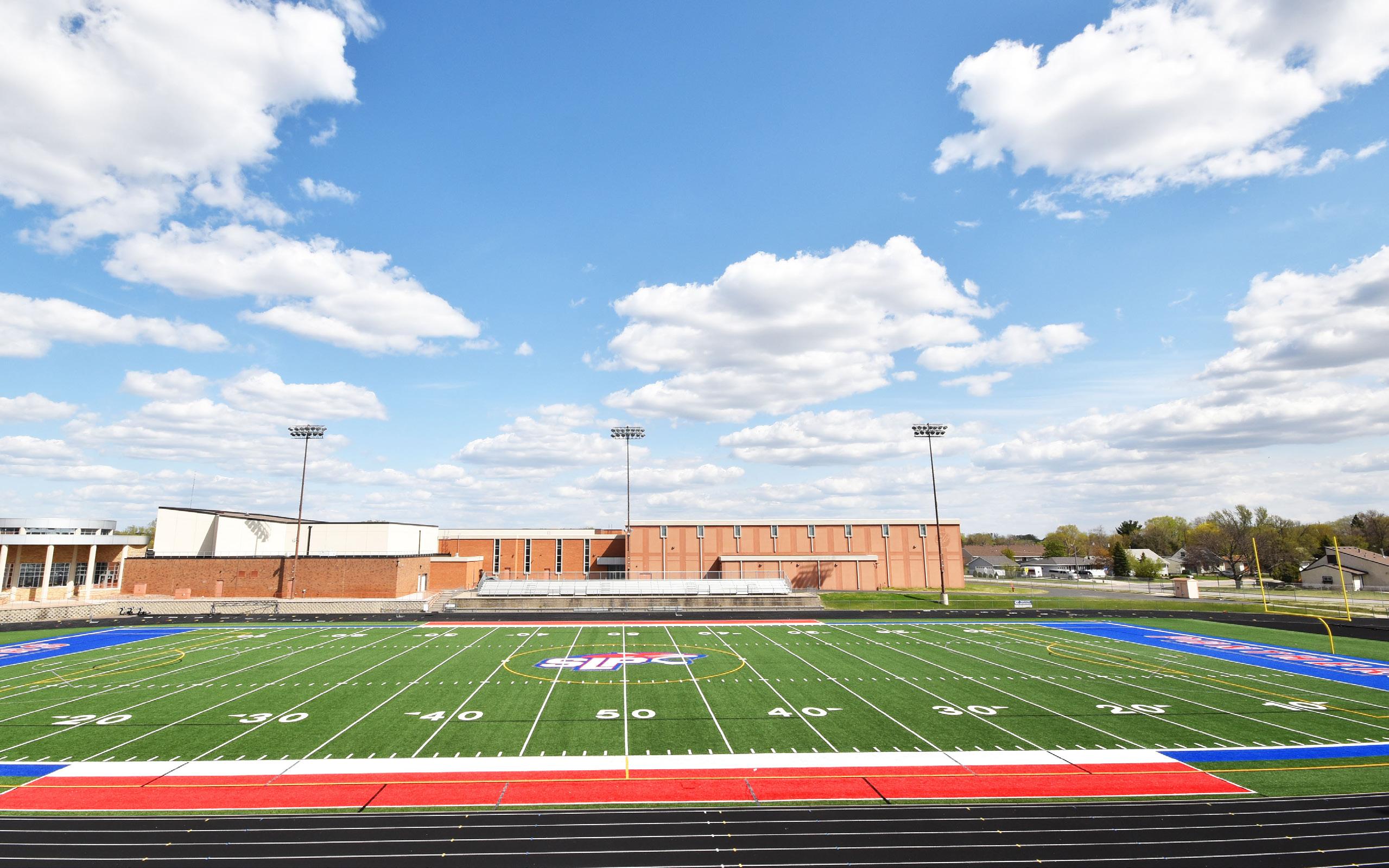
Spring Lake Park High School 1100 81st Avenue NE Spring Lake Park, Minnesota 55432 Phone: 763-600-5100 SpringLakeParkSchools.org/HS 2023-2024 REGISTRATION GUIDE We are #SLPPantherProud!














































































